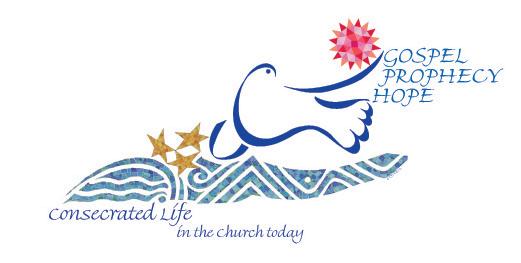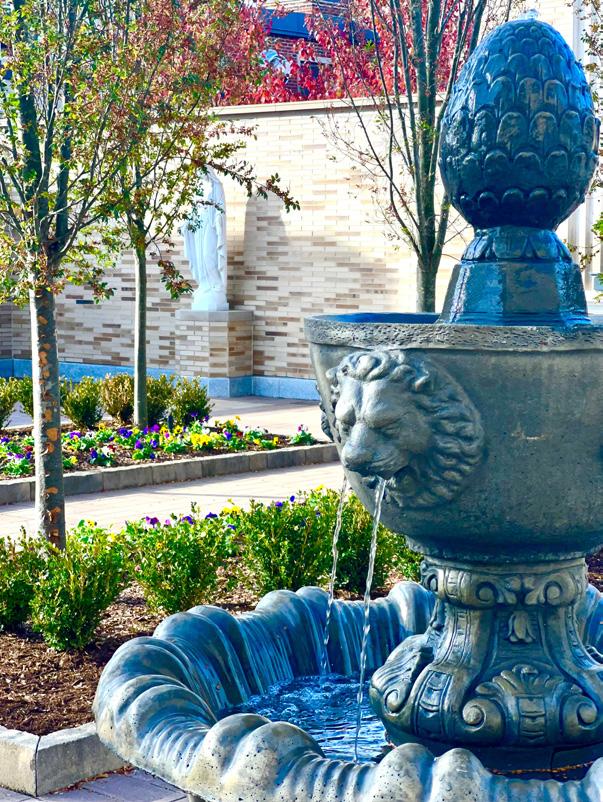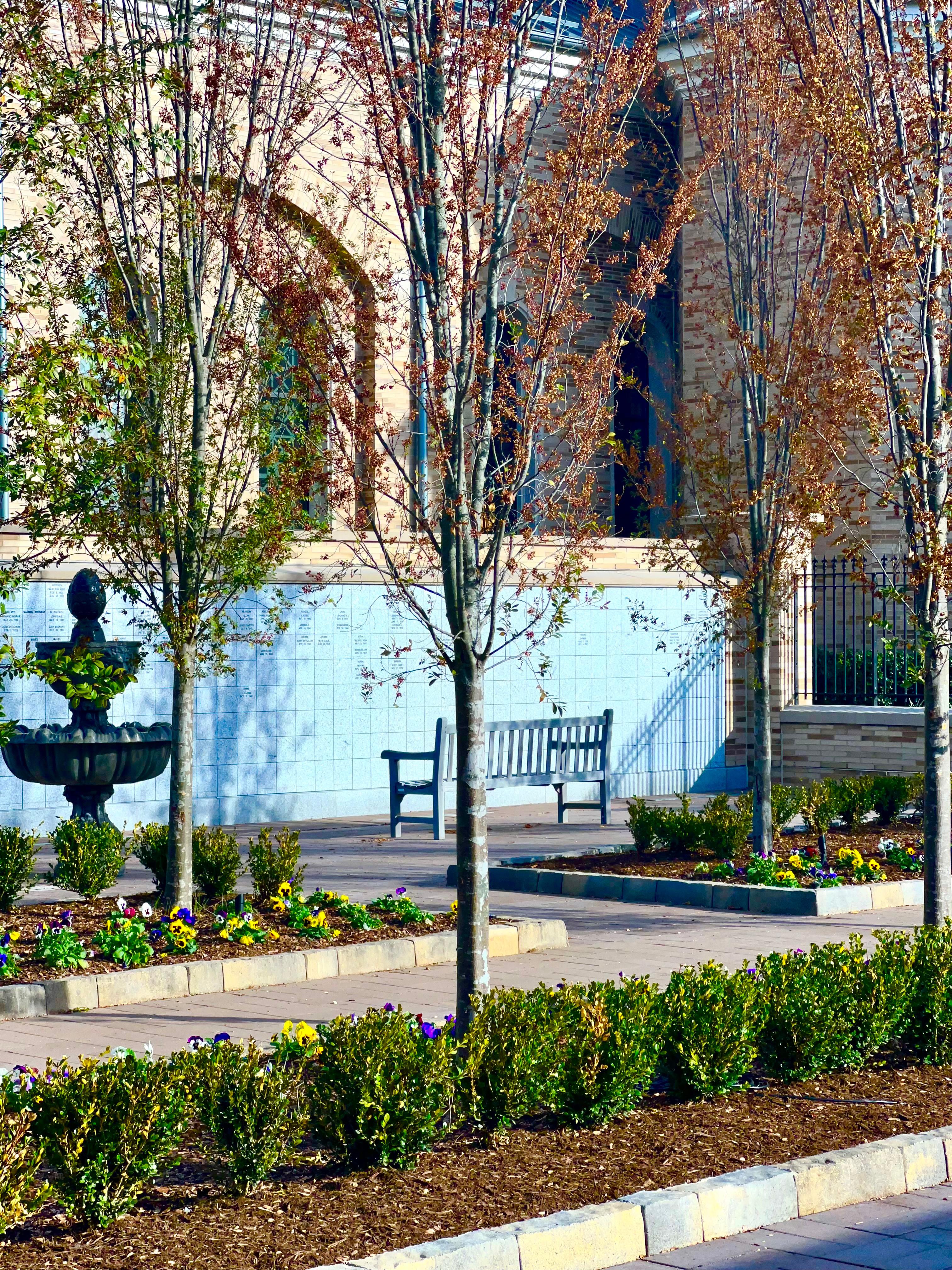Students, faculty report back to diocesan schools
By Bee Goodman
Just as quickly as summer arrived, we are finding autumn leaves falling into place, Tennessee football not-so-subtly creeping back into play, and schools have started across the diocese.
Though summer is a shorter break than we realize, many things have already been planned for the new school year ahead.
Many schools are celebrating anniversaries this academic year. St. Dominic in Kingsport is commemorating 80 years, with a Mass and Memories event set for Saturday, Sept. 27, that begins with a vigil Mass at 5:30 p.m. and will be followed by a reception for memorabilia-viewing and tour of the school.
Notre Dame High School in Chattanooga celebrates 150 years in 2026, while St. Mary in Johnson City celebrates 115 years, Sacred Heart Cathedral School (and parish) 70 years, St. Mary in Oak Ridge its 75th jubilee, and St. Jude of Chattanooga 60 years.
New leaders
In addition to the celebrations, some
Schools continued on page A12
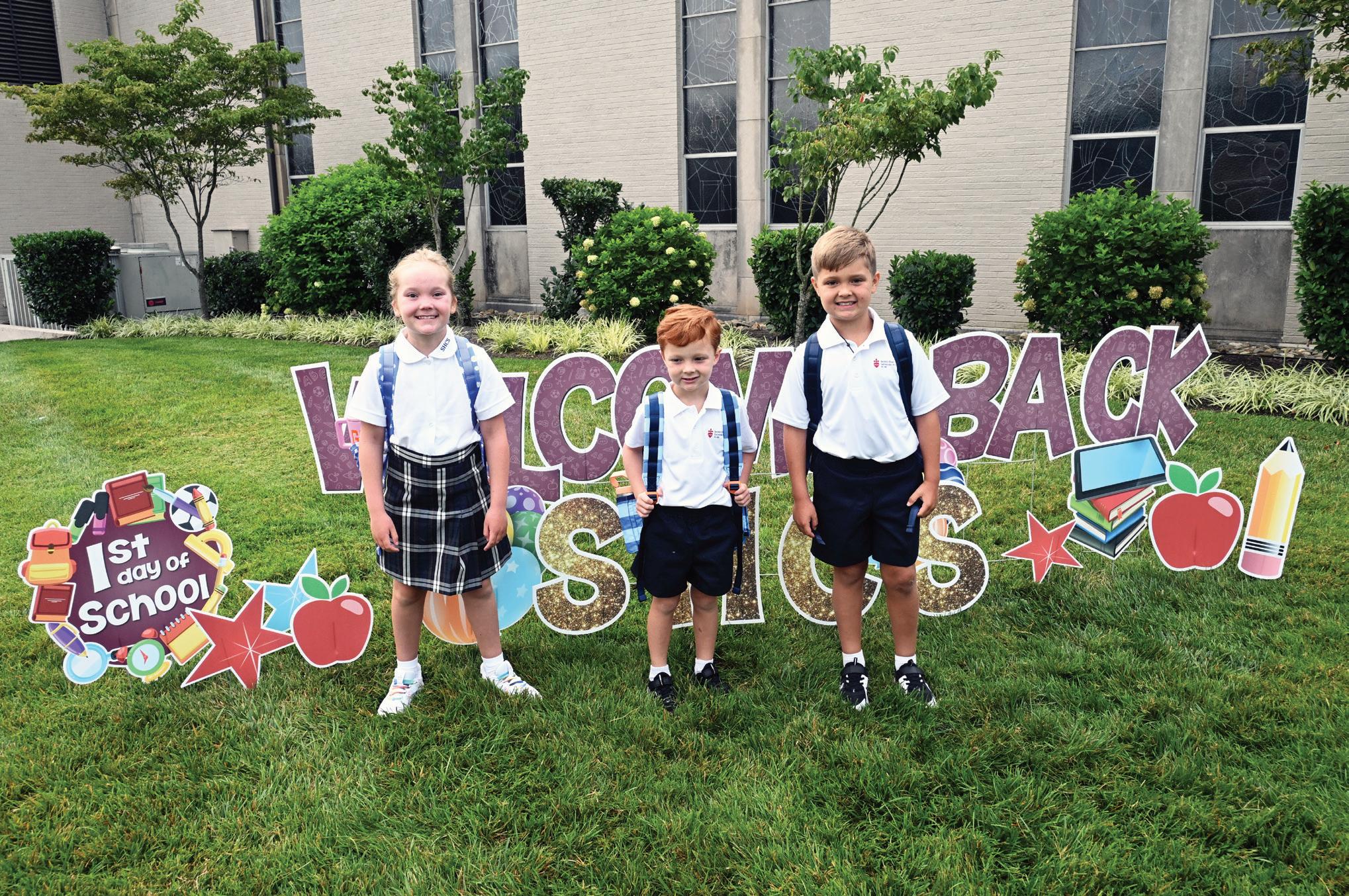
Welcome back Thursday, Aug. 7, marked the first day of school for the 2025-26 academic year as nearly 3,600 students fill classrooms around the Diocese of Knoxville, which is an increase of more than 100 students from 2024-25, according to the diocese's Office of Schools.
A dress that still hangs in her closet
Notre Dame High School hosts belated prom for class of 2020
By Bee Goodman
Take a moment to remember what the final months of high school felt like. There was a daily rush of excitement, anxiety for what the future held, and celebrations like prom and graduation that were right around the corner.
However, in 2020, Notre Dame High School in Chattanooga had to close its doors due to the COVID-19 pandemic just like nearly every school in the country.
For the class of 2020, this meant a delayed walk across the stage, no prom, and altered final goodbyes for many.
Five years later, on Friday, July 18, the school reunited for its annual alumni weekend. This year’s weekend held a unique sentiment for the class of 2020. To give the special moment to the seniors who missed out, the school decided to host the class’ prom five years post-graduation. The theme was fitting, “Better Late

Than Never,” and the class couldn’t have agreed more.
Domenic Mariani is part of the 2020 class, but he also returned to his alma mater as the theology and social studies instructor. As a member of the school faculty, Mr. Mariani has had an uncommon point of view when seeing seniors prepare for their final walk down the halls of Notre Dame.
As happy as he was to see recent seniors complete their classes, he admits it is bittersweet to see these students get to have such a special experience, which feels almost like a rite of passage that he had to miss.
“I’ve seen all the traditions and things that you do in your senior year, and I kind of look back on it and it's like, wow, I guess I missed out on a whole lot that I never really realized.”
The prom, held in Notre Dame’s atrium, featured green and white decorations that were spread among
Prom continued on page A18
School choice is now law of the land in Tennessee
By Bill Brewer
Diocese of Knoxville schools are feeling the impact of state-funded, school-choice scholarships, which are affecting all 10 campuses from Chattanooga to the Tri-Cities.
Diocesan schools, for the first time, are participating in a program that allows families to choose
where their children attend school, and this month those schools began seeing the Tennessee Education Freedom Act in action. The new law creates 20,000 schoolchoice scholarships, half of which are awarded to families based on income and half of which are unrestricted.
Since classes began earlier this month, Diocese of Knoxville school
leaders have been assessing the levels at which the new scholarships will make a difference on school budgets and enrollment.
When the General Assembly passed the Education Freedom Act in January, and Gov. Bill Lee signed the measure into law on Feb. 12, scholarships valued at $7,295 each were made available to students. The scholarships are being used at
state-approved private schools beginning with the 2025-26 academic year. No diocesan school has seen a more dramatic effect from the scholarships, commonly called vouchers, than St. Joseph in Knoxville.
“More than 50 percent of our kids received scholarships. We far Choice continued on page A14
A ‘huge encouragement’
Naming Cardinal Newman a Church doctor is welcome news for British Catholics
By Jonathan Luxmoore OSV News
British Catholics welcomed a papal decision to elevate St. John Henry Newman, a former Protestant and Oxford University chaplain, to the historic status of doctor of the universal Church.
“This request has been before the Holy See for some time, having received declarations of support from many different parts of the world,” said Cardinal Vincent Nichols of Westminster, president of the Bishops’ Conference of England and Wales.
It is “of huge encouragement to all who appreciate not only his great learning but also his heroic sanctity in following the call of God in his journey of faith,” he said.
The cardinal was reacting to the July 31 confirmation by the Vatican’s Dicastery for Saints’ Causes that Pope Leo XIV had accepted an “affirmative opinion” by cardinals and bishops that the Church’s 38th title of doctor of the Church should be conferred on St. John Henry Newman (1801-1890).
In a statement, Cardinal Nichols said he was “delighted and thrilled” by the move, which would bring “great joy to all who strive to follow Christ to-
day,” adding that it was “of particular importance” that the move also was supported by bishops from the Anglican Church of England.
The saint was an Anglican who came into full communion with the Catholic Church, became a cardinal, and is known as the most influential English-speaking Catholic theologian of the 19th century.
Britain’s Oxford-based Cardinal Timothy Radcliffe also welcomed the “excellent news,” telling OSV News that Cardinal Newman’s thought had been a key influence at the Church’s 1962-65 Second Vatican Council, helping Catholics “understand how the Church’s teaching on the mystery of God unfolds in history.”
Meanwhile, a prominent biographer told OSV News that Cardinal Newman had sought to “lead people back to the sources of Christian revelation,” and had bequeathed key Catholic teachings on ecclesiology, ecumenism, conscience rights, and the role of laypeople, which anticipated synodality and remained important for English-speaking countries.
“In pioneering Vatican II ideas, he provided guidance for how today’s Church seeks to renew itself,” said Monsignor Roderick Strange, rector of London’s Mater Ecclesiae College, who also edited
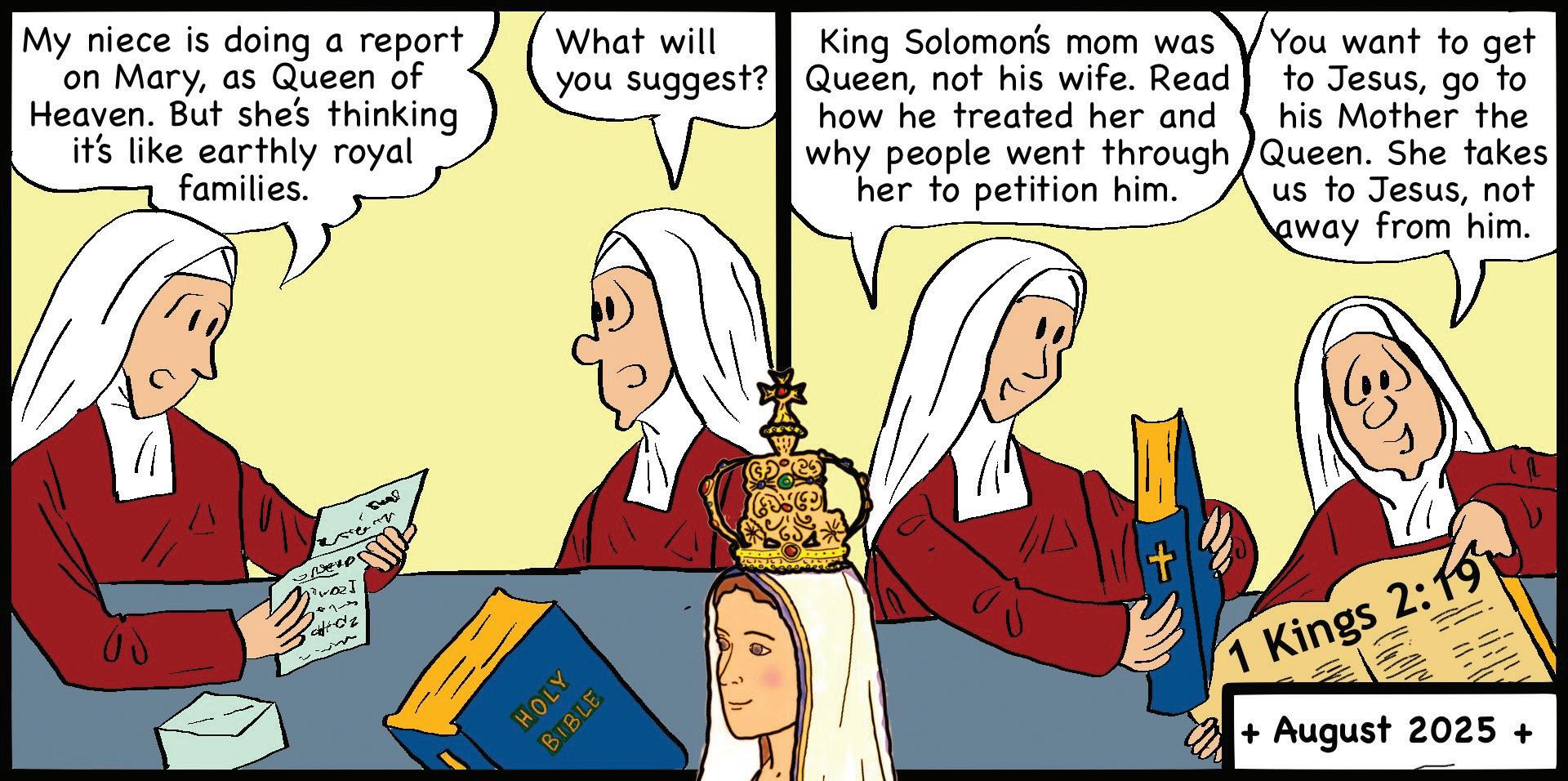
The Handmaids of the Precious Blood this year celebrate the 78th year since their founding in 1947; more than three-quarters of a century of prayer and sacrifice for priests. To receive weekly cartoons and short reflections and news from the Handmaids of the Precious Blood, visit their website, nunsforpriests.org, and sign up for the FIAT newsletter.
An August prayer intention for mutual coexistence
“Let us pray that societies where coexistence seems more difficult might not succumb to the temptation of confrontation for ethnic, political, religious, or ideological reasons.”
Pope Leo XIV




How to sign up and qualify for Diocese of Knoxville’s safe-environment program
The Diocese of Knoxville has implemented the CMG Connect platform to administer the Safe Environment Program, which replaces the former Safe Environment Program (VIRTUS “Protecting God’s Children”).
CMG Connect is a web-based platform that will assist in ensuring that all employees and volunteers who are in a position of trust with children and vulnerable adults within Diocese of Knoxville schools and parishes are trained to recognize behavior patterns of potential abusers and provide pro-active measures for preventing abuse in any context.
“Safe Haven-It’s Up to You” is a three-part video that provides vignettes of real-life situations to educate the viewer about methods of grooming, desensitization, bullying, and neglect, all of which can lead to abuse.
Each part of the video is immediately followed by a brief questionnaire to further develop understanding.
Education is a key

element of the Safe Environment Program
All clergy, employees, contracted school personnel, volunteers, members of groups and organizations over the age of 18 who work, volunteer, or participate in any capacity are required to complete the diocesan Safe Environment training and a criminal-background check before they can begin employment, volunteer, or participate with ministries, groups, and organizations affiliated with the Diocese of Knoxville.
In addition, the mandatory renewal training must be completed every five years and a new background check submitted before the five-year expiration of prior training.
The Diocese of Knoxville Safe Environment compliance training and renewal training is a condition of employment and for volunteer ministry in the Diocese of Knoxville.
The CMG Connect
platform contains all three elements of the Diocese of Knoxville’s Safe Environment Program: n Annual review of the Diocese of Knoxville’s Policy and Procedures Relating to Sexual Misconduct; n CMG Connect Safe Haven training program to be completed every five years; n Criminal background check to be completed every five years.
In compliance with the Diocese of Knoxville’s Safe Environment Program, all affiliates require that volunteers and employees complete the requirements prior to working and/or volunteering in a parish, school, or through Catholic Charities of East Tennessee and/ or St. Mary’s Legacy Clinic Go to https:// dioknox.org/safeenvironment on the Diocese of Knoxville website for more information ■


TThe call of God
We are asked to nurture gentle servants of the Gospel
he Second Vatican Council speaks of conscience as the “most secret core” and “sanctuary” of the person, where we are alone with God. There the “voice of God speaks deep within.”
St. John Henry Newman, recently declared a doctor of the Church by Pope Leo, noted that “God has created me to do Him some definite service. He has committed some work to me which he has not committed to another. I have my mission…I am a link in a chain, a bond of connection between persons….”
This call of God, the purpose for which God created each of us, is our “vocation” in life. At the most universal level, God created each person in the Divine Image and Likeness from the clay of the earth and breathed into our nostrils the breath of life. Our very existence is meant to be a response to this free love of God; our most universal purpose is to know, love, and serve our Creator in this life, and so forever love and praise God for all eternity.
For all baptized Christians, our call is to follow Christ, to be His disciples, and to grow in holiness and goodness, to live and proclaim to all the goodness of God in our regard.
This fall, we embark on a new strategic plan for the Diocese of Knoxville. One of my deepest hopes is for each member of our Catholic community here in East Tennessee to discover anew from the interior depths of our own hearts God’s continued call to us.
God’s call comes to each of us very intimately and uniquely. The varieties of ministry in the Church and of living our vocations, including the ordained priesthood, diaconate, and the sacrament of marriage, are privileged calls from God that serve the good of the whole Church.
Part of our future is enabling young people to hear the voice of God deep within, to discern

what God is inviting us to do, and giving us the grace to say yes.
We have in our diocese a beautiful variety of consecrated religious who are living out their vocations in our midst. We have one of the largest numbers of deacons per Catholic in the world, and our deacons serve in many wonderful ways in our parishes and diocese. We have a growing number of seminarians and those discerning vocations.
We have a beautiful and gifted variety of priests serving in East Tennessee. Large num -
Brave new classroom
Catholic schools nationwide are integrating
By Kimberley Heatherington OSV News
Reading, writing, and arith -
metic and AI.
The modern educational toolkit, of both teachers and students, now includes the use of artificial intelligence. Experts and teachers from coast to coast told OSV News that AI is poised to transform Catholic education.
“In the Catholic school space, where we’re at right now is trying to build AI literacy among our teachers, and our students, and our parents,” shared Father Nate Wills, a priest of the Congregation of the Holy Cross and director of Higher-Powered Learning, an initiative of the University of Notre Dame’s Alliance for Catholic Education.
Professional development for teachers introducing them to AI tools and their use is typically a critical first step.
“I think it’s really important for teachers to know what’s out there so that they both empower their students and transform their assessments,” Father Wills said. “If a teacher was completely ignorant of the existence of calculators in the 1970s, that would just be silly, right?”
With that paradox firmly in mind, Higher-Powered Learning has hosted user-friendly seminars focusing on AI in the classroom, teacher training, AI policies and guidelines, and more. The initiative’s website also features a wealth of resources and guidance.
Still, it can all perhaps seem a bit overwhelming. “This feels,” Father Wills acknowledged, “like a quantum leap for a lot of people.”
RAND Corp. announced in April 2024 that as of fall 2023, 18 percent of K-12 teachers reported using AI for teaching and another 15 percent have tried AI at least once.
A place to start is the articulation of an AI policy whether for students, employees, or in
bers of people have heard the call to join our Catholic Church through the Order of the Christian Initiation of Adults in recent years.
God still calls, still invites. Every parish and every Catholic can provide an opportunity and a place for our young people to discover God’s own call in their lives.
Many years ago, I read a beautiful book by Father Herbert Alphonso, SJ, Discovering Your Personal Vocation , in which he highlighted the insight that every single vocation has a personal or unique identity, much like our fingerprints. No two priests live out the gift of priesthood in an identical way, nor any two married couples.
In prayer, the phrase “an ardent yet gentle servant of the Gospel” came to me, and I realized as I reflected that this was the way God has chosen for me to live out my priesthood. (I discovered years later that the phrase came from the “Mass for Vocations to Holy Orders” in the old sacramentary, and that Bishop James D. Niedergeses used to pray it with Masses for our seminarians.)
This year, I would like to invite every parish to be about the work of nurturing vocations, and especially the ability of young people to hear God’s call. Encourage young people to listen to the voice of God within, provide reflective opportunities (retreats and days of reflection, adoration, or special Masses) that enable people to hear God’s call.
And most especially, I invite each member of our Catholic community to grow in living an intentional life of deeply personal prayer where we continue to listen for the voice of God, who speaks deep within the sanctuary of our own hearts.
My prayer is that we receive the grace of God to respond more and more generously to His unfolding call in our lives! ■
AI into teaching plans

the classroom. Higher-Powered Learning offers adaptable policy templates but also helps dioceses tailor them to their own needs and strategy.
“One of the most important things about a document like this is, it’s living,” said Brad Snyder, associate superintendent of Educational Programs for Catholic Schools in the Diocese of Orange in California. “Because AI is doing nothing if not changing constantly. As a diocese, we’ve been meeting for about a year and a half in committees to create a guidance document for our parishes also. So, I think we’ve been trying to get ahead of the wave.”
Mr. Snyder sees a parallel with another major technological shift: the advent of the World Wide Web in the early 1990s.
“I would say it’s almost akin to when we first started using the Internet,” he said. “When we searched for things before, you’d break out the card catalog, right? We don’t do that anymore. And I think AI is going to propel us forward in a similar manner.”
And rapidly, too.
“It’s just taking off,” Mr. Snyder said. “And the next couple years are going to be really transformational in what it can do and therefore, we have to be informed on how we're going to use it.”
Educators are keenly aware that AI has the potential to be not just an asset, but a substitute the oftheard suspicion that students will use it to generate an assignment instead of doing it themselves.
“One of the things we really try to work with with our teachers and our principals is you need to monitor, but you need to make sure you mentor,” Mr. Snyder said. “We want to make sure we’re supporting students using it correctly, and in a way that benefits them.”
“Here’s the issue: Students are going to use AI,” he continued. “You might as well be able to show them how to use it in a manner that’s going to support them and not hurt them. I think that’s critical.”
Nor is AI meant to “replace” anything, Mr. Snyder said.
“Catholic education is what? It’s a community, right? It’s relationship building. It’s the whole child,” he emphasized. “Technology can’t replace that and we don’t want it to. But if it can help make me more effective, reach my students at their level more efficiently, and move them forward in their skill development that’s the mentorship of using AI.” So, what can AI do for teachers and students?
“Like Pope Leo said, this is a sea change,” declared Steve Tortorello, director of Partnerships and Special Projects for Catholic Schools in the Archdiocese of Chicago. Echoing Mr. Snyder, he added, “This is not a new app. This is not a new program. This is like when the Internet came out that’s the level of change that this is.”
As to its potential, “I talk about how AI can be both the most supercharged teacher’s assistant you could ever imagine,” explained Mr. Tortorello, “and a thought partner, like the teacher across the hall.”
He gave a practical example.
“Say you’re working with seventh-graders on picking out adjectives in a sentence. And you’ve already done the exercise in the book and you think, ‘Wow, my kids need more practice.’ Well, guess what?” Mr. Tortorello asked. “AI can make you more practice materials,” and here Mr. Tortorello snapped his fingers “that quickly.”
He added, “And it can make it on whatever topic your kids are interested in. Do they love Taylor Swift and Minecraft? Well, now you’ve just made 10 more practice sentences on Taylor Swift and Minecraft, and they’re doing that while they’re figuring out learning adjectives.”
Not only are students more engaged teachers save time.
“If I was teaching seventhgrade English, which I’ve done before, and I had to make that
One Bread One Cup
Liturgical leadership conference is fulfilling a need for this
By Maggie Parsons
More than 275 participants were excited and eager to return to the annual One Bread One Cup summer liturgical leadership conference at St. Meinrad Archabbey in St. Meinrad, Ind., calling all youth and adults from around the country to learn the importance of their role in the liturgies at the place known for its perfect peace.
One Bread One Cup is a fiveday conference with three weeks spread out over the course of the summer. Youth and adults attending the conference are led to work, play, and pray as they follow the rule of St. Benedict just as the monks do who live there.
“My first impression was that it sounded boring,” Scotty Biggs, current director of One Bread One Cup, said as he was asked about his first encounter with OBOC.
Mr. Biggs first attended the conference as a youth minister, then as a catechist, and then became the director of the conference.
“But as soon as I stepped out, I immediately fell in love with the program,” Mr. Biggs noted as he talked about how his view of the program quickly changed as soon as he stepped on St. Meinrad grounds.
“It helps everyone, teenager and adult alike, to see how prayer and a consistent relationship and friendship with God can be an easy part of your day,” said Steve Angrisano, who is a widely known Christian musician and participant of One Bread One Cup for the past 11 years.
Mr. Angrisano, who is the cur-

rent emcee for the conference, discussed how the youth and adults at One Bread One Cup learn that their relationship with God in their daily life does not have to be complicated.
Each aspect of the One Bread One Cup conference is focused on having the community united by Christ. The community starts by praying the Liturgy of the Hours morning, evening, and night as well as celebrating Mass together every day. The participants are reminded how they should be sharing that closeness with the Lord with their brothers and sisters, not because it is an obligation but because they want to strive for holiness.
Not only is it a community of Christ in prayer, but it’s also a community of Christ in play. Whether it is the interns versus the participants in an ultimate
Immaculate Conception parishioners step
up to serve seniors in need in downtown Knoxville
By Allison DiGennaro
It is easy to delegate charity to others, yet the calling of every Christian is to become personally involved.”
These are convicting words from Pope Francis, written on June 13, 2023, on the memorial of St. Anthony of Padua, patron of the poor. Pope Francis continued to punch us in the gut with the truth as he stated, “We are called to acknowledge every poor person and every form of poverty, abandoning the indifference and the banal excuses we make to protect our illusory well-being.” Ouch.
But how are we to actually do this?
Since 2019, the Diocese of Knoxville has helped parishes acknowledge the poor in their midst and get personally involved in caring for them through the Pope Francis Charitable Trust Fund. Fittingly named, this fund awards matching grants to parishes that start or continue a program that gets parishioners out of the pews to “go in peace to love and serve the Lord.”
Immaculate Conception (IC) Parish in downtown Knoxville has received thousands of dollars from this fund over the past three years to support and grow its ministry to Summit Towers, a high-rise, lowincome apartment building just a block west of the parish.
Most residents of “the Towers” live with physical and/or mental disabilities and are over the age of 62. The apartments are 500 square feet and have one bedroom, one bathroom, a tiny kitchen, and typically house a single person. You may have seen Summit Towers on the news in the past because of reports of broken elevators, pest infestations, and inferior living conditions.
Frisbee game, or dancing in the crazy hat dance until they’re covered in sweat and their feet hurt, or they are performing a skit in the variety show. It is centered in the community of Christ, lifting one another up and cheering each other on.
“Since coming to OBOC, I've learned to treat people a lot better in relationships and truly let what the Lord works on my heart each summer take root,” said Hanna Vosburg, a One Bread One Cup college intern and previous participant.
Ms. Vosburg spoke about how OBOC taught her the importance of relationships and community, not only while she is at the conference but also to have that take root in her heart and let the Lord use that for her in other aspects of her life.
The focus of the conference is
word, sacrament, and mission, and how God calls each one to open their hearts and be open to the plan He has for everyone, not only in individual lives but also in the Church’s liturgies.
“We feel like we wait for someone to grow up before they are a part of the Mass at our parish, and I think that’s a very big mistake,” said Mr. Angrisano in raising awareness of how youth in the Church believe they must grow up and gain knowledge before being allowed to participate in liturgies.
He also believes it’s a mistake to believe that because the youth are the Church, they are who is going to lead the future.
The youth participants are all assigned to Liturgical Formation Session groups during their time at St. Meinrad. The groups vary with different roles in the liturgies. Some include proclamation of the Word, eucharistic minister, prayer in the life of the Body of Christ, and cantor development. All are taught by catechists and assisted by interns who teach and are an example for the participants, who learn the importance of their roles in the liturgies.
“My favorite aspect is watching the transition; the day-one liturgies are all done by the interns. And then the next day it’s the youth, and it’s a little bumpy, but by the time we get to the end of the conference, which includes the day-five Mass, the youth are in leadership roles,” Mr. Biggs said, describing the joy of seeing how the youth are shown by example and then take the initiative OBOC continued on page A17
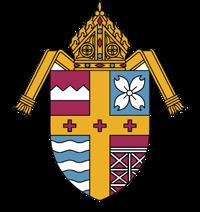
Clearly, the Towers is the “neighbor” for the people of IC to love and serve!
Once a month, the parish prepares a hot lunch complete with dessert (banana pudding is a top favorite) and serves it to residents in their community room on the first floor of the Towers.
The monthly meal is known as “Hope Kitchen,” which started as a partnership with Catholic Charities of East Tennessee in 2021. The parish runs it independently now, but the name stuck because it matches the mission of bringing a meal with a side of hope.
Before lunch, volunteers from IC lead a rousing game of bingo with both practical (deodorant) and fun (2 liters of Coke) prizes. Summit Towers has a food pantry for residents to visit twice a month, and the parish helps stock it with muchneeded items like toilet paper, peanut butter, and Vienna sausages.
Another great need is when a person first moves into an apartment. Some people are moving in from off the streets, so they are starting with practically nothing.
IC provides a plastic tub full of essentials for a clean start like a shower curtain, soap, towels, laundry detergent and a welcome note from the parish. With these hygiene and cleaning items, this “welcome kit” promotes dignity and self-respect in the person receiving them. It sounds simple a game, a meal, a towel. And it is simple. And it works. The key is consistency.
IC has been showing up for residents on the last Tuesday of the month since April 2021. Despite management and staff frequently changing at Summit Towers, and unstable personal situations causing challenges for residents, the Church

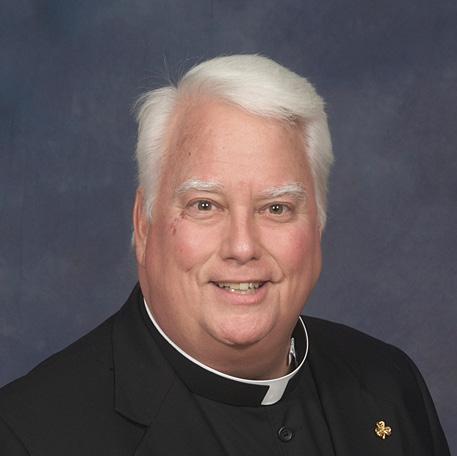


Bill Dunn works within the system to give students education freedom School choice? Why not?
By Bill Brewer
Bill Dunn was convinced that school choice was right for Tennessee education in the 1980s when he was a 4-H representative just out of college and working in Grainger County.
What began as an idea he believed in morphed into a passion when he entered public service as a state legislator in the 1990s.
Now, after more than 30 years serving the state of Tennessee and campaigning for universal school choice, Mr. Dunn gets to see the program he so fervently promoted for decades take effect this month as Tennessee parents and students use Tennessee Education Freedom scholarships (TEFS) for the first time.
With students now in class for the 2025-26 academic year, 20,000 of them are using the new scholarships to attend the school of their choice.
Under the Tennessee Education Freedom Act, tax-exempt education scholarships of $7,295 each were made available in the 2025-26 school year. Half of the scholarships go to students living in households with an annual income less than 300 percent of the level to qualify for the federal free and reduced-price lunch program ($173,160 for a family of four). The remaining 10,000 scholarships were made available to students across the state, regardless of income or ZIP code.
The state General Assembly passed the act during a special session in January, and Gov. Bill Lee signed the bill into law on Feb. 12. The state then had three months to develop a program to award the scholarships based on

specific criteria, such as U.S. citizenship and Tennessee residency.
With the number of state-funded scholarships set by law, it was up to a team assembled by the governor’s office and the state Department of Education to implement the program and award the scholarships.
As a senior adviser to Gov. Lee, Mr. Dunn was instrumental in the process to move school choice from a “good idea” to law, and then to a workable program that benefits thousands of students and their families. Prior to joining the governor’s staff in 2021, he served 27 years as a state representative, including stints as speaker of the House and speaker pro tempore.
Strong response
Once the Tennessee Education Freedom Act passed the House and Senate and became law, the
School choice legislation approved by Congress
New law will help families gain access to Catholic schools in the United
States
By Bishop David M. O'Connell Diocese of Trenton
Last month, President Donald Trump signed into law the first federal school choice tax credit in our nation’s history.
This new landmark legislation, led by Sens. Ted Cruz, R-Texas, Bill Cassidy, R-La., and Tim Scott, R-S.C., was modeled on the Educational Choice for Children Act (ECCA), which aimed to expand parental choice in education to an estimated 2 million children across the country.
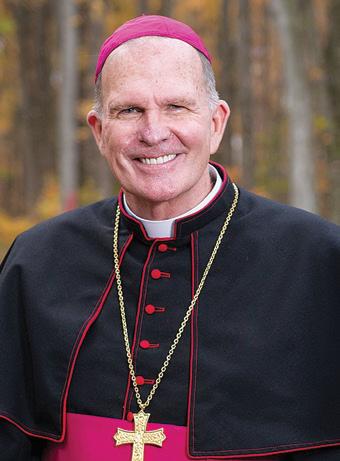
For years, the U.S. Conference of Catholic Bishops has endorsed this bill because it aligns with our Church’s teaching that parents are the first and primary educators of their children and, therefore, have the right to select the best educational environment for them.
Next steps
The groundbreaking new law deserves accolades for its recognition of the rights of parents, but there are significant questions about how it will be implemented at the federal and state levels.
The potential success of this law depends on what happens next. Ensuring that the greatest number (and the neediest) of children can benefit from this opportunity will require vigilance and discernment during the implementation and rulemaking process.
One challenge will be ensuring that states “opt in” to the new federal opportunity so that children in each
state jumped into action to build a framework for the scholarship process. As Gov. Lee signed the act into law at the Tennessee State Capitol building, he was surrounded by students from St. Edward School, St. Henry School, Holy Rosary Academy, and St. Pius X Classical Academy in the Diocese of Nashville.
The Tennessee Department of Education began crafting regulations, hiring contractors, and creating an application process for implementation during the 2025-26 school year. It was an ambitious timeline. The scholarships were granted on a first-come, first-served basis via a registration site that parents could access from their home computer.
Mr. Dunn was confident that interest in the scholarship program by families would be strong, but there was no way to pinpoint demand ahead of time. He and other
members of the TEFS team had to focus on putting the scholarship program in place.
“There was a real quick turnaround because the bill passed and we had to be ready to go for this school year. There were a lot of things that had to be done; certain rules had to be passed by the state board (of education), designing the application for people to go online, how you made sure they were state residents, that they were eligible, etc. There was a whole lot of work behind the scenes once it was passed,” Mr. Dunn said.
In addition to response, other vital areas the team was concerned with were an effective communications effort in advance to get the word out statewide about the program, an accessible and understandable application form that was comprehensive and ironclad, and a computer system for making the applications available and reviewable that wouldn’t crash, Mr. Dunn shared.
“There were a lot of decisions that had to be made. First of all, we had to look at the law and what did it say. It says certain things like you have to be a citizen of the United States. In the application process, we had to make determinations about how we are going to look at that. What kind of identification does a parent need to have? Do you have to have a birth certificate? You take the law and then you actually have to implement it,” Mr. Dunn pointed out.
“We also have the state school board, which passes rules. They take what we want to do, and then they flesh it out. They look


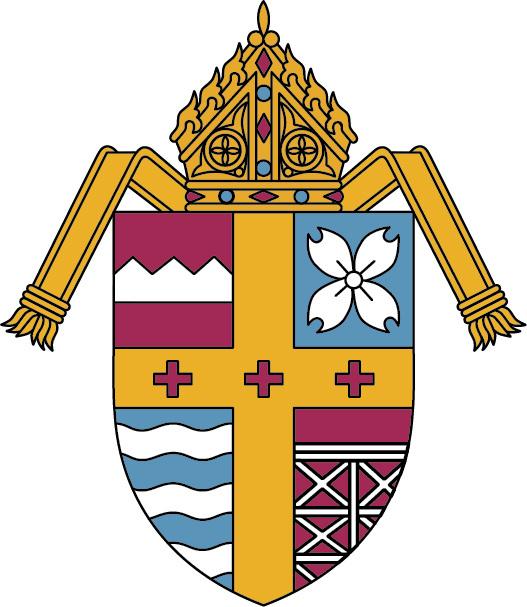




$23,263,000

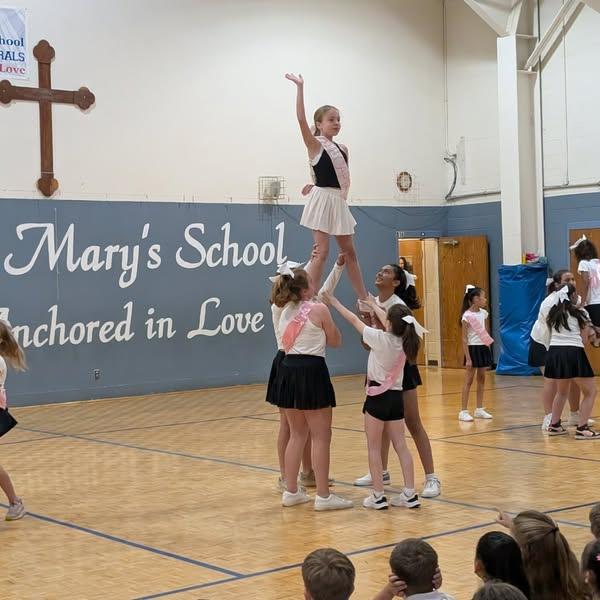



Take a Tour Never too late to apply!

in our schools we do faith. family. Jesus. service. friendship. stewardship. prayer. in our schools we do faith. family. Jesus. service. friendship. stewardship. prayer.
St. Jude: Kathie Preston prestonk@mysjs.com
SMJC: Tanya Chavez admissions@stmarysjc.org
St. Dominic: Beth Barnette bethbarnette@stdomschool.com
St. Joseph: Howie Sompayrac hsompayrac@sjsknox.org
Sacred Heart Cathedral School: Emily Widmer ewidmer@shcknox.org
Notre Dame High School: Patrick Healy healyp@myndhs365.com
Knoxville Catholic: Joni Punch joni.punch@knoxvillecatholic.com
St. John Neumann: Mary Marlowe mmarlowe@sjncs-knox.org
St. Mary’s Oak Ridge: Hannah McFadden hmcfadden@stmarysoakridge.org
Our Lady of Perpetual Help: Kate Roden kroden@myolph.com
Back to School Message
Called and Committed to Serve:
The State of our Diocesan Catholic Schools
By George Valadie, Interim Superintendent of Schools
It was January 6, 1876. A Thursday. Nashville to Chattanooga. Party of four. It’s easy to imagine that journey – though only 130 miles – took exceedingly longer than today’s typical sprint down I-24.
But that’s when it all began in our area. That’s the date Catholic schools in East Tennessee were born. That trip was the answer to a prayer by a Chattanooga pastor who had reached out to the Nashville Dominican Sisters of St. Cecelia, an order of only 20 Sisters that had been formed barely 15 years before. He had asked if they would send some of their congregation to start a school at Sts. Peter and Paul Church.
Thus it was on that January day when four Sisters arrived to begin planning for what was then to be called Notre Dame de Lourdes Academy.
Good things catch on. Holy Ghost School (now St. Joseph) followed in 1908, St. Mary (Johnson City) in 1911, Catholic High in 1933. Our Lady of Perpetual Help was next in 1937; St. Dominic in 1945; and St. Mary (Oak Ridge) in 1950. Sacred Heart was begun in 1956; St. Jude in 1960, with St. John Neumann being the most recent addition to the family, beginning in 1997. Add it up – that’s a lot of years and that’s a lot of anniversary parties too. St. Mary’s (Oak Ridge) had its 75th last year. And in this 2025-2026 year alone, Notre Dame will mark its 150th; St. Dominic will have its 80th, Sacred Heart its 70th and St. Jude its 65th.
I don't know if Father or the Sisters or the founders of each of our other diocesan schools could truly envision we'd still be here this many years later. Could they actually have imagined grandparents and grandchildren walking the same hallways and using the same lockers? Is there any way they could have known the legacy they were launching?
It’s nice to have a long history. It’s more important to have a long future.
As “State of the Union” messages go, this one won’t attract much attention. Still in a very real way, this most certainly is a Union – a collection of Catholics and other faiths; some with resources, some without; all colors, creeds, and races; legacy students and first-timers; smart and not; musical and not; outgoing and not. You get the idea.
All trying to get ahead; all trying to get to heaven.
These two pages are offered as a snapshot of life in our diocesan schools. If you’re in any way involved with one or more of them, I don’t have to tell you these hardly scratch the surface of what life is actually like.
Because it’s just plain wild there! But it’s that good kind of wild! Busy, active, loud. Reading, writing, genuflecting. Joyful, curious, reflective. Celebrating, cheering, questioning. Lots of questioning. And we wouldn’t want it any other way.
When I think about the earliest of those 878 years, my brain goes to “Little House on the Prairie.” Someone in Walnut Grove had a vision, gave it a voice and then … They went wild too. Logging and sawing, framing and building. All coming together, combining energies and efforts because they knew their kids needed better.
Sounds a lot like our history. Everybody knew everybody. Everybody took care of everybody. Everybody played a part and everybody felt like family. FAMILY - It might be the single most used – and possibly the best – word to describe what it feels like to be part of our Catholic schools.
We offer a glimpse of our present. But what about our future? Next year? Or way on down the road, say another 150 years from now? While the light-speed of change surrounds us, our mission remains the same. And I believe with all my heart we will be here in some form or fashion for the young people who need us.
And we’ll still be a “union,” still in praise of God, still in service to man, still helping young people grow into the person their Maker hoped they might become.
Our vision came from Him. He gave it a voice. And then He let us go wild with imagination. We shaped, we stretched, we stumbled, we soared — we celebrate it all today.
Thank you for all you do and have done for the young people in our care. We pray for you every day. And ask you to do the same for us.
Thank you to our leaders, pastors, and chaplains! We pray for a wonderful and fruitful year educating our students and leading them in their walk with Christ!
Valerie Hanks
Rev. David Boettner
Dr. Caroline Carlin
Rev. Arthur Torres
Dr. Josh Overton
Rev. Charlie Burton
Sister Catherine Marie
Rev. Ray Powell
Becky Frye
Rev. Dustin Collins
Bonnie Saleh
Rev. Michael Cummins
Kelly Mechelke
Rev. Mark Schuster
Dickie Sompayrac
Msgr. Pat Garrity
Rev. Randy Stice
Rev. Chris Michelson
Andy Zengel
Rev. Chris Michelson
Eric Schexnaildre
Chaplain – Rev. A.J. Houston
Faithful apprenticeship
Three Echo students begin serving in Diocese of Knoxville
By Katie Harkness
This month the Diocese of Knoxville has welcomed three new Echo apprentices: Katie Harkness, Mallory Louque, and Viviana Morales.
This is the eighth year that the diocese has partnered with the University of Notre Dame McGrath Institute for Church Life to host Echo students.
While Echo does not stand for anything, its name carries theological significance as it comes from the Greek word for katecheo or “catechesis,” which means “to echo into.”
It combines kata (meaning “into”) and ekhein (meaning “to echo”), capturing the essence of passing on faith through resounding proclamation and instruction.
In the New Testament, katecheo appears in contexts that illuminate its connection to the passing on of faith. For instance, in Luke 1:1-4, the Evangelist addresses Theophilus, explaining that this Gospel was written so that readers may know “the certainty of the teachings you have received” (Luke 1:4), using the word katecheo to describe this act of instruction.
Similarly, Acts 18:25 uses the word in order to describe that Apollos was “instructed in the way of the Lord” (Acts 18:25), conveying a formative, oral transmission of the faith.
These passages remind us that catechesis is not simply a transfer of information; rather, it is a personal, transformative echo of the Gospel that resounds from one believer to another, in order to form hearts spiritually and intellectually.
The mission of Echo “is to train the next generation of theologically educated and pastorally creative lay leaders to pass on the beauty and truth of the Catholic faith,” according to the Echo website. Echo was founded in 2004 in response to the growing concerns of individuals, especially young people, leaving the Church and the aging population of parish catechetical leaders.
The program began with 13 parish apprentices in Indiana and Texas. After his long career at William H. Sadlier Inc., Dr. Jerry Baumbach was Echo’s first director.
After his retirement, Colleen Moore became the program director. She led the program’s ex-
extra adjective worksheet, it might take me 45 minutes to come up with different ideas,” Mr. Tortorello said. “Now, I can tell Chat GPT, ‘Make me an adjective worksheet at this reading level’ boom and it does it in 10 seconds.”
Another example Mr. Tortorello cited is AI’s ability to customize, or in educational terms “differentiate,” student materials.
“If I’m teaching fifth-grade reading, and I know in my fifth-grade class I’ve got 20 kids and 10 of them read at fifth-grade level, and five read way above the fifth-grade level, and five read below the fifth-grade level I used to give them one article,” he explained.
“And the quick kids would be done in five minutes. The average kids would take 10 minutes. The kids who struggle might take 20 minutes. They might not comprehend it. Well, now I can rerun that article at three different reading levels,” Mr. Tortorello said. “Every kid can read it at the same time, at the level that best challenges them. This unlocks a ton of things I can do, as far as differentiations. And so, to me, that’s magic.”
There’s still a human element, however.
“You generate something with AI, you refine it with more questioning, and then you as the human edit it to make sure it’s exactly what you want,” he added. “And so now that supercharged teacher’s assistant can help you save countless hours.”
Those hours add up and impact work-life balance.
“It’s not only about efficiency,” Mr. Tortorello said. “It’s about preventing burnout for our teachers.”
On July 8, OpenAI and Microsoft announced the bankrolling of new AI training for teachers. The American Federation of Teachers said it would use the $23 million including $500,000 from the AI start-up Anthropic to create a national training center.
At Union Catholic High School in Scotch Plains, N.J., assistant principal Noreen Andrews who, among her other duties, coordinates the school’s Advanced Placement courses remembers clearly when she realized AI was about to change her world.
In November 2023, Ms. Andrews said, a colleague entered her office to announce that AP College Board student exam essay questions would now be written by AI.
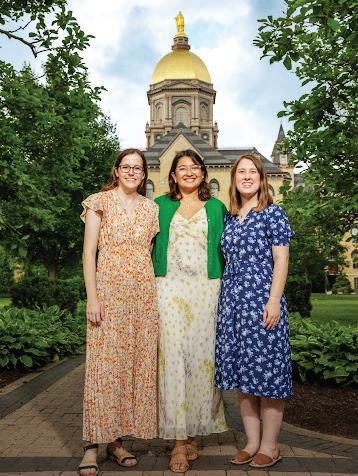
pansion into Catholic schools.
As of June 2025, the program has graduated 367 lay leaders with more than 90 percent remaining in full-time ministry and teachingrelated careers. This past May, Ms. Moore transitioned into her new role as the associate director of the McGrath Institute for Church Life, and Ryan Dainty is the new program director.
Echo is run through the McGrath Institute for Church Life at the University of Notre Dame, partnering with 17 dioceses across the country to strengthen the Church’s mission through formation, study, and service.
Echo apprentices serve either as catechetical leaders in parishes or theology teachers in Catholic schools, engaging in a two-year experience of hands-on ministerial leadership experience, intentional community life, and graduate-level theological study. Alongside their ministerial responsibilities, apprentices pursue a master’s degree in theology and ministry.
“And I'm like, Oh my God, you know, I’m an AP teacher,’” Ms. Andrews recalled. “Does everybody recognize what’s happening? Do you see what’s happening?” She wanted, Ms. Andrews said, “to make sure that we were all understanding what had come into our world, and what was never going to leave us.”
Ms. Andrews quoted a now-favorite maxim: “AI will not replace you. But people using AI will.”
“We’ve talked about it among ourselves as educators and when I’m talking to parents and educating them about what we’re doing with AI in education at our school, that’s one of my first cards,” she said. “It’s mind-boggling because we’re at the beginning of this but yet it’s moving so fast that we’re well past the beginning.”
Union Catholic took things step by step, Ms. Andrews explained, beginning with a robust program of teacher development.
“First it was the teachers then it was mak -
Echo, in collaboration with the University of Notre Dame’s Theology Department and partner dioceses nationwide, remains steadfast in its mission to address the growing challenge of disaffiliation within the Church.
Echo is committed to cultivating a new generation of lay leaders who are equipped to respond creatively and faithfully to the pastoral needs of the Church today.
Echo apprentices in the Diocese of Knoxville
n Katie Harkness
Hello! My name is Katie Harkness, and I am from Fuquay-Varina, N.C. I recently graduated from College of the Holy Cross in May.
I am thrilled to be serving at the cathedral here in the diocese!
I am eager to be able to get to know the community and to be able to share my knowledge and love of theology with others. In my free time I enjoy reading, hiking, and riding four-wheelers.
n Mallory Louque
My name is Mallory Louque. I am from Louisiana and I just graduated with a bachelor’s degree in theology and religious studies with a second major in psychology and a certificate in pastoral ministry.
I will be working in the Diocese of Knoxville Chancery with the Office of Christian Formation. In my free time I like to draw portraits and crochet.
n Viviana Morales
Hey y’all! My name is Viviana Morales, and I’m so excited to be here in the Diocese of Knoxville.
I’m originally from sunny San Diego, and I’m a proud alumna of San Diego State University. #Go Aztecs! I’ll be serving at Immaculate Conception Church, and I truly can’t wait to meet everyone in the parish and wider community.
I’m super adventurous and always up for trying something new, so I’m ready to dive into all the Southern charm, food, hiking, and culture East Tennessee has to offer. Praying for you all always! ■
ing sure that teachers were putting it in the hands of the students and helping them,” she explained. “And now this year is very focused on AI literacy.”
In January, Union Catholic High School secured the Responsible Artificial Intelligence in Learning (RAIL) endorsement through the Middle States Association of Colleges and Schools a recognition of its commitment to promote responsible, ethical, and safe use of AI in education.
RAIL-certified schools are a select group.
“We’re one of 46 schools in the world,” Ms. Andrews proudly shared.
“We’re not about making rules and trying to enforce rules to lock things down but rather to teach our students how to be responsible with their devices, with AI, and with the Internet. That’s our focus,” Ms. Andrews said. “The most important thing we can do as teachers, as educators is to prepare our students to survive in this new world.” ■


Tuesday, October 14 - 6:30PM Tuesday, November 18 -
Tuesday, March 17 - 630PM
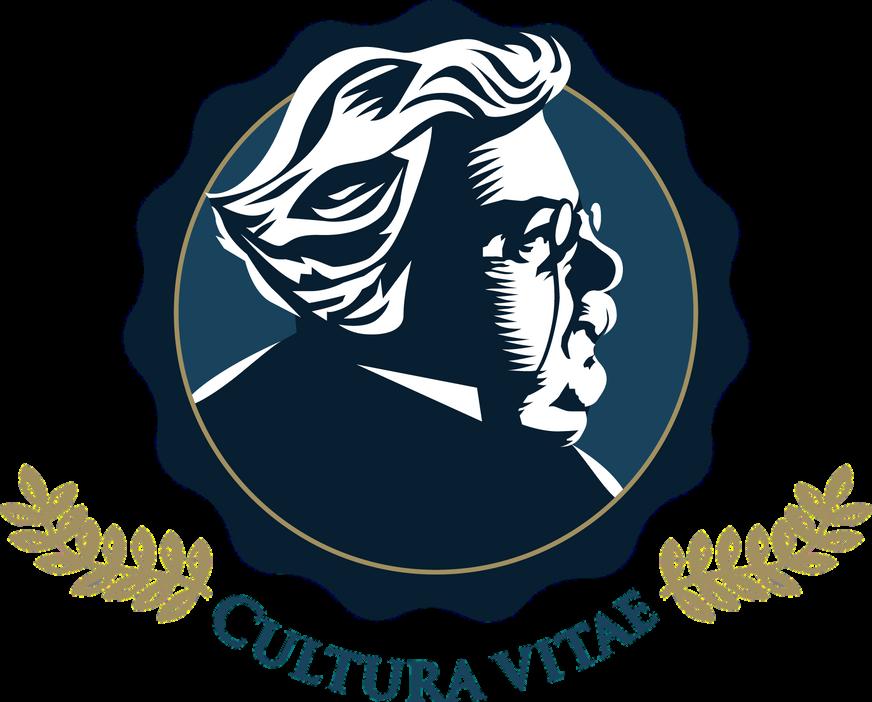




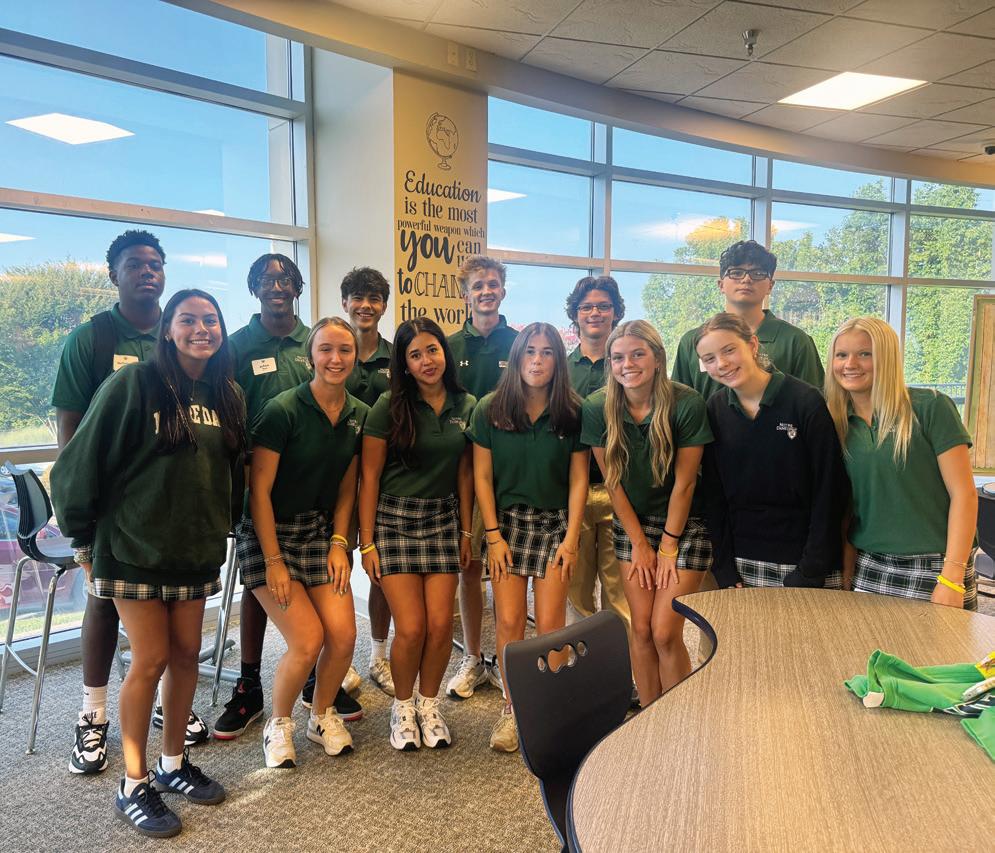
Glances at the first day of school around the Diocese of Knoxville
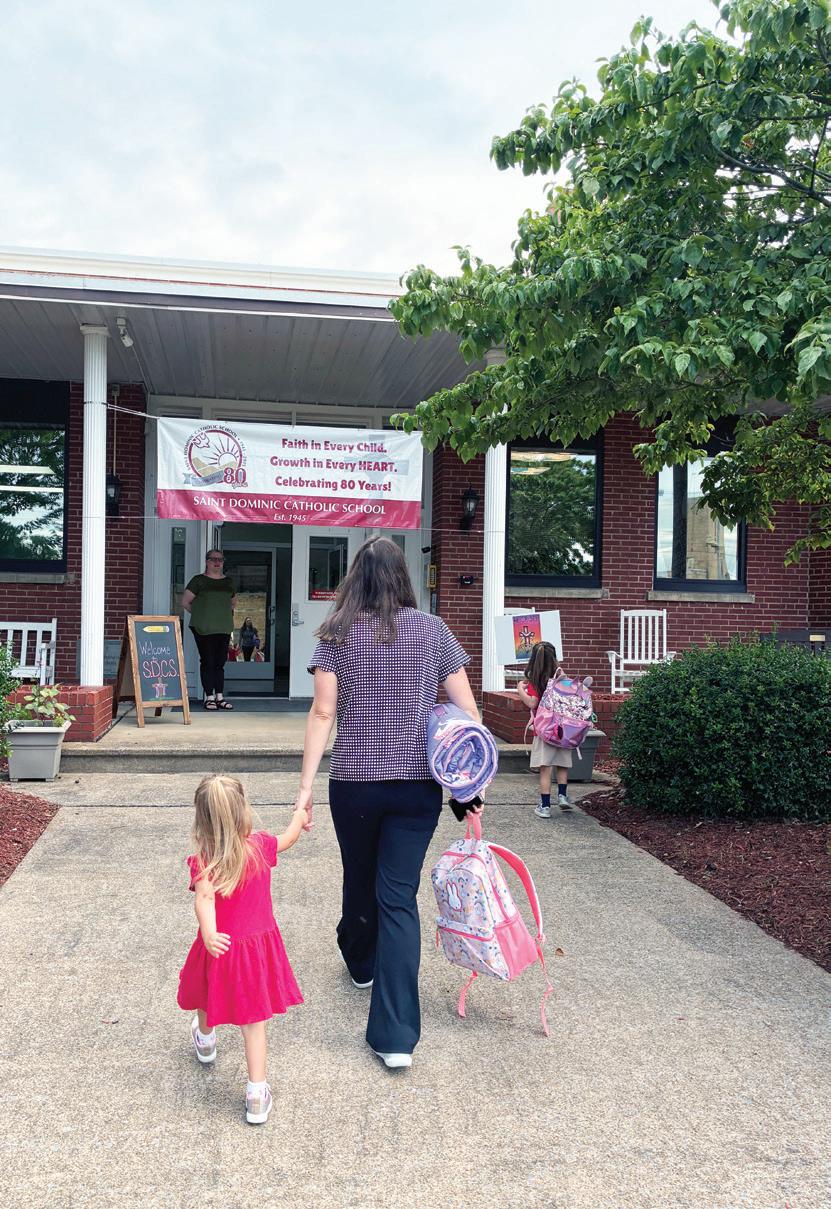



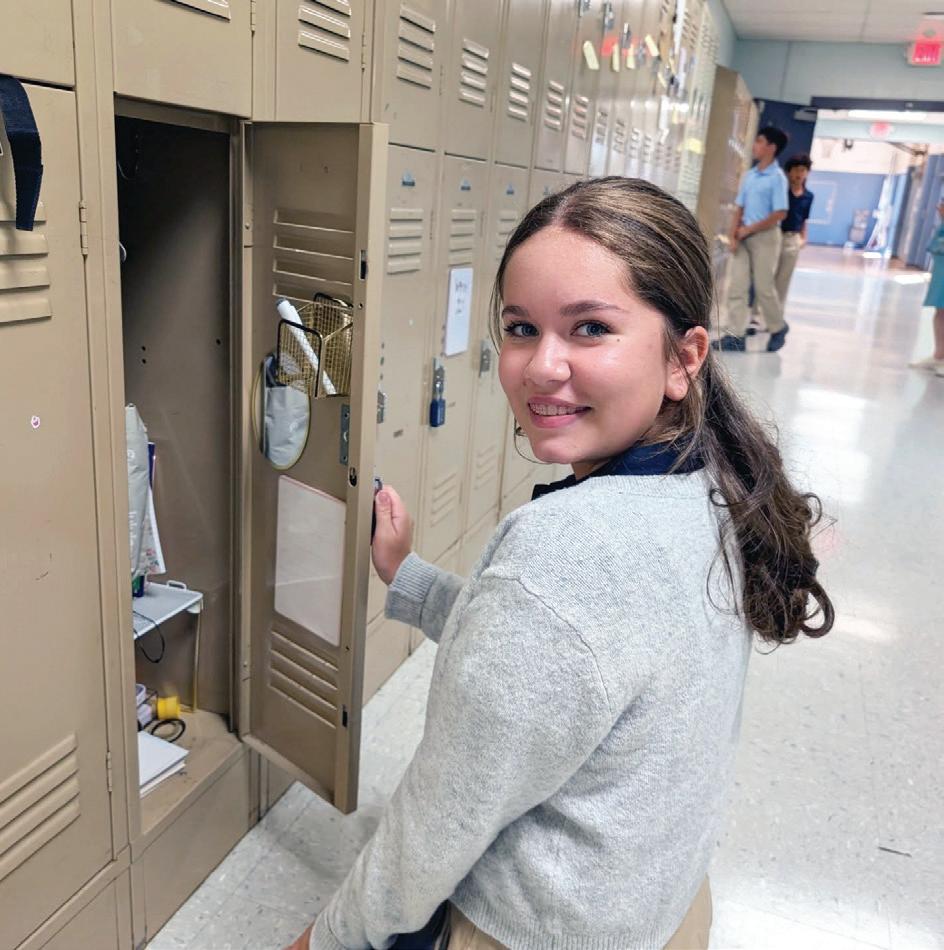



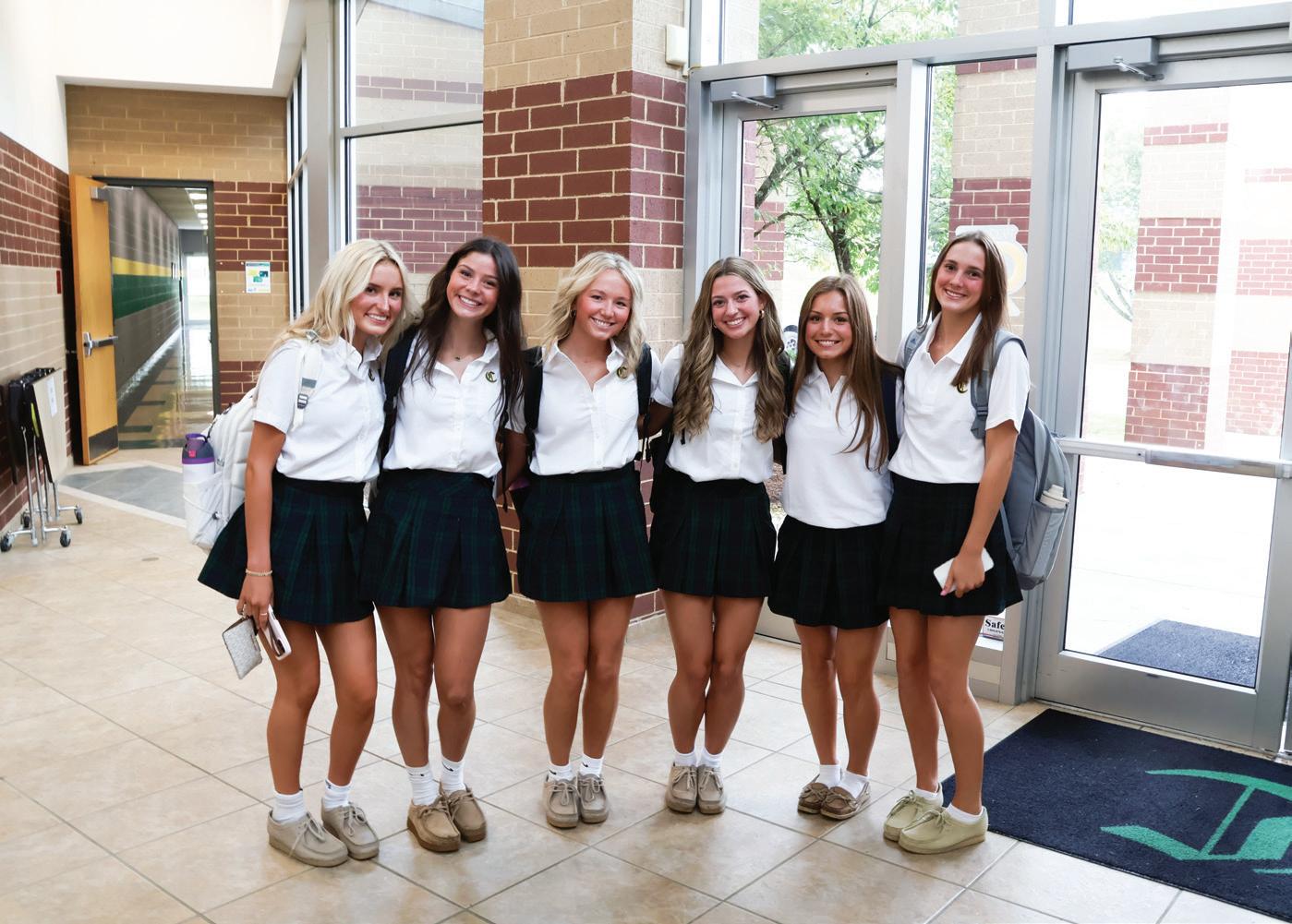

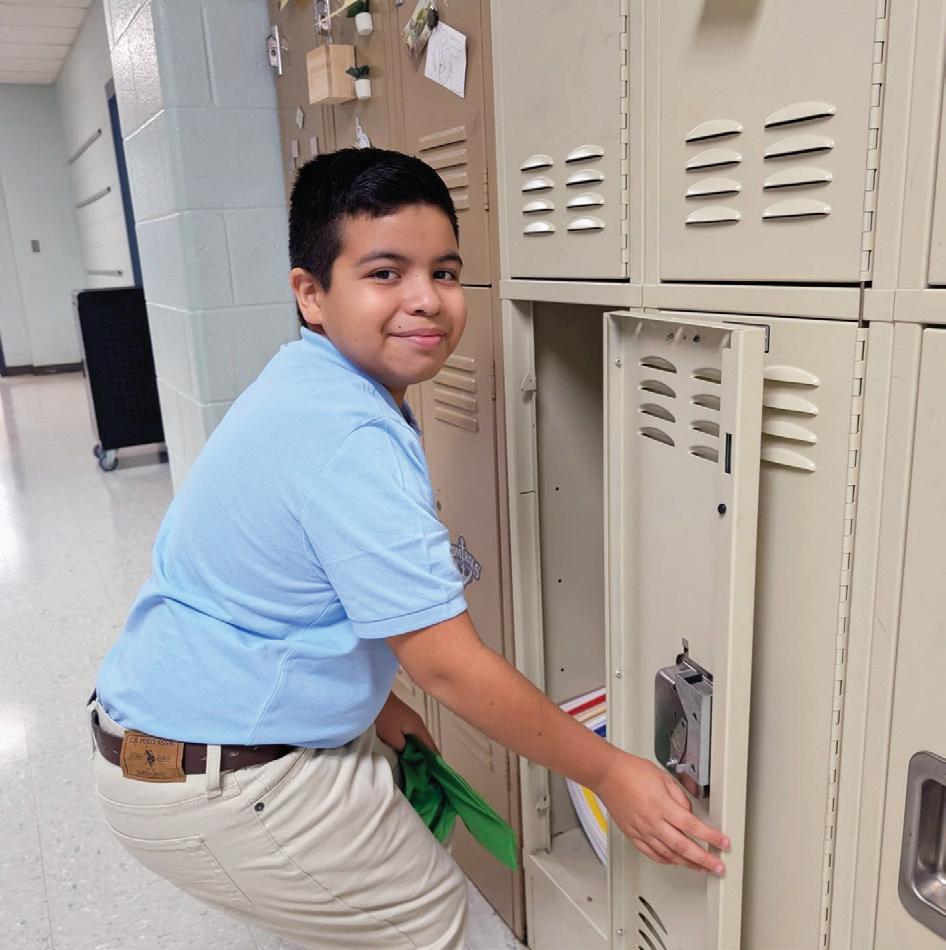
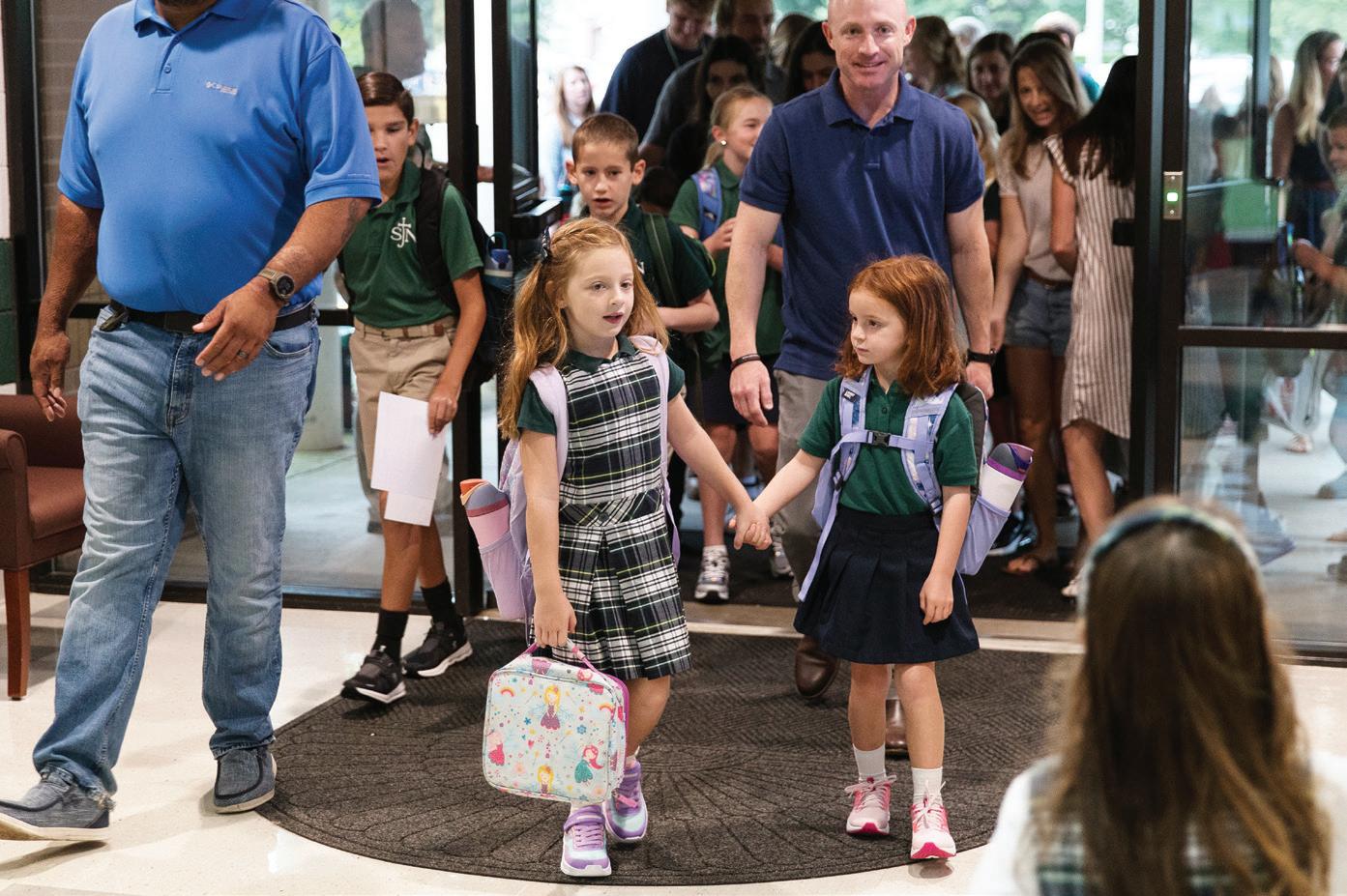





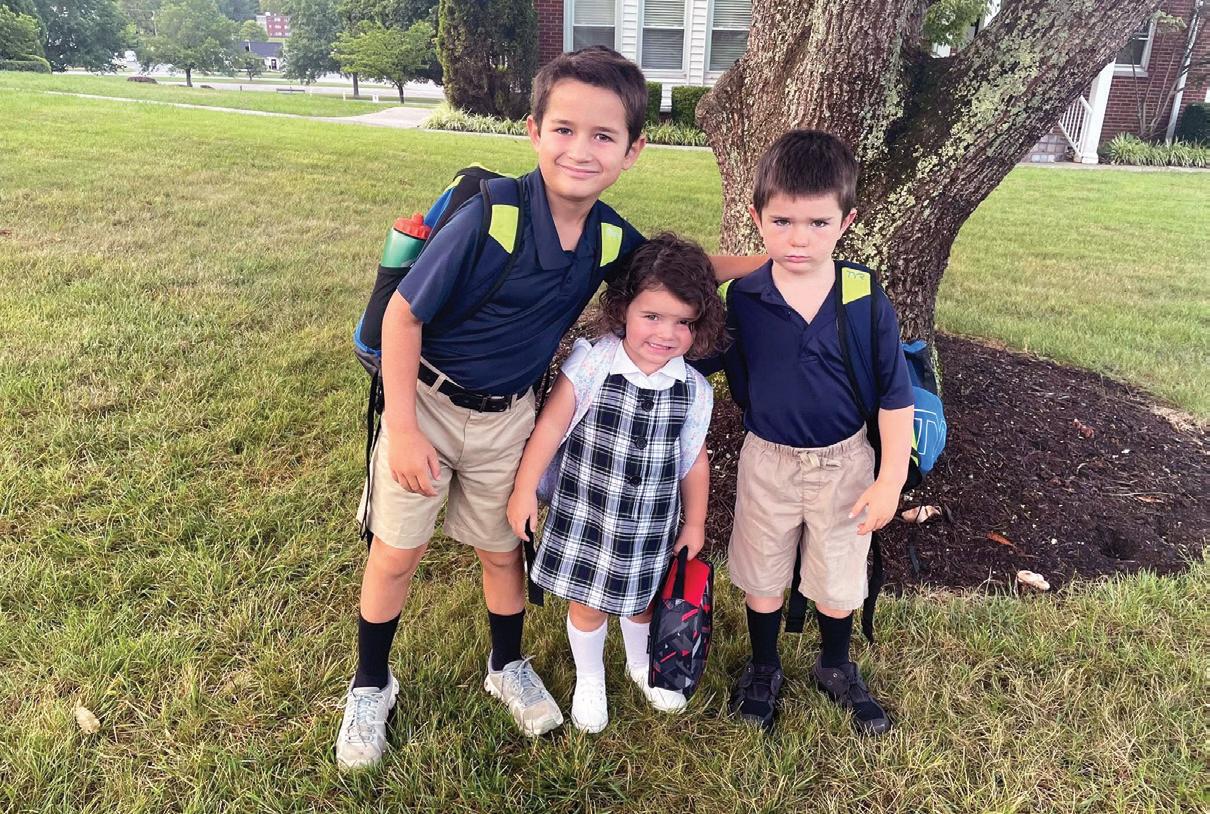
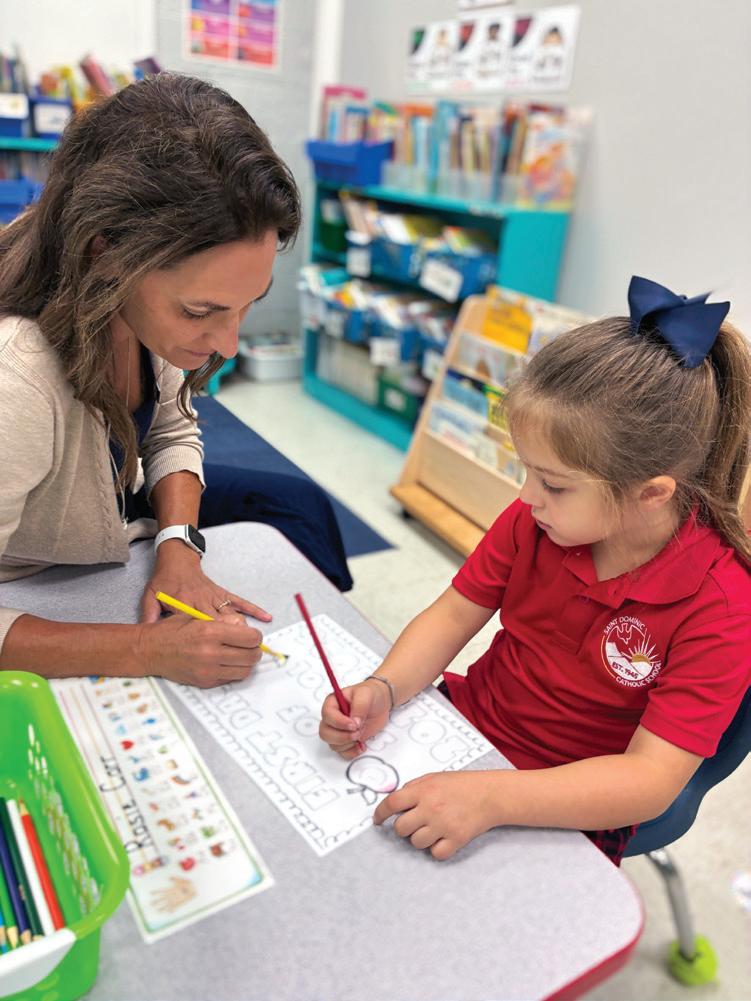


schools welcome new administration. St. Mary in Oak Ridge has both a new principal and assistant principal.
Sister Catherine Marie Hopkins, OP, is the new principal at St. Mary. She comes from St. Rose of Lima School in Murfreesboro after eight years leading its administration as principal. Sister Catherine Marie has more than 40 years of experience in education. Prior to her role as principal, she also served as the director of advancement, where she oversaw building projects, fundraising, alumni, and public relations. She has served several schools from Washington, D.C., to Nashville.
In addition to Sister Catherine Marie, the school is also welcoming another new leader.
Zachary Sizemore is the school’s assistant principal and previously taught social studies in North Carolina. He served 11 years as an infantry officer. During his time in the National Guard, he also served as a NATO liaison in 2022. He has a master’s degree in education and is studying to complete a master’s in administration. Born in Kentucky, he is resettling into the area as his family moves to East Tennessee. He is devoted to the St. Michael Prayer, a prayer of spiritual protection.
In March, Father David Boettner, rector of the Cathedral of the Most Sacred of Jesus, announced principal Mary Sue Kosky was leaving Sacred Heart Cathedral School to dedicate herself to caring for her elderly parents in Florida. In her absence, the school named assistant principal Valerie Hanks as the new principal at Sacred Heart.
Mrs. Hanks stated in April, “As I embrace this new role, I do so with great excitement and a deep sense of purpose. Our mission at SHCS is more than academic excellence; it is about nurturing the hearts and minds of our students so that they may become the best versions of themselves, rooted in faith, knowledge, and service. Ultimately, our greatest goal is to form disciples of Christ young men and women who will go out into the world as beacons of His love and truth.”
Before her new role as principal, Mrs. Hanks served at the school for 13 years as a teacher, an academic dean, and an assistant principal. She shares that her experience with SHCS has deepened her appreciation and love for the school and its dedication to children’s ability to learn both academically and spiritually Kendall Doogan is the new assistant principal of academics at SHCS. Ms. Doogan got her start in the public-school system as an elementary teacher and served as a grade-level chair. She also served as a librarian, where she helped curate a collection of over 10,000 books. She served 10 years at St. Mary School in Oak Ridge. In 2017, she became the Anderson County school’s assistant principal.
She has an extended education background as well, with a master’s in educational leadership from Trevecca Nazarene University and a master’s in elementary education from the University of Tennessee.
In addition to Ms. Doogan joining the school, her son will also be attending as a third-grade student. Ms. Doogan shared her excitement for the new setting: “Sacred Heart is the largest school that I will serve in my career thus far. I am excited about the opportunities the school and the well-established community offer.”
She said she used to teach in an inner-city school in downtown Knoxville, but 10 years ago she felt God pulling her in another direc-
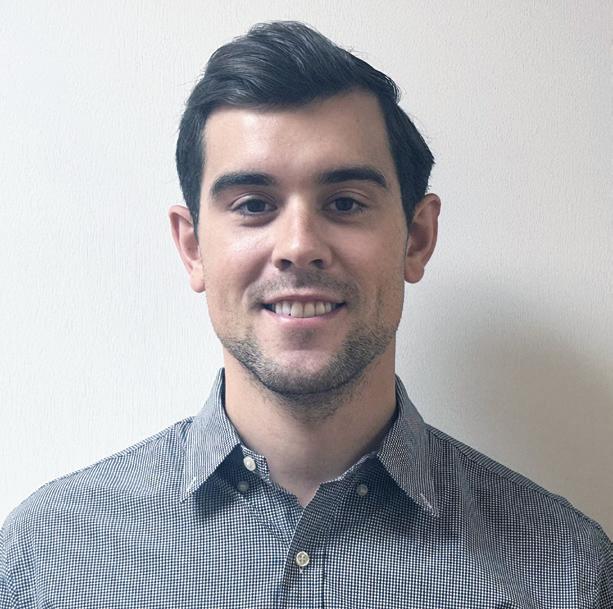

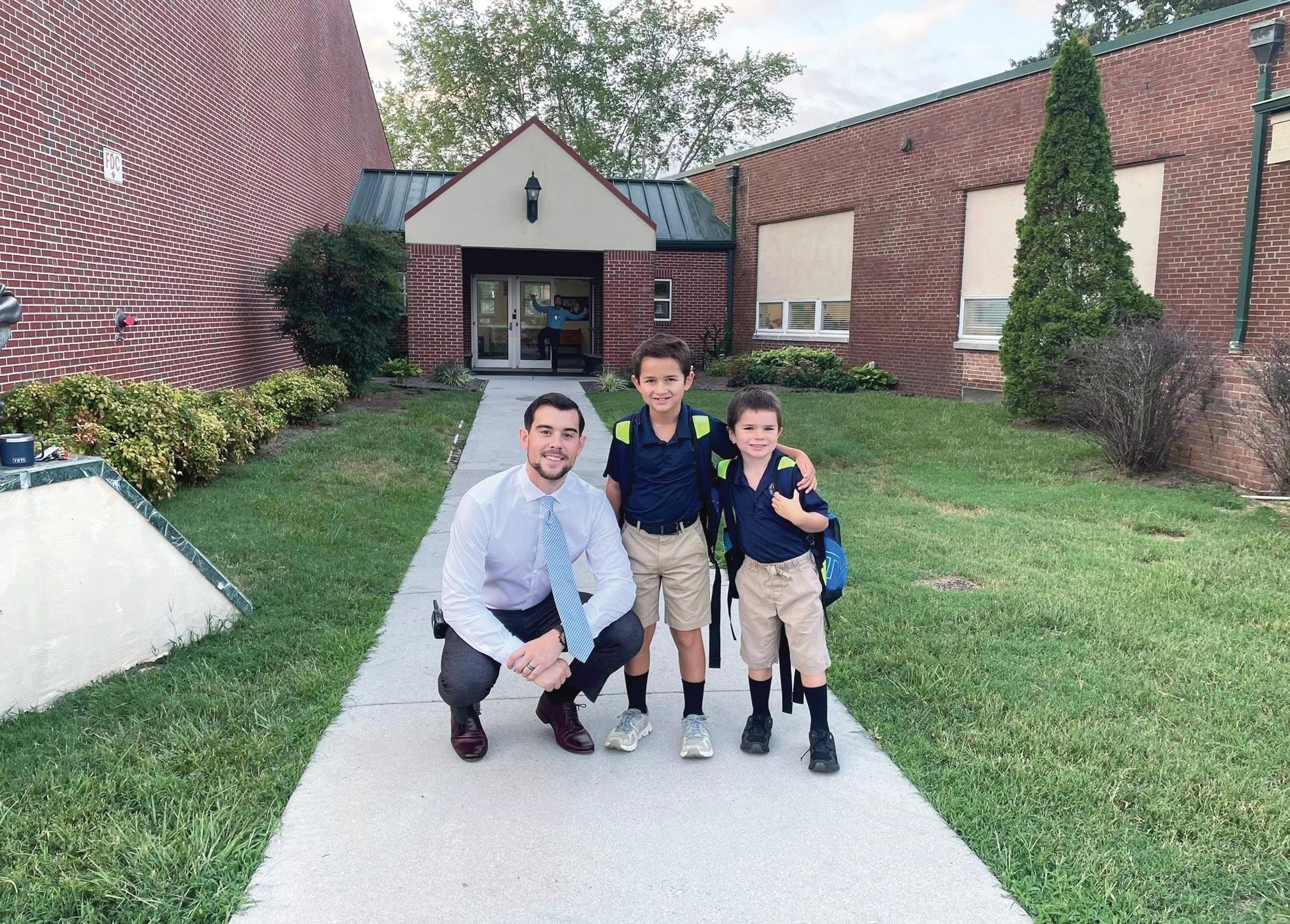
tion. “God led me to St. Mary’s in Oak Ridge. Now, God has led me to Sacred Heart Cathedral School, and I am blessed to be able to serve this community.”
While she takes the role as the new assistant principal at SHCS, she said her significant blessings came from the classroom.
“By far, the biggest blessing is being able to work closely with children. Even though I have been an assistant principal for eight years in another school, I was still teaching either as a general-education teacher or special-area teacher. I loved every minute of it. By having both roles, I truly knew every student in the building,” Ms. Doogan said. With a new environment comes new challenges. Ms. Doogan’s key challenge aligns with her most important blessing.
“Establishing and building those relationships now that I am out of the classroom will now be a big challenge. I will certainly miss being in the classroom,” she said.
“However, I am excited to serve Sacred Heart in my new role and look forward to getting to know all the students and families by being visible, open, and available.”
Starting back at Chesterton Academy Students and faculty of the Chesterton Academy of St. Margaret Clitherow in Knoxville started the academic year with a two-day retreat at Christ Prince of Peace Retreat Center in Benton, Tenn. From Aug. 6-8, retreatants took part in the sacraments, camping, hiking, and swimming, inaugurating the year in Christ while building relationships with one another. The retreat was organized by deputy headmaster Jared Kimutis.
Father Neil Blatchford, spiritual moderator for the school, celebrated Mass and holy hours of eucharistic adoration daily and offered opportunities for the sacrament of reconciliation.
The school, a Catholic classical academy, is now in its third year and has seen its enrollment double to 18 students in grades nine through 12. In fall 2024, the school moved to a new location on Fox Road in West Knoxville after starting out on the east side of town.
“Classical education presents the best that has been thought and taught in the best way for most of history,” said headmaster Zach Summers. “It doesn’t shy away from the beautiful just because it’s beautiful. It is common sense, and when properly understood it’s fun. It doesn’t reduce learning to a technical manual but emphasizes the pursuit of wisdom, like the search for the Holy Grail.
“It is not so much about what to learn but how to learn—not what
to think but how to think. Classical education goes far beyond mere career preparation, but in the end, even that is thrown in. It prepares you for so much more than this age. It prepares you for heaven. And you get earth thrown in.”
Classical education is rooted in timeless truths and focuses on the development of critical thinking, effective communication, and a deep appreciation for history, literature, and philosophy, Mr. Summers said. All Chesterton Academy students study literature, Latin, math, art, the natural sciences, history, theology, philosophy, and music.
In February 2025, the school received official recognition by Bishop Mark Beckman as being “one unique form among many” Catholic schools in the diocese. The academy’s faculty now participates in diocesan-wide teacher training and in-service days.
In addition to their focus on faith and academics, Chesterton Academy students are actively involved in the community and can take part in a range of extracurricular activities such as tennis, golf, cross country, and chess.
Upcoming events include four convocations—days of academic and athletic competition—as well as a masquerade ball in November, a fine-arts night in December to showcase students’ artistic and musical work, and a road trip to the national March for Life in January.
In September, the school will celebrate a votive Mass of the Holy Spirit, during which students will profess and sign an oath of conduct and faculty will profess an oath of fidelity to the magisterium of the Catholic Church.
The Mass of the Holy Spirit is an ancient tradition in Catholic education, particularly among the great Catholic universities of Europe, dating to the 13th century. It invokes the guidance and gifts of the Holy Spirit at the beginning of the academic year. The Jesuits formally adopted the practice in 1599, and it became a normative part of the Catholic academic calendar around the world. Over time, the Mass became a way for Catholic schools, colleges, and seminaries to dedicate the entire year to God’s providence and truth.
Other yearly activities include participation in Knoxville’s St. Patrick’s Day Parade and the Catholic Dad’s Golf Tournament. The academy also offers its annual Cultura Vitae Lecture Series to the community. This year, the series will include expert presentations on making schools beautiful, the call of Catholics to participate in the fight for human life, the history of chalk artists, and classical education and STEM careers.
The talks are intended to educate,
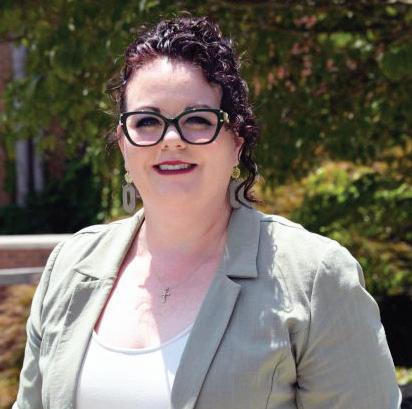
inspire, and help build what Pope St. John Paul II called “the culture of life” by bringing scholars and other accomplished individuals to speak on issues that directly affect the protection of the human person, the family, and the common good.
Voucher program debuts
This school year is the first under the Tennessee Educational Freedom Scholarship program. The Education Freedom Act (EFA) voucher program provides financial assistance to students for tuition and fees to eligible schools. All 10 of diocesan schools are eligible for assistance.
Interim schools superintendent George Valadie shared information on the number of students enrolled with EFA vouchers. As of July 15, a total of 757 families across the diocese were awarded voucher scholarships for Catholic schooling, benefiting about 1,100 students. Of those students, nearly 500 were qualified recipients, which means they were required to meet an income threshold to be awarded a scholarship. The rest were universally awarded, without an income restriction, on a first-come, firstserved basis.
More than $7 million in scholarships went to Catholic students. The scholarships are not limited to Catholics students, with some nonCatholic kids within the diocese awarded grants as well.
Sacred Heart Cathedral School had among the largest number of students using the scholarship vouchers. Knoxville Catholic High School had among the highest number of qualifying students.
School building projects
As schools have grown exponentially over the years, the space they need has been more demanding. A few schools have begun to build upward. In Chattanooga, Our Lady of Perpetual Help has completed renovations to both the church sanctuary and nave, and OLPH School.
The church started with a roof leak that revealed water leaking into the sanctuary as well. This revealed yet another leak and led to plans to remodel the church. As the church’s old carpet was removed, beautiful marble floors were uncovered. The renovation was expanded and became a restoration of the church’s original look when it first opened in the 1930s.
Construction is now finished, and the church nave and sanctuary were rededicated by Bishop Mark Beckman on Aug. 16.
In addition to OLPH Church’s renovation, the parish school also needed several repairs. The school converted storage space into usable classroom space, replacing old windows and making roofing repairs. St. John Neumann Parish and School in Farragut have received a generous donation for a middleschool expansion from Lydia Melli. Lydia and her late husband, Claude Melli, were longtime parishioners of St. John Neumann and gave continuous support to the parish and school. In 2021, an endowment from the Mellis was named in honor of Claude Melli and provided tuition assistance and financial resources for the school.
The 8,000-square-foot expansion is aimed at creating new innovative learning spaces accommodating students’ evolving needs. Expansion plans include a new classroom, collaborative study areas, a STEM research lab, and new student gathering spaces. The expansion will also embrace sustainable and energy-efficient designs. ■
By Claire Collins
On June 28, clergy, staff, and parishioners of the Basilica of Sts. Peter and Paul in Chattanooga gathered to honor a special intersection of anniversaries, well wishes, and celebrations.
Father David Carter, rector of the basilica, shared his 20th anniversary of ordination to the priesthood with the 135th anniversary of the dedication of the basilica. Soon, it was realized that in addition to these great occasions, former basilica parochial vicar
Father Michael Hendershott was celebrating his 10th anniversary of ordination, and current parochial vicar Father Alex Hernandez was celebrating his fifth anniversary of ordination. In addition, seminarian Eli Holt had just celebrated his 23rd birthday. It would only follow that a dinner for the parish would be the best way to celebrate the occasion. The event was put on by various ministries within the parish. Knights of Columbus Council 610 provided food and a generous birthday gift to Mr. Holt.

The Seven Sisters Apostolate, a ministry dedicated to praying for the priests of the basilica, took charge of decorations. The receptions ministry and director of religious education Florence Porter were responsible for serving and cleaning. In addition, Angel Ali -
You can change lives by supporting our Catholic schools ministry with your donation to the Tuition Assistance Fund.

cea, maintenance supervisor, set up the event.
Father Carter served as master of ceremonies and welcomed everyone to the event. He took a moment to acknowledge each special occasion for celebration, and to thank each support person who
basilica
worked together to put on the joyous occasion.
“It was a providential confluence of celebrations,” Father Carter said. “It shows that we are united in the Body of Christ. When one member suffers, we all suffer, and when one member rejoices, we all rejoice. What a great joy it was for me to share anniversaries with my brother priests and also to be able to include our seminarian and the anniversary of the dedication of the church.”
Mr. Holt’s summer assignment was serving at the basilica. He attends Conception Seminary College in Conception, Mo.
“I was honored and felt supported that the parish included me in the celebration,” Mr. Holt said. “The basilica is a wonderful parish with many great families, and it was a special experience for me to have the opportunity to talk with the parishioners and get to know them better.”
“My family also came down from Knoxville for the event. It was a great way for them to catch a glimpse of how I am involved
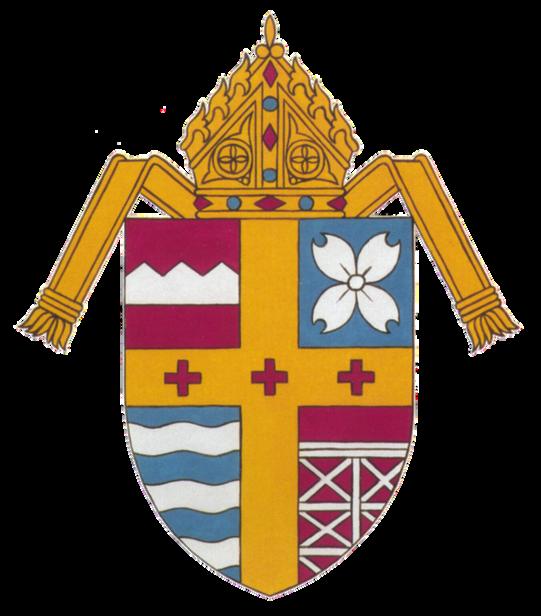
Place your envelope or gift in the collection basket, or visit https:// dioknox.org/schools-collection

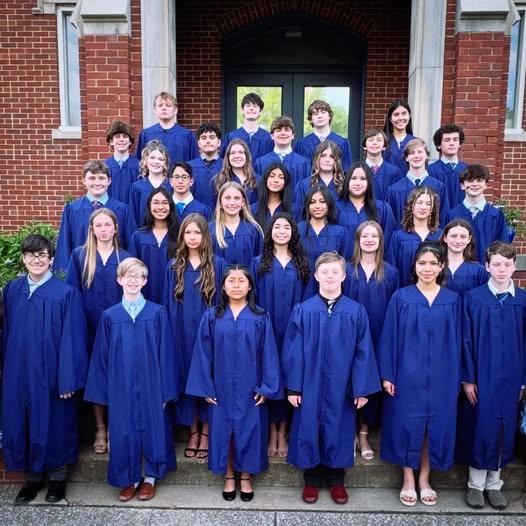

Give to Diocese of Knoxville Catholic schools at dioknox.org/schools-collection, at the next second collection for schools on Nov. 2, or with the QR code here:

Back to School Across East Tennessee
Catholic Heart Workcamp returns to diocese to celebrate community and service United as the hands and feet of Christ
By Maggie Parsons
More than 250 campers attended the 15th annual Catholic Heart Workcamp hosted by the Diocese of Knoxville, welcoming people traveling from all over the country to say yes to serve the people of God in community with each other. The campers convened in Knoxville June 22-26.
“I think you need to step outside your own backyard to experience it, to know how you can pour back into your own community,” said Annie Nassis, director for the Knoxville location of the Catholic Heart Workcamp and youth minister at All Saints Parish in Knoxville.
Ms. Nassis described how participants in the camp must leave their home community to see how they can give back to their own community to the best of their ability.
and away have the highest percentage of kids getting the scholarships among diocesan schools. I give the credit to Andy Zengel. He was relentless in getting information out to families,” said Father Chris Michelson, president of St. Joseph School and special adviser to the president of Knoxville Catholic High School, referring to the principal of St. Joseph.
As the Tennessee Education Freedom Scholarship program was developed last spring, Mr. Zengel joined Diocese of Knoxville schools interim superintendent George Valadie and other diocesan school leaders in studying the program and what its impact on the schools would be.
They then disseminated as much information as possible among the schools and families interested in applying for the grants.
“Getting the word out to faculties and administrators at schools was important early on. George Valadie, our superintendent, was great with that. We also were blessed by former state Rep. Bill Dunn, who now works with the state Department of Education and was able to answer questions throughout the early days of the process. That was a great help,” Mr. Zengel said.
“All 10 schools in the Diocese of Knoxville have done very well with the Tennessee Education Freedom scholarships. I credit George Valadie for communicating everything we learned about the process. … He was the conduit to share that information with everyone so that we were all on the same page,” Mr. Zengel added.
At St. Joseph, Mr. Zengel led efforts to assist families with scanning documents needed for the scholarship application process, ensuring they knew exactly what the deadlines were to get into the scholarship portal. Similar exercises played out at other diocesan schools between Feb. 12 and May 15. Response to the new program was overwhelming across the state. More than 40,000 families applied for the 20,000 scholarships. And according to Mr. Zengel, 33,000 people put in their applications in the first five hours that the online application site was open on May 15.
“Getting the word out, especially to our families here at St. Joseph, at Knoxville Catholic High School, and the other schools, to make them aware of this tremendous opportunity so that they could be ready to apply for the scholarships, was critical since it was a first-come, firstserved scenario,” Mr. Zengel said. “At a small school like St. Joseph, 116 vouchers were approved for us out of 20,000 statewide. That is a tremendous ratio.”
St. Joseph’s enrollment for 2025-26 is 245.
The St. Joseph principal said 14 of the students receiving scholarships

Catholic Heart Workcamp has celebrated 33 years of serving communities and growing in faith, spanning
eight weeks in the summer from many locations all around the country. The mission of the camp is to empower

are new to St. Joseph. He pointed out that many of the North Knoxville school’s students who received scholarships have older siblings at Knoxville Catholic High School who also were given the grants. Participation in the Tennessee Education Freedom Scholarship program by St. Joseph families has surprised Father Michelson and Mr. Zengel.
“In the beginning, I asked Andy how many he thought we would get, and he said 10 to 15. He asked me how many I thought we would get, and I was optimistic, so I said about 50, and of course we received 116. It was way more than either of us was expecting. That is $850,000. That is an influx of just a hair under $850,000 to St. Joseph School that we don’t have to bill for. It’s great,” Father Michelson said.
The school principal and the priest, who has served at St. Mary Parish and School in Oak Ridge and All Saints and St. Albert the Great parishes in Knoxville, noted that tuition at St. Joseph and all Knoxvillearea diocesan elementary schools is $10,200 per student per year, adding that families of the Knoxville-area elementary schools who received scholarships will now pay $2,905 annually to make up the difference.
“We had families who applied for both qualified scholarships that are based on family income and unrestricted scholarships that aren’t based on income. We have a much higher percentage of vouchers that were granted to our qualified applicants. I think 57 percent of our approved vouchers were qualified vouchers. And about 85 percent of the families at St. Joseph who applied for vouchers received one. They were ready to go with the correct information, their documents were scanned and ready to go, and they had their alarms set leading to the window opening up online. I’m very proud of our community for their readiness,” Mr. Zengel shared.
The numbers appear to be strong across the diocese.
“Most everybody (the 10 schools) is pretty consistent. Between 25
Catholics all around the world of all ages to surrender to God’s will by stepping out of their comfort zones and serving the people in need by being the hands and feet of Christ.
“The sense of community is built not only while we are together with our youth group, but outside our youth group, and through all the amazing people we get to meet from all over the country,” said Kate Whyman, a youth participant attending the camp from Georgia.
Kate enjoys the community that is built during the camp and the opportunities to meet other people outside the group they came with in order to get a diverse experience.
The camp is divided into five days, having its own variety of activities for the participants, including prayer, work, and fun. Each day they celebrate Mass together before splitting up into
pre-kindergarten.
Setting the record straight
Mr. Valadie, like Father Michelson and Mr. Zengel, has been a proponent of school choice. He is gratified that state political leaders have finally agreed that students from all corners of Tennessee can have the opportunity for a Catholic education. They would like to see the program expand even as it is in its first month.
“I think all of our schools, administrators, and pastors are hopeful that the program, first of all, will just stay in place and won’t be at the whim of the next political party that wants to go on a different path,” Mr. Valadie said. “We want to see it last a long time. We would like to see it last forever.”
and 35 percent of their students received the vouchers across the board. We (St. Joseph) probably are the anomaly percentagewise. I know working with Knoxville Catholic High School that it is right at 32 percent. So, right at 30 percent of the students in the diocese will have a voucher next year, which should have a profound impact on everyone in the schools. Knoxville Catholic got about 214 vouchers, which is about $1.6 million,” Father Michelson said.
Bishop Mark Beckman and the school leaders believe Tennessee’s scholarship program can have a significant impact.
“This has the potential to be a game-changer for our schools,” Mr. Valadie said.
As schools were entering the 2025-26 academic year, Mr. Valadie was crunching the diocesan-wide scholarship numbers, looking for trends among the 10 campuses and their nearly 3,600 students.
“We will have right at 1,100 students receiving a voucher,” Mr. Valadie said. “In our world, 54 percent of the students in our schools received universal scholarships and 46 percent received qualified scholarships. Half of the 1,100 students we know have financial need. One of two paths is there for them. Either we are already helping them with financial aid and the scholarships help us recoup some of that money and the schools can then provide that financial-aid money to another family, or maybe they weren’t receiving any financial aid at all but now have $7,295 that they can apply to their tuition bill.”
And of $144.2 million the state has earmarked for the scholarships, Diocese of Knoxville schools will receive more than $7 million.
Tennessee has 626 private schools. In 2021-22, some 960,000 Tennessee children, or 85 percent of all schoolaged kids, were enrolled in public schools, according to the Sycamore Institute in a February 2025 report. In the 2024-25 academic year, 3,453 students were enrolled in Diocese of Knoxville schools, including
“But even in the short term, even if it doesn’t last forever, the impact that it has had in one year is significant because our schools will benefit in excess of $7 million in tuition, making it possible for families to become part of the (Catholic school) system who haven’t been. It makes it easier for people who have been part of the system to be able to continue in the system,” he added.
Mr. Valadie is aware of the criticisms laid on the Tennessee Education Freedom Scholarship program. And he has heard the longtime arguments against school choice and the opinion that public schools are required to take all students and private schools can cherry-pick who they enroll.
He’s not buying it, not any more.
As a 48-year veteran educator and chief administrator of the diocese’s eight elementary schools and two high schools in Chattanooga, Kingsport, Johnson City, Oak Ridge, Farragut, and Knoxville, he has first-hand experience teaching students from all levels of ability.
“The bandwidth of struggling students who bring academic challenges is much, much, much broader than it used to be. It’s still not broad enough. We should do a better job,” said Mr. Valadie, referring to Catholic schools and the fact they enroll students from all walks of life and with all levels of academic ability.
“Hopefully, we’ll be able to expand and take even more students who struggle. But we can’t take everybody because we’re not going to take somebody’s money and say we can do something we can’t do. But we are taking more academically challenged students than we did years ago.”
“Having said that, why shouldn’t a parent have the right to find a school that will serve their child and take their money there? Maybe it’s not our Catholic school. Maybe it’s this private school or that private school. Why not? Because parents know what their kids need most, and if it’s not us, then find the one that works best,” he added. “I think that’s what the Tennessee
Back to School Across East Tennessee
Education Freedom Scholarship program is trying to do.”
That doesn’t mean Mr. Valadie can’t share concerns about the new scholarship program that others have.
He would have liked families not already part of private schools and taking part in the scholarship program for the first time to be better informed about the private-school enrollment process.
“What I never saw come out, especially for those who don’t live in the private-school world, is there is an application process, and there is a getting-accepted process, and for some a financial-aid process, all of that with a private school.
I think some people mistakenly thought, ‘I have a voucher; I can take it wherever I want. I’m in,’ done deal,” Mr. Valadie said.
The former principal of Notre Dame High School in Chattanooga said parents looking at private school for the first time need to know that those schools have an application process and requirements that all incoming students must meet. He pointed out that first-time private-school parents may not realize specifics such as tuition is likely more than the $7,295 the state is providing per child, transportation to and from school is not provided, or uniforms are required.
Mr. Valadie is aware there will be families who benefit from the scholarships who already have financial resources. Some of them were already paying full tuition and received the unrestricted or “universal” scholarships. He noted that another way the Diocese of Knoxville can benefit is if families who receive those universal scholarships donate some or all of the money they would have spent on tuition to a diocesan school or parish Still, he believes need is easily misunderstood.
“The criticism makes an assumption that those people don’t have a need. I think they do have a need. Just because you happen to cross the financial-barrier line that was set, your life might not be that dramatically different,” he said. But he also recognizes that there are different levels of need, and the Catholic Church has an obligation to provide a Catholic education to as many students as possible regardless of income. To do that, the Diocese of Knoxville already offers financial assistance to school families who need a helping hand.
“We already award $6.8 million in financial assistance to students across our diocese, which comes from parishes, parishioners, alumni, parents, grandparents, and endowments. All of that is an attempt to help families do what we have been wanting to do: to have a choice and come to our schools,” Mr. Valadie said. He emphasized that state scholarship money, as an unintended consequence, will aid in providing that diocesan financial assistance to other families in need. “And that is all in hope of spreading the mission, spreading the Word, evangelizing.”
“There is always a need for continued financial assistance for those in need. The state scholarships do not change that,” he said. “We are hopeful that the new program lasts and continues to spread. But that’s not where it is at the moment, so absolutely the financial need is there. We are very supportive of the process. We have followed Bishop Beckman’s lead in that regard about the desire to see families have choice.”
Father Michelson and Father David Boettner, rector of the Cathedral of the Most Sacred Heart of Jesus, who leads the diocese’s largest elementary school, recognize how financial aid in the diocese can benefit from the Tennessee Education Freedom scholarships. As more families participate in the state program, that makes diocesan financial assistance available to families who previously weren’t able to receive it.
“We redistributed about $90,000 from families who were going to get financial assistance from the diocese’s regional Catholic schools fund, and we were able to then take that and help others who had applied,” Father Michelson said.
Father Boettner explained that the financial impact of the scholarships on Sacred Heart Cathedral School is limited but still potentially very positive.
“Honestly, the financial impact on the school is kind of negligible because what it does is reduce a family’s liability for tuition. But the hope is that it frees up some dollars for them to maybe be more generous in their tithing or in their contribution to the school’s annual fund,” he said.
The cathedral rector shares the view that it’s a myth that the scholarships will keep money from going to public education.
“The thing people always forget is that sometimes it’s portrayed as taking funds away from public schools. That’s not really true. The funds follow the student. So, wherever these students are in school, the funds ought to follow those students. I really believe that if we are serious about public education in the sense of the whole public having a stake in the educational future of our children, then this is exactly the right direction to go because it allows parents to have the choice to say these are the values that I know will guide and direct my children so that they will understand and seek their ultimate purpose,

which is salvation,” Father Boettner said.
He is all for the state scholarship program expanding.
“I’ve watched our families for so many years make such huge sacrifices to be able to send their children to Catholic schools. Even though the Tennessee Education Freedom scholarships don’t cover the full cost of tuition, what they effectively do is give our parents a little bit of breathing space and allow them to really know that they have the ability to see their children through Catholic schools all the way,” he said. “The other thing that I love is it has opened up the possibility for some of our new Catholic families to really take a second look and think that Catholic school is an option. It always has been, and we always will work with any family to make it affordable. But I think the scholarships have had the effect of encouraging more people to take a look at Catholic education and see it as a real, viable option for them.”
Mr. Zengel, who is a supporter of public education, is keen on dispelling myths surrounding school choice. He points out that state money for the Tennessee Education Freedom scholarships comes from gaming and the lottery, the same sources that fund the HOPE scholarships, and not property, sales, or wheel taxes.
“There is this idea that we are taking away from public education. Public education is needed in our state and in our nation. It’s a good thing. We are not trying to take away from that. But we are encouraging families who pay their
taxes to apply for this great benefit because it’s a good thing for us to do that,” he said.
What ifs and teacher pay
There is universal concern about the Tennessee Education Freedom Scholarship program not being resistant to shifts in the political process. And there is widespread support for state government maintaining its position that it will not micromanage the scholarships once they are awarded.
“My only concern with the process, and this goes back to when it was first introduced last year, is this: the way the law has been written has been really thoughtful about how each private school, Catholic schools can preserve their mission and not be beholden to the state and the whims of politics. My hope is that will continue to be a priority of our legislators as we move forward. It is very easy to work with the Department of Education in that regard. It is not trying to come in and run our school. It is not trying to dictate changes in our curriculum or school mission. That is a huge priority for the Diocese of Knoxville. We are not going to be beholden to some other entity outside of the Church,” Mr. Zengel said.
He and Father Michelson expressed apprehension about school choice and the scholarships becoming a political football in Nashville in years to come.
“I agree with that. What happens in three years


THA
for your commitment to the 2025 Bishop’s Appeal for Ministries!
Scan here to learn more about the Bishop’s Appeal for Ministries
Mary’s “yes” to God was an act of trust, courage, and love— one that changed the world forever. Inspired by her example, you, too, have said “yes” through your prayers and generosity. Thank you for supporting the 2025 Bishop’s Appeal for Ministries and making Christ’s love known throughout East Tennessee.
Your gifts help sustain the ministries that serve our diocese, from forming future priests and supporting our deacons to nurturing children in the faith and providing essential outreach through Catholic Charities and St. Mary’s Legacy Clinic. Because of you, free healthcare reaches those in need, faith formation programs continue to grow, and seminarians can follow the call God has placed on their hearts. Every act of generosity, no matter the size, is a reflection of Mary’s trust in God’s plan. Your “yes” is a gift to the Church and to all those who rely on these ministries. Thank you for your unwavering commitment to the Bishop’s Appeal for Ministries—your faith and generosity are transforming lives!
Together, we are building a vibrant, loving community that reflects Christ’s love and mission.
Thank you for being a part of this journey!
when we’ve come to rely on it. We’ve gotten used to it. They (parents) have gotten used to it. Then you go back to your families and say tuition is going to cost you $7,295 more. It would be hugely difficult to go back now. The more years that go by, the harder it is going to be to reverse back, especially if we go to a smaller percentage increase in tuition because of the vouchers and then the vouchers go away, then we are way behind. That is the big fear out there. Will they change the law to dictate some things that we couldn’t live with or it goes away?” Father Michelson said.
Another twist is the “One Big Beautiful Bill” passed by Congress this summer that includes a significant provision for school choice. The federal law establishes a federal tax credit for donations to scholarshipgranting organizations, effectively creating a national school-voucher program that would allow eligible students to use scholarships for educational expenses, including privateschool tuition, tutoring, and other qualifying education costs.
States must choose whether to participate in this income-based program or not, and it remains to be seen if Tennessee will take part. The federal scholarships are available only to students in participating states. The program is set to begin on Jan. 1, 2027.
Mr. Valadie noted that the federal program potentially is another opportunity for families who aren’t participating in the Tennessee Education Freedom scholarships to take part in school choice.
In the meantime, Mr. Valadie, Fa-
Back to School Across East Tennessee
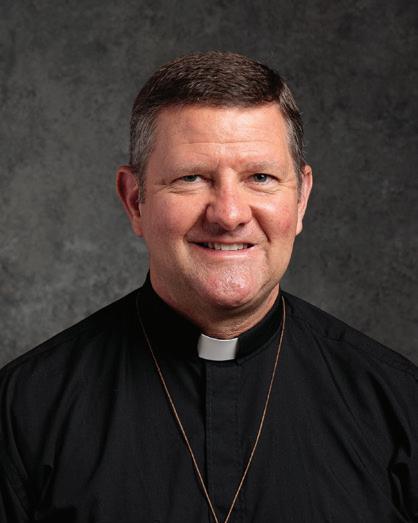
" I really believe that if we are serious about public education in the sense of the whole public having a stake in the educational future of our children, then this is exactly the right direction to go because it allows parents to have the choice to say these are the values that I know will guide and direct my children so that they will understand and seek their ultimate purpose, which is salvation "
— Father David Boettner, Cathedral of the Most Sacred Heart of Jesus rector
ther Michelson, Father Boettner, and Mr. Zengel are celebrating school choice in Tennessee and what that means for Catholic education in the Diocese of Knoxville.
The two priests already are assessing the effect on teacher salaries.
“The vouchers are going to have a long-lasting, profound impact. Generally, in the last few years we have reached the point where we had to have a 6 percent tuition increase to be able to give teachers a 6 percent salary increase. We’re hoping that maybe as a result of the vouchers it’s a 2 percent tuition increase and a 6 percent salary increase for teachers so we can keep getting our teachers closer to where they need to be in salary and not put as much of a burden on families,” Father Michelson reasoned.
That sentiment is being shared by other diocesan schools.
“What we have done this year is let all of our parents who received the scholarships know that anything they donate back to the school we want to put 100 percent toward our teacher salaries to really continue bringing our teacher salaries up to a higher
level,” Father Boettner added about Sacred Heart Cathedral School.
St. Joseph is typical of the 10 Diocese of Knoxville schools. Balancing the annual budget is challenging and the schools rely on development efforts like fundraisers to help income equal expenses. Father Michelson said St. Joseph had to raise about $500,000 from development activities in the last school year to maintain its budget. He noted that $475,000 of that amount came from fundraisers.
The Tennessee Education Freedom scholarships can potentially free up money for more giving to schools and parishes, providing much-needed relief for budgets.
All agree the bottom line is evangelization and salvation, bringing Jesus and His Word to students in the classroom.
Mr. Valadie cited St. John Neumann, who was dedicated to Catholic education and recognized that Catholic schools were crucial for preserving the faith and identity of Catholic children.
“I believe the saying that if you want to grow the Catholic Church,
grow the schools,” he said. “There is a wealth of studies and statistics that demonstrate the impact that Catholic schools have on faith and lifelong churchgoers and lifelong contributors to the Church. Those numbers have existed for years and will continue to exist.”
If school choice and state scholarships or vouchers can help further this mission, the Diocese of Knoxville is all in.
“As a system of 10 private schools, I think we did a phenomenal job of educating our families and educating as many people as we could. I wasn’t really sure how it would go, but I knew it had the potential to make that kind of difference for us. We went after it from an educational perspective as hard as we could. Our principals and pastors worked like Trojans to get the information out,” Mr. Valadie said
And regardless of how the Tennessee Education Freedom Scholarship program plays out, all involved in Catholic education in East Tennessee from Bishop Beckman to families see school choice as a blessing.
“I don’t think that we’ll ever wish that it would have never started. I don’t think we’ll ever feel that way because right now, today, there are families benefiting, wherever they choose to go to school,” Mr. Valadie said. “Is it conceivable that political winds change and it’s taken away 15 years from now, and will it cause hardship? Yes. Will it eliminate us? No. I like our history, 2,000 years’ worth. This is not going to be the end all or be all. I don’t think we’ll ever regret having this opportunity.” ■

Following where God leads him
Fr. John O'Neill retires from active diocesan ministry, accepts Conception assignment
By Bill Brewer
Father John O’Neill, a longtime priest of the dioceses of Knoxville and Nashville, has retired from active diocesan ministry and accepted a position as coordinator of spiritual formation at Conception Seminary College in Conception, Mo.
Father O’Neill most recently served as pastor of St. Cecilia Parish in Waynesboro, Tenn., Holy Trinity Parish in Hohenwald, Tenn., and Christ the Redeemer Parish in Centerville, Tenn. He was incardinated into the Diocese of Nashville from the Diocese of Knoxville on Oct. 1, 2012, after switching his service from East Tennessee to Middle Tennessee in 2005 to become chaplain for the campus of Overbrook School, St. Cecilia Academy, and Aquinas College in Nashville. The schools are operated by the Dominican Sisters of St. Cecilia Congregation.
His first assignment in the Diocese of Nashville was as priest-in-residence at Holy Rosary Parish in Donelson and St. Joseph Parish in Madison. He also served as chaplain to the Sisters of Mercy convent and as part-time chaplain for Ascension St. Thomas Midtown and St. Thomas West hospitals.
The native of Dublin, Ireland, in 2018 was appointed pastor of the Waynesboro, Hohenwald, and Centerville parishes, his next pastoral assignment for the Diocese of Nashville.
Father O’Neill reported to Conception Seminary in early August, ahead of seminary students arriving on campus for the fall semester on Aug. 13. While serving at Conception, Father O’Neill will continue to be a Diocese of Nashville priest.
The Irish priest who became a U.S. citizen on Jan. 18, 2023, in Nashville “at the ripe age of 66” explained that he became ill in March and was instructed by doctors to take a medical leave of absence. He battled COVID last year following the 25th anniversary of his ordination to the priesthood, which was July 3, 2024.
“One doctor and then another doctor said I was in acute need of medical leave for what turned out to be long COVID. I had many symptoms,” Father O’Neill said. “I had to stand down from the three parishes in four counties where I was. The
to be the leaders in the Church liturgies.
“And watching the youth grow into that in such a short amount of time is absolutely amazing to see,” he added, citing as an example how the youth can take that step as leaders for the Church and be an example for everyone on how to take that action in their faith.
“I feel so much more reflective here; it’s away from the culture. And when I come here, I can know what to expect. I know what I’m getting myself into; my role could change, but I know nothing really has changed,” Ms. Vosburg said about how One Bread One Cup at the St. Meinrad Archabbey is like a breath of fresh air away from all the craziness in the secular culture back home.
“This place remains the same regardless of the world changing around me and how my life changes year to year,” Ms. Vosburg remarked.
She said many people call St. Meinrad the place of perfect peace, and the participants who come to One Bread One Cup understand why. Those who return to the conference year after year do so because they know that the archabbey will be there waiting for them; they know that they can find peace in the Lord there when they need it the most.
Robert Feduccia, one of the founders of the One Bread One Cup conference, talked about the inspiration behind starting the conference.
“There was a very big question: what are teens’ roles in the liturgy? There was something unique that St. Meinrad could offer to young
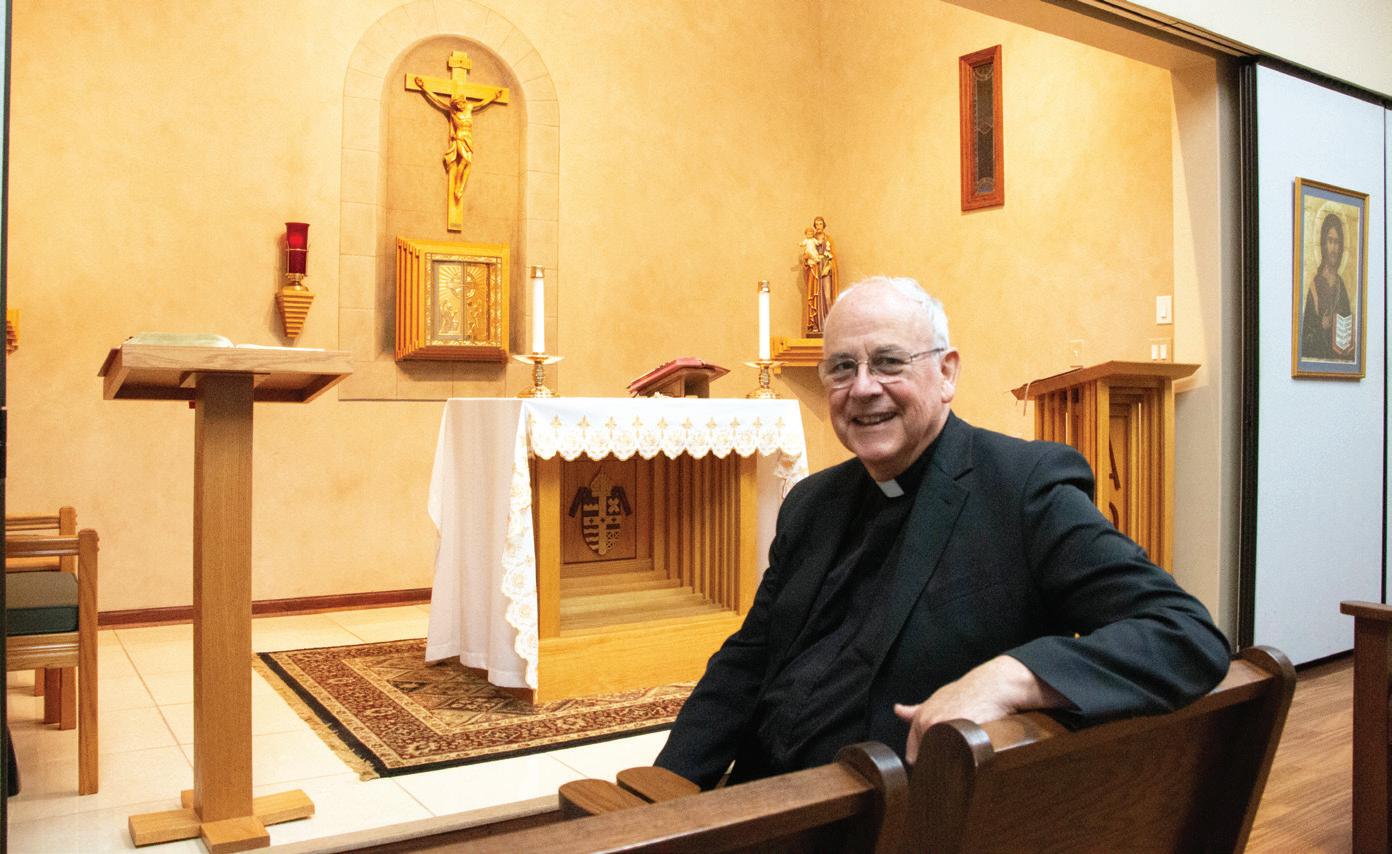
and her children at Holy Ghost Church.
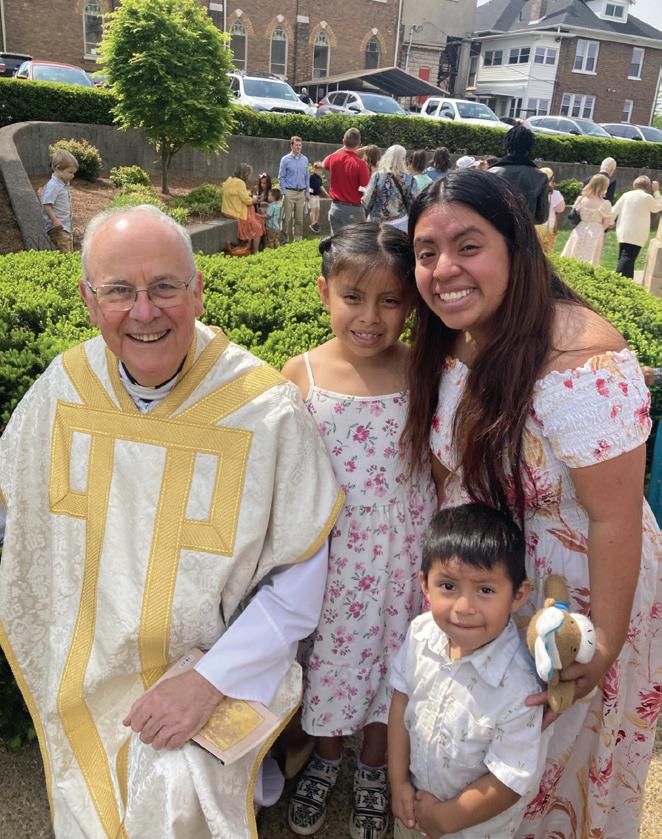
parishes served Lewis County, Perry County, Wayne County, and Hickman County.”
Father O’Neill was confident he would bounce back from his bout with COVID, but the illness had longer-range implications.
Concurrently, Father O’Neill was being called by God in another direction.
“I had not been feeling well, and I decided not to take my spring trip home (to Dublin). I went to Conception Abbey instead. When I was there on retreat, the abbot suddenly asked if I would consider being a spiritual director for the seminary. I was surprised and delighted. He asked me why I hadn’t mentioned it before, and I said I felt that it was something one should be asked to do rather than petition for it,” Father O’Neill said. “I
was very excited. I let Bishop Mark Spalding (of Nashville) know, and he asked me to get in touch with Father Andrew Bulso, who is the vicar for priests for the Diocese of Nashville.”
Father O’Neill said he and Bishop Spalding agreed that he would retire from active ministry in the Diocese of Nashville, which enabled him to accept the position at Conception Seminary
In the meantime, the one-time Diocese of Knoxville priest spent four months recuperating in Knoxville, where he slowly regained his strength and shed the symptoms of COVID. Diocese of Knoxville Bishop Mark Beckman gave his blessing to Father O’Neill to temporarily reside in Knoxville and celebrate Mass as he was able.
“What a treat. In the Diocese of Knoxville, my old home, a very kind, gracious family was able to offer me their home for peace and quiet very close to Holy Ghost Parish (in Knoxville), where I had served from 2002 to 2005. It was an amazing time. The first month was almost totally care and rest. I celebrated Mass at home and was given rides by attentive parishioners. The second month I began to pick up. I began to say more Masses and give homilies and check into things. I then realized that my time as an active priest was at an end and my time for retirement had arrived,” he explained. He entered into the decision cau-


people and how they get involved in the liturgies,” Mr. Feduccia said, speaking on the need for the youth
to be more involved. “Those in the older generation pass it on and raise up a new generation to find
tiously and deliberately and with full understanding of the impact on the three parishes in Middle Tennessee that he was pastoring.
“I’m terribly grateful to so many people. I’m grateful to Bishop Spalding for giving me his blessing; for the vicar general for the Diocese of Nashville, Father John Hammond, for arranging and writing the letter to the abbot about my transfer. Father Bulso was very attentive. And I will never forget the kindness of the priests who took it upon themselves to call me out of the blue. Their kindness I will remember for the rest of my life. Also, the Nashville Dominican Sisters, who are praying incessantly. And what a lovely sendoff from the three parishes and four counties,” Father O’Neill said.
He is looking forward to staying in the Conception monastery at the invitation of Abbot Benedict Neenan, OSB, who is chancellor of Conception and a professor. Father Victor Schinstock, OSB, is president and rector of Conception Seminary College.
“It is a very exciting idea to live the monastic routine and to enjoy their hospitality,” Father O’Neill noted. He will be serving as coordinator of spiritual formation for more than 60 seminarians at Conception, more than half of whom are new arrivals. In his new role, he will be coordinating students as they meet with their spiritual directors and overseeing retreats.
Father O’Neill said he will be working to close the age gap between him and the seminarians, which is 35-40 years. “I’m asking everyone to please pray for that.”
He still recalls attending Conception Seminary in the 1990s with future Diocese of Knoxville priests Father John Orr, pastor of Holy Ghost Parish; Father David Carter, rector of the Basilica of Sts. Peter and Paul in Chattanooga; and Father Brent Shelton, who has served at Holy Ghost, St. Francis of Assisi in Townsend, and St. Mary in Oak Ridge. He felt called to the priesthood after serving as a vascular surgeon in Ireland, England, and Pakistan. Now, the 68-year-old priest said the four months he spent in East Tennessee recovering was an oppor-
Conception continued on page A26
their home in the liturgy.”
Mr. Feduccia spoke about how the older generation is that example for the youth to teach them to understand just how important their role should be in liturgy because they will be that same example for the next generation.
“I don’t think there is anything like One Bread One Cup around the country,” Mr. Angrisano said when asked what is so unique about One Bread One Cup. “I think One Bread One Cup fills a need that nothing else does. Having it one week, then making it two weeks, then three weeks is a testament that it’s needed.”
Mr. Angrisano believes the conference is needed for Catholic youth all around the country.
The One Bread One Cup conference is fulfilling a need in the Church today to teach youth and adults the importance of the call God gives to each of them to get out of their pews each week and be an example of His light for the world
OBOC leaves a mark on the hearts of all who enter the conference. For the past 31 years it has been teaching and leading a new generation to step out and take initiative in the liturgies.
“You are changed for the better, and you are changed for good,” Mr. Feduccia said, summing up the effect One Bread One Cup has on all who encounter it.
For more information on One Bread One Cup, visit www.saint meinrad.edu/youth/summerconferences/. ■
Maggie Parsons has attended One Bread One Cup for four years and is applying to be an intern at the conference in summer 2026.
tall cocktail tables with just enough room for conversation. The 2009 hit song “New York” by Alicia Keys was playing, along with recordings by Maroon 5, Taylor Swift, and other songs the class probably remembered from their teenage days.
Now as adults, they returned to a school atrium adorned with balloons and lights, and a mysterious yet enchanting feeling settled in as they walked the halls again.
Mr. Mariani acknowledged he hasn’t seen too many of his former classmates since their belated graduation in June 2020, but there were a few friends he has kept up with who he was looking forward to seeing.
As much as the class was saddened to miss the prom, the countdown, and other senior traditions, the students came to terms with the fact the school’s doors had to close. It wasn’t an option; it was a necessity.
The COVID pandemic claimed more than 300,000 lives in the United States from March to December 2020. Of those, 6,907 deaths occurred in Tennessee, according to the Tennessee Department of Health’s annual report for 2020.
Globally, everyone had to endure some sort of change to their traditions and day-to-day lives. Many began to work from home, order groceries online, limit outings to necessities only, and even streamed Mass rather than attending in person.
Although many, if not most, public schools closed for the school year in March 2020 when public-health experts warned of expanding coronavirus infections, the Diocese of Knoxville’s 10 schools continued teaching students via distance-learning programs, where students were taught at their homes using Internetbased teaching tools.
The adjustments that were made weren’t easy, but there is a benefit to the alterations: people became truly aware of how special those around them are. For a moment, taking each other for granted ceased, and people began to see how the little things are blessings that are often overlooked or quickly forgotten. People learned how vital it is to be together, even if it's over a Zoom call.
They learned how memories matter, and they understood why they matter. Parents leaned into those special moments with their children: a baby’s first laugh, or when they received their “big kid bed.” And there was the sense of relief and pride at seeing the 2020 class finally walking across the stage on June 27, more than a month later than originally scheduled.
“You’ve got to see what’s going on in your situation and see how you can make the best out of it. Because you never know; you might miss out on that opportunity for the future,” Mr. Mariani shared.
Before the school’s doors closed in 2020, there was no plan for something like the pandemic.
“At first, they extended our spring break, then they announced we’d be moving everything online,” Mr. Mariani recalled.
He laughs as he remembers what he felt then. At first, he was excited to “play video games at home, but it gets old pretty quickly.”
During the 2020 quarantine period, people everywhere felt extremely isolated, which left a negative impact. Teens were no exception.
So, when the school doors closed and classes moved online, many felt a new isolation they’d never faced before. The generation that grew up online desperately sought to be offline again. For the classes after 2020, there was hope that maybe things would be normal during their senior year.
“The idea for ‘Better Late Than Never Prom’ came about as we were brainstorming ways to help support five-year reunions. In 2020, the usual activities and events surrounding the excitement of graduation came to an abrupt halt, including prom. We thought it would be a great time to do something special for the class of 2020,” said Keely Anderson.
Back to School Across East Tennessee
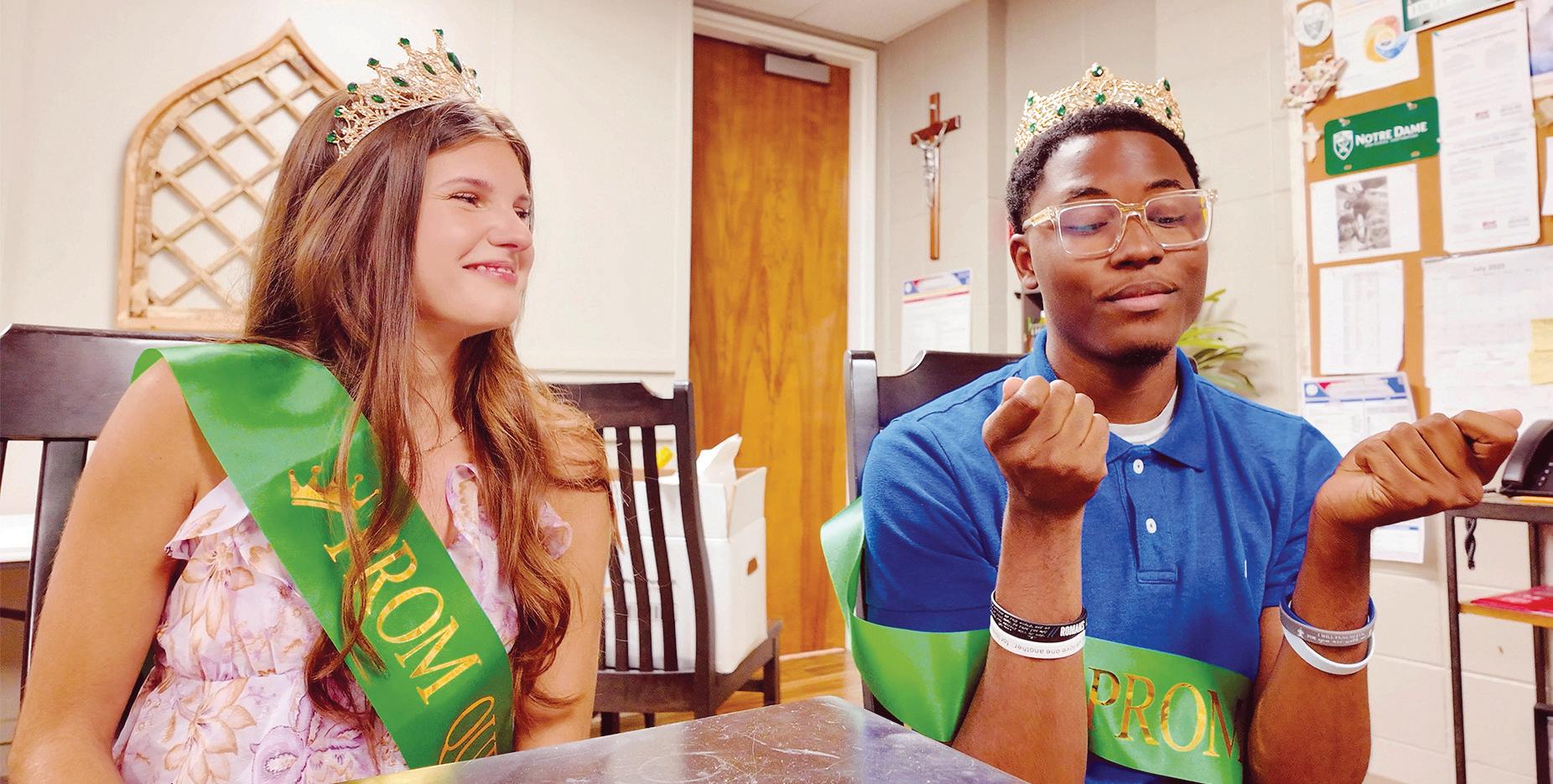
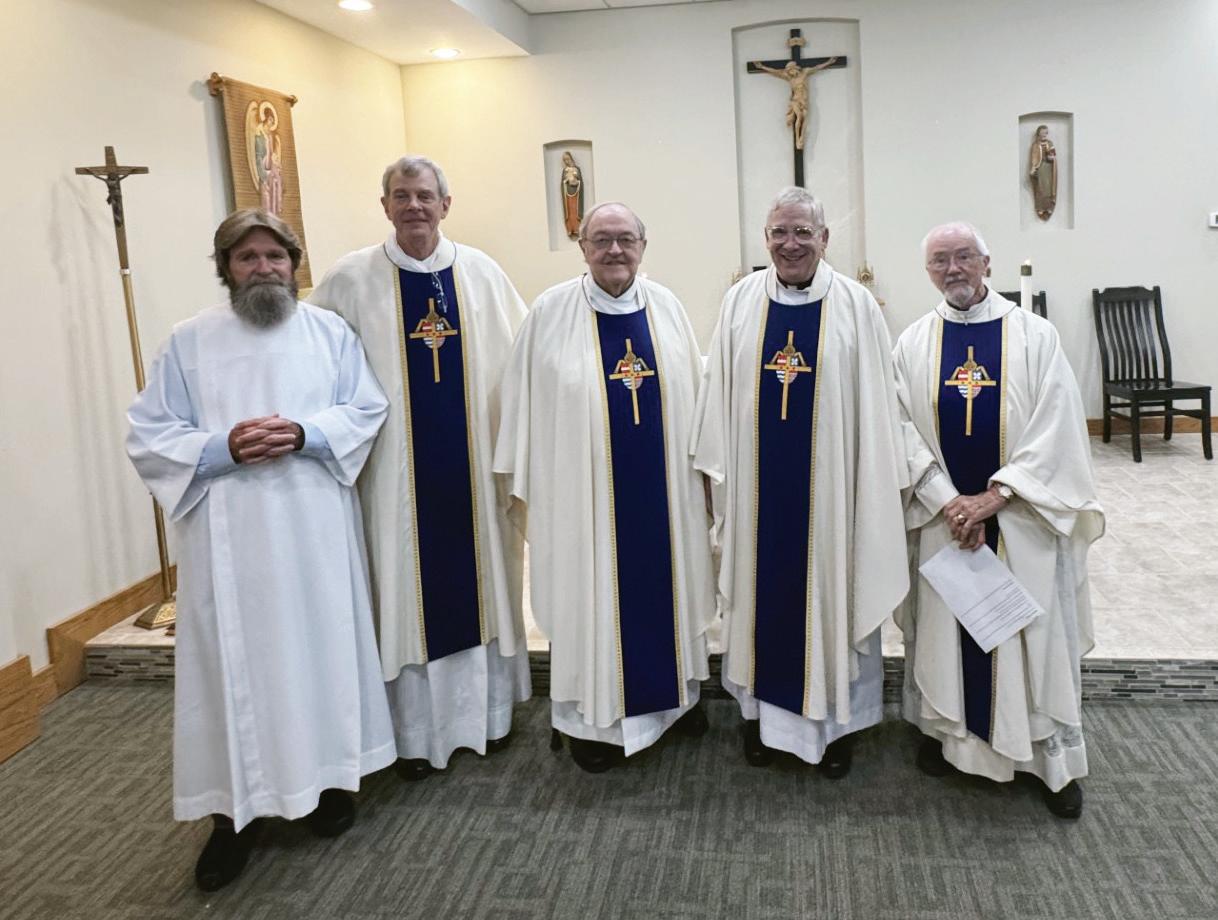

Ms. Anderson is the director of advancement and alumni affairs for Notre Dame. She was born into the Notre Dame family as her father is an alumnus of the class of 1969. She graduated in 1998 and recently returned.
“We hosted a get-together (prom) right before the All Class Bash so this group could meet and tour campus alongside our class of 2015 alumni who were celebrating their 10-year (reunion), and then gather together with classes from all eras,” Ms. Anderson explained.
In the spirit of tradition, organizers decided to have a prom king and queen for the class of 2020 as well. Sloan Burgess won the queen title by playing trivia. In 2020, she was named a superlative as the “Wittiest” along with another student. Tony Bonner was named prom king. He also holds a superlative title from 2020 as “Most Talented.”
Ms. Burgess and Mr. Bonner explained how, normally, the school would go through a voting process where teachers nominated a group of students, then a school-wide vote would take place. The winners would be named Mr. and Ms. Notre Dame at the prom and given a special spotlight dance.
Neither Ms. Burgess nor Mr. Bonner expected to take home the crowns. Ms. Burgess laughed, saying, “I guess I’m just good at trivia.” Mr. Bonner explained that back in 2020 he'd never planned on attending the prom but wanted to attend this one because it was special in a different way.
Mr. Mariani shared how gradu-
connections as I could before our time was up,” she reflected.
The special prom moment was nestled into the busy alumni weekend hosted by NDHS. Alumni weekend festivities were also held at the WindStone Golf Club in Ringgold, Ga. The weekend started bright and early at 8:30 a.m. with the 40th annual Irish Classic golf tournament. Following the golf tournament was the Green and White football game held at the Chattanooga school’s Jim Eberle Field. The scrimmage attracted many fans and alumni.
NDHS alumnus and Philadelphia Eagles linebacker Patrick Johnson returned to Chattanooga in May to assist with the school’s football practice. This had many fans eager to see how the team’s energy had risen since the camp.
The athlete who is entering his fourth season in the NFL got his start at the Chattanooga high school before graduating in 2017 and heading to Tulane University in New Orleans on a football scholarship.
Mr. Johnson was a seventh-round draft pick by the Eagles, a team he played for from 2021 to 2024. He played most of the 2024 season with the New York Giants and is returning to the Eagles for 2025. In June, Mr. Johnson hosted the free Patrick Johnson Youth Football Camp at Notre Dame High School for boys and girls aged 9 to 14 in the Chattanooga area.
ation at Notre Dame was different in 2020. The event, which was previously held in McKenzie Arena on the University of TennesseeChattanooga campus, was moved to the high school’s football field to allow for masks and social distancing.
“I still feel like we had a really great graduation ceremony. It was very memorable,” Mr. Mariani said. Traditionally, the seniors would gather for a countdown before graduation.
Mr. Bonner and Ms. Burgess laughed as they remembered their class coming together despite the school’s instructions to refrain from contact.
“Now, that wasn't like school-issued. They were kind of advising against that. But the graduation part of it was good,” Ms. Burgess said.
Mr. Bonner recalled a special celebration he had for graduating high school.
“It was a Sunday. That's when my mom was cooking every Sunday. I missed that because of the pandemic. I just heard a bunch of beep, beeps (car horns)! And there’s people coming down my neighborhood, stopping in front of my house. They gave me some cards and said congrats,” he recalled.
Unable to guess what the future beyond 2020 held, Ms. Burgess remembers buying a dress for the prom. She claims it is “the prettiest dress I’d ever laid eyes on.” It still hangs in her closet today as a bittersweet relic
“One of my good high-school friends, Jenny, she's here. And we kind of planned to go together no matter what. We made a pact that we were going to go,” Ms. Burgess shared with a smile as she thought of her friend.
She noted that during her time at NDHS, she was part of the cheerleading team. She was hoping to see some of her fellow cheerleaders there
“I saw them more than my own family during the school year, you know? So, it would have been nice to see some of them, try to show out, and have some school spirit like we used to,” she remarked.
Ms. Burgess remembered how she reacted when she first heard about COVID.
“So, I felt like I rushed to, you know, the ones that I love closest to me and really tried to make as many
Following the Class of 2020 Prom was the All Class Bash hosted in the Varallo Athletic Center. This event was a celebration of all alumni classes. The weekend continued through Saturday, July 19, with an all-alumni Mass in the NDHS Alumni Chapel and then the Golden Grads Brunch held at the high school.
Father Joe McMahon, pastor of Holy Family Parish in Nashville, served as the Mass celebrant. Concelebrants were Monsignor Mike Johnston of the Diocese of Nashville and Monsignor Al Humbrecht, pastor of Holy Spirit Parish in SoddyDaisy. Deacon Hicks Armor assisted at the Mass.
Mr. Bonner shared how returning to school after graduation rekindled emotions.
“It was a very strange experience, but it was nice to see. It’s quite a few memories that are popping up. I remember theater; I did theater. I did a talent show,” he said.
Both Ms. Burgess and Mr. Bonner smiled at the memory of choir with former band and choir director Jeff McIntosh.
The prom queen and king expressed hope that in 10 years or more they will be attending another Notre Dame High School class reunion.
“Hopefully, 10 years from now I'm a dad. I'm a husband, a good husband,” Mr. Bonner said. He also shared the reason he decided to attend the prom five years later, despite having no plans to attend in 2020 before its cancellation.
“I just feel like I didn't have closure from it, you know, because of COVID. I mean, we were shut down, and we didn't actually step on campus until they prompted us to turn in textbooks. And then back for graduation, that was it,” he said.
Ms. Anderson said the school hopes to bring all alumni classes together to “foster the same passion of reuniting that our alumni have with our new generations of graduates.”
Whether it be Thanksgiving dinner or prom night, special traditions are important. They serve as rites of passage and checkpoints in history, and they bring lasting memories that deliver joy upon reflection.
Schools like Notre Dame High School also create special connections as seen with Ms. Burgess and her fellow cheerleaders, Ms. Anderson and her father, and how Mr. Bonner hopes to have his own family connections someday.
High-school moments like the first day of freshman year, the excitement of prom night, and making those final steps across the graduation stage create an ever-growing family tree
alumni. ■
at it and actually have to pass the rules that go into the specifics on how to carry out the law.”
Those working on the process had to hit certain benchmarks to keep the scholarship program on time to meet its deadline.
“At the same time, you have to communicate with schools that might want to participate and tell them in order to participate you have to be a Category I, II, or III school, and this is what you need to do, and at the same time, you set up a website for people to see frequently asked questions. So, you collect the e-mails of people who are interested,” he explained. “Then, you have schools that might schedule a night to instruct parents on what the program is and how you can take advantage of it. Then, you must have vendors who assist with the application process, the computer experts who set it up so that you don’t have glitches or something doesn’t crash,” he said.
Private schools in categories one through three are approved by the state or are accredited by a staterecognized accreditation agency, or are affiliated with an organization approved by the state.
When the big day arrived, at 1 p.m. EDT on May 15 the system was put to the test.
Reports of parents hunkering down over their computers and electronic devices for an hour or more waiting for the TEFS system to go live were widespread, as were reports of applicants who shared on social media that they had been approved, turned down, or placed on a waiting list.
“It was so popular, even though there were only 20,000 scholarships available, over 40,000 applications were turned in,” Mr. Dunn said, expressing some surprise at the strong demand.
“The system didn’t crash and there weren’t any glitches that couldn’t be fixed right there. It was all hands on deck. When the applications started coming in, people had to check them. The system was set up so that each application was looked at by two people who would have to agree that the applicant met the criteria. That took a lot when you consider that we had 40,000 applications and each one had to be looked at twice. It really was something to watch,” Mr. Dunn said.
“It was very rewarding to me that on the day the application process went live I was in the command room and watched the numbers start coming in. They were looking at responses from ZIP codes around the state, how many people were in the waiting room, determining how long it took someone to fill out an application, and those kinds of things. I sat in the corner. I didn’t want to get in the way of the people who were making this happen. I just watched the reality come about and saw how many people were excited about the opportunity to
continued from page A5
state can access scholarships.
Back to School Across East Tennessee

Making it official Gov. Bill Lee signs the Tennessee Education Freedom Act into law on Feb. 12 at the state capitol in Nashville. Joining Gov. Lee for the signing, which makes school choice the law of the land, were students from St. Edward School, St. Henry School, Holy Rosary Academy, and St. Pius X Classical Academy in the Diocese of Nashville.
put their kids in the best position to achieve,” he added.
The application process closed on June 13. Parents began receiving positive or negative notifications soon after the system went live and those notifications continued through the summer.
In Mr. Dunn’s estimation, the process has gone “remarkably smoothly.”
“You will always have a few people who will have a complaint about this or that, but it has gone very smoothly. The people I have talked to say the communication is there and the instruction is there. Those who followed what they were supposed to do and what the rules called for, they didn’t have a problem. You do feel sorry for those who applied, and we just ran out of scholarships for them,” he shared.
“This year, because it was the first year and the timeline was so short between the passage of the bill and implementing it, it was whoever gets their application in first comes to the front of the line. Going forward, if you received the scholarship before, then you will be at the top of the list to get it again. You still have to apply, but you will be at the top of the list. It will be done differently going forward than it was this first year,” he added.
Mr. Dunn was gratified to see so many people from different parts of government work together to make school choice a reality.
“Commissioner (Lizzette) Reynolds, she is over the Department of Education. So, it was her team that helped get it across the finish line. But more importantly, she and her team helped flesh it out, to make it so it actually works, so that there was an application online, so that they were looked at, so that there was communication between people. From a political standpoint, it made all the difference that the speaker of the House and the speaker of the Senate were behind this, and they talked to their members about how important this was for Tennessee and for our future,” he noted.
Moving forward
Mr. Dunn said the state already
For example, my own state of New Jersey currently has no state-level private school choice program. This new federal law could, for the first time, bring new resources to the children and families who wish to attend Catholic schools in the state of New Jersey.
In New Jersey’s Diocese of Trenton alone, we have tens of thousands of students who could benefit from such scholarships, and nearly 40 Catholic elementary and secondary schools to serve them.
Lawmakers have the power to unlock millions of dollars in new education funding for students without adding a single dime to their budget or shifting any funding away from public education. Ensuring that our religious liberty and private school autonomy are respected also remains an area where Church leaders, parents, and legislators must be particularly vigilant.
Canon law is crystal clear that Catholic schools must be centered on the principles of Catholic doctrine. Our Catholic identity is too important to ever jeopardize. Promoting the urgency of affirming our rights to religious freedom and autonomy
program, the state continues to emphasize public education. He pointed to the fact that the state legislature has been putting money into public schools and has come up with programs that have led to improvements in student achievement.
And he noted that Tennessee is moving forward in student achievement while other states are falling behind, which hasn’t always been the case.
is looking ahead to the 2026 scholarship process.
And based on the overwhelming response in the initial year, he is hopeful the program will expand as the new law calls for.
“The law has a trigger that you can increase the number of scholarships if there is enough interest. And there is definitely enough interest. But next year’s budget would have to reflect that increase. It’s not a done deal, but if the House and the Senate agree, then they can expand the number,” Mr. Dunn explained.
According to the Tennessee Education Freedom Act, if 85 percent or more of the available scholarships are awarded in the first year, 5,000 additional scholarships may be made available in the second year
“So, obviously the number of scholarships can increase from 20,000 to 25,000, but you are still 15,000 short based on the number of applications,” Mr. Dunn said, remarking that it will be interesting to see how lawmakers address the demand for scholarships during the 2026 legislative session.
When asked what the high demand for scholarships tells him, Mr. Dunn said, “There are a lot of people who were struggling in order to have their kids go to the school of their choice. This was a way to relieve that burden.”
He pointed to the fact that many Catholic schools already have financial pressures in accommodating students whose families can’t afford full tuition, but they remain dedicated to providing a Catholic education. “They have to make sure every Catholic child will get a Catholic education whether they can afford it or not.”
Tennessee Education Freedom scholarships can relieve much of that burden, according to TEFS supporters.
While Mr. Dunn said he could not predict whether the General Assembly will expand the number of scholarships beyond 20,000, he did say “the vision of the governor and others is that every family will have a choice eventually.”
He shared that while much attention has been placed on implementing the new school-choice
is a crucial priority of the bishops’ conference during the rulemaking process.
Supporting parental choice
The USCCB has made clear that the Catholic community has a responsibility to support parental choice in education. For years, state Catholic conferences and the Catholic laity have been deeply and tirelessly engaged at the state and federal level promoting laws that empower parents and strengthen communities—and I applaud these efforts.
As a result of this work, more than 1.3 million children across the country are benefiting from school choice today. As bishops, we have a particular responsibility to promote policies that support families in their choice of education. Canon law says that, as pastors of souls, bishops have a special duty to do all they can to make sure the faithful can avail themselves of a Catholic education.
As a lifelong educator, I believe deeply in the value of a rich, authentic Catholic education, and as the chairman of the USCCB’s Committee on Catholic Education, it is my responsibility to encourage my brother bishops to promote policies that sup-
“When I started in the legislature, Tennessee was at or near the bottom. We have moved so far up through the rankings in achievement that other states are looking to see what Tennessee has done. If you are focused on kids instead of adults, you want them to succeed wherever they are, whether public school or private school. We are not going to leave any kids behind. We’re going to make sure each one gets the education they deserve,” he noted.
School choice: the early years
Mr. Dunn, who is 64, is a longtime parishioner in the Diocese of Knoxville. He and his wife, Stacy, have five children and nine grandchildren. He attended St. Joseph School and Knoxville Catholic High School before going to the University of Tennessee-Knoxville, where he earned a bachelor’s degree in animal science and a master’s degree in extension education. After serving with 4-H, he went to work for a Knoxville arborist, where he was able to pursue his political interests.
He recalls his first race to represent state House District 16 in 1993 and noted that his campaign literature then said “school choice for everyone.”
“I was so sold on it because it made so much sense. On this issue, it was nice to know that this was the right thing to do. Issues where it is hard to figure out what is the right thing to do, that’s where you struggle. But once I figured out on an issue that this is the right thing to do, it made it easy. I stuck with this. And every time someone ran against me, they made it an issue. But I always received like 70 percent of the vote. That let me know that people believed in what I was saying,” Mr. Dunn said.
Mr. and Mrs. Dunn were so sold on it that they made school choice a family practice in the early years of their marriage some 40 years ago. They homeschooled their children until they reached an age where the Dunns enrolled them at St. Joseph School and then on to Knoxville Catholic High School.
“We saw with educational choice that you pick what you think is best for your child at that time. We could see it and we lived it,” he said.
The road to school choice has been a bumpy one for Mr. Dunn. Despite promoting it in the legislature for years, there was little appetite for it among lawmakers until recently.
Dunn continued on page A20
port parents in their liberty to pursue the education of their choice for their children—but particularly a Catholic education in a Catholic school
The new federal law offers the chance to unlock educational opportunities for millions of children across the country—but there is still more work to be done.
Over the next several months, state Catholic conferences, parents, pastors, school leaders, and all the Catholic faithful will have a special role to play to ensure that the law benefits the greatest number of children possible.
President John F. Kennedy once remarked, “Children are the world’s most valuable resource and its best hope for the future.” We owe it to them to provide them with the best education possible.
I urge the Catholic faithful to continue to pray for parents and to support their efforts to fulfill their God-given right and obligation to direct their children’s education and for our elected leaders that they affirm the same. ■
Back to School Across East Tennessee
Sister Jolita ’s legacy
St. Joseph School establishing endowment to honor beloved educator
By Bill Brewer
Sister Jolita still has a powerful presence within the St. Joseph School community even as the Knoxville elementary school makes plans for the anniversary of her death.
The community is making sure her last request continues to be honored for many anniversaries to come. Sister Jolita’s dying wish was to help St. Joseph School, according to principal Andy Zengel, and that’s just what she will still be doing when an endowment in her name is established early next year to coincide with the anniversary.
“This coming February 2026 will be the 25th anniversary of the death of Sister Jolita. For the past 24 years, the family of Sister Jolita, especially Therese and Pat Hurley and Mary Catherine Willard, who is now deceased, and their large extended family from all over the nation have come to St. Joseph School to prepare a fundraiser that would honor the memory of their sister, Sister Jolita, for the purpose of helping students in financial need at St. Joseph,” Mr. Zengel said.
Sister Mary Jolita Hughes, RSM, was born in 1935 and died in 2001. The Sister of Mercy taught at St. Joseph School from 1994-2000 as well as in earlier stints from 1969-72 and 1988-89. She served in elementary education with stops across the state for more than 40 years, also becoming principal at St. Mary School in Johnson City from 1986-87 and 1989-94 and principal at St. Dominic School in Kingsport from 1976-78. She taught at the old St. Mary School at Immaculate Conception Church in downtown Knoxville from 1964-67 and at Sacred Heart School in Knoxville from 1978-86.
Father Chris Michelson, president of St. Joseph School, said Sister Jolita’s wishes specifically were to make sure no student would be denied any opportunity that was available to other students, such as lunches, field trips, tutoring, speech therapy, etc.
Dunn continued from page A19
Mr. Dunn remarked that Gov. Bill Haslam, who served as Tennessee’s chief executive from 201119, wanted universal school choice but was unsuccessful in getting the legislation passed in the General Assembly.
“Gov. Haslam had looked at the program and how it had worked in other states. He decided that Tennessee needed this. So, he put it out there. I carried it in the House. He had a somewhat limited program, and the Senate wanted to go bigger. It ended up not going anywhere. I always thought that if the Senate had just gone along with the original idea, look at how much farther down the road we would have been,” Mr. Dunn said.
“We tried it again later in the Haslam administration, and it came up two or three votes short in the House. Then, when Gov. Lee took office in 2019, he was very passionate about it because he had helped a young man who had really been struggling and failing in his education situation. Before he was governor, Gov. Lee helped the young man go to a different school, and it made all the difference. When he saw that in real life, what it can mean for someone to pick the school that is the best fit, that is why he is so passionate about it,” he explained. Support for school choice began to grow in the legislature, and there was enough backing to launch an introductory program in Chattanooga, Nashville, and Memphis in 2022. The movement was picking up steam in Tennessee finally, and it was about

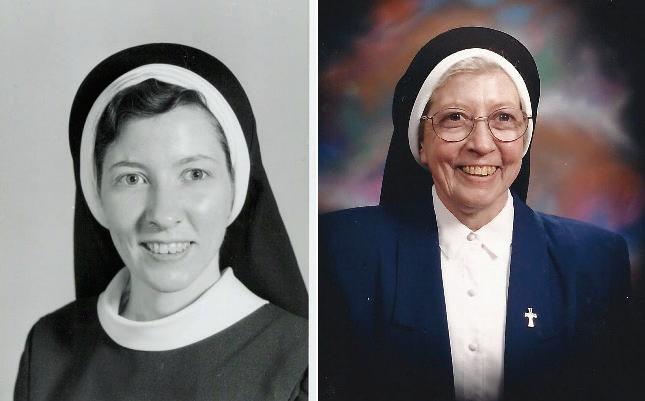
“All of those who were students of hers or coworkers of hers would say that was the kind of person she was. She would stay after school to tutor a child or she would make sure a student had money for a field trip out of her own pocket. This is a way to honor the mission of Catholic education that she held so dear,” Mr. Zengel said.
Following Sister Jolita’s death, Mrs. Hurley and Mrs. Willard, who are her sisters, started the Sister Jolita Supper & Sing-Along at St. Joseph School as a way to honor her and her dying wish.
The Sister Jolita Supper & SingAlong was held annually from 2002
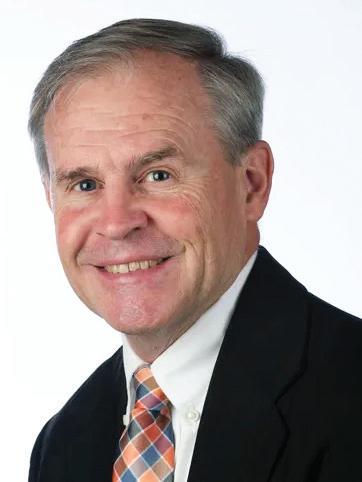
" The studies show that when you have a robust school-choice program, everybody benefits. The public schools improve immensely. ... Tennessee is in a great spot right now. There is always the chance that those who put adults first will put pressure on legislators, and they will go back to the bad old days as I call them."
Bill Dunn,
senior adviser to Gov. Bill Lee and former state representative
time, according to Mr. Dunn.
“School choice is not a new thing. It has been around for a long time. We’ve had the G.I. Bill. We’ve had Pell Grants. We have the HOPE Scholarship. Now, those are all at the higher-education level, but it’s the exact same principle. It’s where you take public dollars and you give them to the family (and the students) and they pick the best fit for their child. So, basically we’re doing what we’ve been doing in higher education for decades and saying let’s do it in K through 12. It’s been wildly successful in higher ed. I imagine it will be the same in K through 12,” Mr. Dunn said.
“What we’ve learned through studies is that when parents have choice, everyone improves. Whether they are public schools or private schools, they up their game because they realize they don’t have a monopoly anymore. They are going to have to perform and have academic excellence,” he added. “It takes leadership and passion to pass something as big and meaningful as this. Gov. Lee, Commissioner Reynolds, House speaker Cameron Sexton, and Senate speaker Randy McNally were all instrumental in putting the time and energy and passion into passing this legislation.”
through 2024 in the St. Joseph gymnasium. It always coincided with St. Patrick’s Day since Sister Jolita was so proud of her Irish heritage. The event never missed a year, including during the COVID pandemic. That year, in 2021, the event was a drivethrough barbecue/takeout supper, where cars picked up their meals in the school parking lot and the auction that was part of the event was held online.
It has been part of a series of successful development activities that St. Joseph sponsors to raise money for the school. Other activities include a Mardi Gras celebration, a raffle and online auction, and a golf tournament.
The supper and sing-along grew every year and so did its impact. The Willard and Hurley families would prepare food for the Irish supper in the St. Joseph cafeteria and make enough to serve hundreds of adults and children. And volunteers mostly Sister Jolita devotees would chip in to help make the event work.
However, a decision was made to suspend the annual supper and singalong this year when Mrs. Willard passed away Feb. 16 at the age of 90.
“Right about the time of the Sister Jolita event, Mary Catherine took a turn for the worse. In a way, it was a blessing for the family to focus on her,” Mr. Zengel recalled. “It had become a real family event that people looked forward to coming to, not just the family that organized it the Hurleys, the Willards, and all their extended family but people who have been Sister Jolita’s students and coworkers would come. It’s also been a kind of Holy Ghost Parish and Immaculate Conception Parish event together.”
And while the Irish supper was gone, it was not forgotten. St. Joseph’s principal shared that awareness grew over the years of the fundraiser’s impact in helping students. “We are extremely grateful to those families who have supported the event through the years, and now we are moving on to the next
noted.
As he looks to the future, Mr. Dunn believes Tennessee can and should continue to make advancements in education. But he warned that the state also can move backward.
Mr. Dunn addressed the concerns of those opposed to universal school choice, who have cited worries about funding being diverted from public schools to private schools.
State officials have said money appropriated for public education will not shift to private schools. Funds for the Tennessee Education Freedom Scholarships come from a one-time appropriation of $144.2 million in general revenue funds. Each student approved for the program will receive $7,295 in the first year.
“It (school choice) puts the power with the parents. And parents know their child better than anyone. So, they can look at a school, and if it’s just not a good fit for whatever reason, then they can find where their child needs to be. Society benefits. Every child who gets in a better environment and grows that much more and attains that much more, in the end that’s a plus for everybody in society,” Mr. Dunn said.
“The studies clearly show that when you have a robust schoolchoice program, everybody benefits. The public schools improve immensely. Florida is a perfect example. When it went schoolchoice statewide, you saw the public schools improve radically,” he
“Tennessee is in a great spot right now. There is always the chance that those who put adults first will put pressure on legislators, and they will go back to the bad old days as I call them. We’ve seen that in some other states, where they have pulled back from what they were doing. I predict in five or six years, we will see those states really suffering when it’s time to rank how states are doing,” he said.
He acknowledges that changes in the General Assembly could bring about an end to school choice in Tennessee.
“That could happen. But once people taste freedom, they don’t want to give it up. There will be a lot of people who taste freedom, and they will talk to others and say how wonderful it’s been for their family and for their children. So, I think it will be very hard to go back. Also, it’s harder to pass a bill than defeat a bill. For someone to do away with school choice, they would have to pass a bill. I don’t see that happening in the near future,” he said.
While there is a sense of fulfillment in finally seeing one of the campaign issues closest to his heart for more than 30 years become the law of the land, Mr. Dunn is focused on the bigger picture.
“The emotion really comes from knowing it’s going to make a difference in a kid’s life,” he said. ■
their separate work groups, which include people from the eight churches that traveled from all around the country to Knoxville, and serve people from all walks of life. The groups head to their work sites, which vary in need and location around the city, starting on Monday. They make progress until the final day of work on Thursday. Their results show how working as a team for the greater good can help people.
“Everyone on the team is important. Everyone on the team has a job. And everyone has to work together to achieve those things,” Ms. Nassis said as she spoke on the importance of the camp’s teamwork, a reminder of how God wants the faithful to work together and grow for a greater purpose
“My favorite thing was helping out the residents, learning all the new faces, all the new names. It is one of the best experiences I’ve ever had,” said James Mickey, a camper traveling from Wisconsin, who talked about how he enjoys helping out the residents in the community when asked what his favorite part of the camp was
The work sites included the Ladies of Charity, Knoxville Area Rescue Ministries stores, building a wheelchair ramp for a diocese parishioner, and Samaritan Place senior shelter. There were over 50 work sites and clients who were helped during the camp week.
During the week, the campers get experiences to deepen their faith with Christ not only by helping God’s people but by making sacrifices, participating in the liturgies and sacraments, and encountering their brothers and sisters to build each other up while growing closer to the Lord Catholic Heart Workcamp is helping the Catholic campers and organiz-
chapter of this mission to honor her memory and also keep that mission alive.”
“Sister Jolita’s supper event every year would provide revenue that we could then use to help students in that situation. Through her sisters, Therese and of course Mary Catherine, the matriarch of the Catholic community here in Knoxville who went home to Jesus just this past year, it became time now for a new way to preserve Sister’s memory and also continue that mission of the fund. We are at the place now where we can create an endowment that in perpetuity we can have that fund that honors her memory,” Mr. Zengel said.
The St. Joseph principal explained that the annual Mardi Gras celebration at St. Joseph is more of an auction event for adults and the Sister Jolita Supper & Sing-Along was a family event where kids could come as well.
Father Michelson said that the endowment will be administered through the Diocese of Knoxville, noting that it is being set up now with the hope that it will be in place by February.
“We are very blessed. We took the proceeds from the Sister Jolita events last year, proceeds from the raffle, money from Mardi Gras, the Sister Jolita Supper & Sing-Along to get it started. We have $55,000 that we’re going to put in to get it going. That is Phase I. In Phase II, we really want to start working with people on legacy gifts that people can leave. Legacy gifts are near and dear to people’s hearts,” Father Michelson said.
St. Joseph enrollment for the 202526 academic year is 245, up from last year. The school has 25 full-time and part-time teachers, with a total staff of 40. “The kids who come from families who are not as financially blessed as other families, so that they are never left out, that will be our mission. The goal over the next few years is to hopefully raise the endowment to hundreds of thousands of dollars, and hopefully someday to $1 million to be able to help the kids here. That will be through legacy gifts. That’s what our goal is,” Father Michelson said.
Mr. Zengel cited examples of the impact Sister Jolita festival funds have had on St. Joseph students. He said there are field trips that require
Back to School Across East Tennessee

ers around the country be able to recognize and understand the blessings they have back home. Helping those who are not as fortunate helps them take a step back to see the reality of the world around them, how they should use the blessings they have received, and be that light of Christ for those who feel like they live in darkness.
“Taking numerous amount of youth and bring them into the area and showing them what we need to appreciate having at home,” said Deb Braden, an adult participant and chaperone for one of the attending youth groups
Ms. Braden spoke on the joy it is to bring such a large number of youth who want to leave the comfort of their homes to help those who may not be as fortunate as them
“The camp does such a great job of seeing the community by bonding here and growing in your faith while on base (in Knoxville) but also seeing what is actually in the world and the areas that need help.” Ms. Braden said, talking about how the camp
opens the campers’ eyes to the reality of the world.
“I love the sense of community that is brought through Catholicism and how beautiful it is when we are all in worship together at night, every teenager in there is worshiping God and praising Him,” Kate said, speaking about her point of view of the camp and how it is not just a community but one that is rooted in the founding of the faith.
“It is just incredible to see a group of young people actually work towards a common goal and want to help people outside of being told to do something,” Kate remarked, noting what a joy it is to have a group of people, especially in her generation, that have a willingness to help others
Like any camp, Catholic Heart Workcamp’s mission is to not only help the campers see the needs of the world, but also to have that grow into something deeper that will stick with them so they don’t just leave it behind. They will carry that with them

fees to go on that not every child is able to pay.
“When we have a field trip, you send out how much it is for the bus fee and the lunches that are provided. Anytime there is money that is not collected, we know the Sister Jolita money is there to kick in for the remainder,” he said.
Father Michelson added, “There is no one who is not going to be able to go to Norris Dam or Wesley Woods because they don’t have the ability to pay.”
Mr. Zengel pointed to another need that often arises for students, which is speech therapy services, and that often families will not have insurance coverage for that.
“If the staff here deems that those services are needed for a student to progress, the Sister Jolita fund will cover the cost. And we often provide those services in-house, and we will pay for it through the fund so the children will get what they need,” he shared. “At the end of the year, we always have unpaid cafeteria balances. We work with families to make sure that doesn’t happen. But a lot of times it’s when a parent has lost a job or similar circumstances. At the end of the year, if a family can’t do it, the Sister Jolita fund will kick in to cover those costs.”
He explained that while there was no Sister Jolita Supper & Sing-Along in 2025, there was an existing raffle that had been diocesan-wide but is now a St. Joseph-only event. “So, we named that the Sister Jolita Raffle to take the fundraising burden off of the supper and sing-along.”
for the rest of their lives
“Groups will go back home and start giving to their community, going to serve. It energizes people and motivates them to take more action at home,” Ms. Nassis said when asked how the participants of the camp live out the mission and are on fire for the Lord.
On the last full day of the camp, when the campers are finishing up their work-site projects and getting to see the progress they have made, the residents, those who the campers helped, get a chance to speak and discuss what the week meant to them.
“It’s neat to see the community come together and be a witness to what it has meant to those we have served,” said Ms. Nassis, citing another example of how important a community is and how it can continue to expand, changing the lives built around it.
The campers of the Catholic Heart Workcamp got to be involved in a unique experience, taking a leap of faith for the greater good. Each camper takes a step and says yes to God and makes sacrifices to help people in need. Traveling to a place they may have never been, sleeping on air mattresses, showering in locker rooms, and volunteering for people they have never met, the camp week is a journey, but it’s a rewarding journey shared by others encountered along the way.
In just four short days, Catholic Heart Workcamp united participants from all around the country representing eight churches across six states to serve more than 50 residents with more than 7,000 hours of community service. They began as a mission and developed into a community united in service and taking action through love, all for the will of God. ■
cipal of the elementary school in 2014.
“I never got to meet Sister Jolita myself. She passed away before I was even living in Knoxville. The first time I heard about her was because we shared a love of the Notre Dame Fighting Irish. That was my first spiritual connection with her. All the stories I’ve heard about her are that she was fun and she cared,” Mr. Zengel said, noting that he is a graduate of the University of Notre Dame.
Father Michelson and Mr. Zengel are grateful to Sister Jolita’s family for keeping her legacy alive, for seeing to it that her dying wish has come true.
“Sister Jolita lives today not only because of the way she lived her life but also because Therese Hurley and Mary Catherine Willard would not let her memory die,” Father Michelson said.
The St. Joseph Mardi Gras will continue and will have certain auction items earmarked for the Sister Jolita endowment.
Father Michelson and Mr. Zengel were amazed at how the Sister Jolita festivity made money year over year despite challenges in some years.
“Over the last 13 years of the Sister Jolita event, in 2012 it brought in $11,405. In 2024, the last year it was held, it brought in $38,015. How it grew over the years was phenomenal,” Father Michelson said.
He was equally amazed that the Sister Jolita fund was never depleted. There always was money in it and it always seemed to grow.
“I expected the year to end with a major deficit. But it seemed to always cover the need,” Father Michelson noted.
“The need was always met,” Mr. Zengel added, pointing out that during the COVID year, people continued to give because they cared.
“A year later, we had six inches of snow on the Saturday of the Sister Jolita event. So, we talked to parishes and said we are going to move it to Sunday, hopefully it will be clear. People still came, and it still had a great impact,” the principal said.
To illustrate the event’s impact, Father Michelson said the year before COVID, 2020, it brought in $23,400. The year of COVID, 2021, it brought in $26,400. “So, it brought in even more not having the full event, which also is unheard of. People still gave,” he said.
Mr. Zengel began teaching at St. Joseph in 2005 and was named prin-
“We want to express our gratitude to the Hughes family, the Hurley family, and the Willard family,” added Mr. Zengel. “The mission of a Catholic school is to make Catholic education available to any Catholic family who desires it. It’s almost a mandate that you have to make it available for those who can’t afford it. We have a tuition-assistance fund, and the vouchers are a game-changer for a lot of families to make it affordable. But things like the Sister Jolita Endowment and other endowment streams that come in make it so we can say yes to those families.”
The school has other endowments: the St. Joseph School Endowment that was established many years ago and has $400,000 in it. Proceeds from that fund are used to help cover the costs of general operations. There also is the Jenny Belyeu Morris Fund that was established about a dozen years ago to fund graduation gifts for eighth-graders who are moving on to high school. The Croes family also established a fund for St. Joseph School.
The Sister Mary Jolita Hughes Endowment is a welcome addition for a school whose family population looks like the Catholic Church, spanning the entire spectrum of socioeconomic backgrounds, according to Mr. Zengel.
“This is going to be a great thing. Everyone is excited about the possibility of giving for this endowment. My prediction is there will be amazing growth in this fund over the next five to 10 years. We are blessed that we are finally able to do this,” Father Michelson said. ■
at the parish. Another blessing from this occasion is that it encouraged my vocation in being able to witness how parishioners support their priests,” he added.
The parish also gathered to bid farewell and extend well-wishes to Father Hendershott as he left for Wisconsin to discern religious life with the Institute of Christ the King Sovereign Priests.
Sam Nelson, a parishioner of the basilica, said about the evening, “First of all, it was such an amazing coincidence to have the priestly ordination anniversaries line up. It was a wonderful time to reflect on and show appreciation for the priests of the basilica and all that they do. And it was a bittersweet farewell to Father Hendershott, who we all hate to see go but are happy to see him discerning God’s call for his future.”
Mr. Nelson’s wife, Rebekah, remarked, “It was special to see our parish community come together to visit and celebrate our beloved priests. We enjoyed the opportunity to visit friends and wish Father Hendershott well. Father Carter singing Ad Multos Annos is always touching!”
Melissa Wexler, ministry leader for the Seven Sisters Apostolate, assisted with the event by
Cardinal Newman’s letters.
“This raising of his profile will provide a great renewal impulse, prompting people to appreciate his influence on so many important features of Church life today,” he said.
Born in London in 1801, John Henry Newman was ordained an Anglican priest at Oxford’s Christ Church Cathedral in 1825, serving as vicar of the University Church of St. Mary the Virgin at Oxford from 1828-43 before becoming a Catholic at age 44. His vast output, which included poetry, hymns, and classic works such as his “Meditations and Devotions” and autobiographical Apologia Pro Vita Sua, as well as 32 volumes of letters and 250,000 folios of notes and reflections, has made him one of the Christian world’s most studied figures.
In a July 31 statement, Archbishop Bernard Longley of Birmingham, who hosted Cardinal Newman’s beatification by Pope Benedict XVI in September 2010, said the saint’s personal motto, “Heart speaks to heart,” communicated “to us at the deepest level of our being.” He added that Pope Leo’s gesture would make Cardinal Newman the third doctor of the Church from England after the eighthcentury St. Bede the Venerable and St. Anselm of Canterbury, who died in 1109.
Meanwhile, the Westminster-based bishops’ conference said Cardinal Newman’s teaching had been acclaimed by every pope since Leo XIII (1810-1903).
“There are ... saints who continue to speak to the Church of today, despite the passage of time and the social and cultural boundaries that divide us from them, because of their own faithful discipleship and responsiveness to the Holy Spirit,” said the conference, which has set up a website guide to Cardinal Newman’s work.
“While many doctors of the Church are notable for one particular aspect of their teaching, St. John Henry Newman is especially remarkable for the breadth of his teaching ... his influence upon various branches of doctrine and theology, and his engagement with problems of faith, which remain burning issues in our own time.”
Cardinal Newman became the first British nonmartyr saint for six centuries when he was canonized by Pope Francis in October 2019, and has given his name to schools and colleges in England as well as an oratory and university in Birmingham, where 15,000 people lined his funeral route in 1890.
Besides inspiring Catholicism’s revival in England after three centuries of persecution and restriction, his work on patristic tradition has been praised by Orthodox theologians, with many Protestants lauding his defense of doctrinal change and development.
Poland’s foremost Newman expert told OSV News the decision was a “nod to Anglo-Saxon culture,” adding that the saint’s stress on humanity’s “temporal and eternal” identities was of great contemporary relevance.
“We are witnessing the growing position of the state, which seeks to reduce all morality and life purpose to legalism what’s good and right is what accords with the law, and this law is changeable,” said Jan Klos, a philosophy professor at Poland’s Catholic University of Lublin.
“Newman called for a system, a meaningful whole, based on a well-formed conscience rather than momentary whims an integral, complete human being under one roof. Only from such shared roots of intellect and morality can a mature and peaceful society grow.”
Cardinal Newman’s successor as Anglican vicar of Oxford’s St. Mary university church, the Rev. William Lamb, said the saint had been key to renewing worship and ministry in the Church of England before becoming a Catholic.
He added that Pope Leo’s move recognized Cardinal Newman’s teaching “as both an Anglican and a Roman Catholic,” and would be celebrated “with the same joy” thanks to “great friendship” between the churches.
However, the director of the International Center
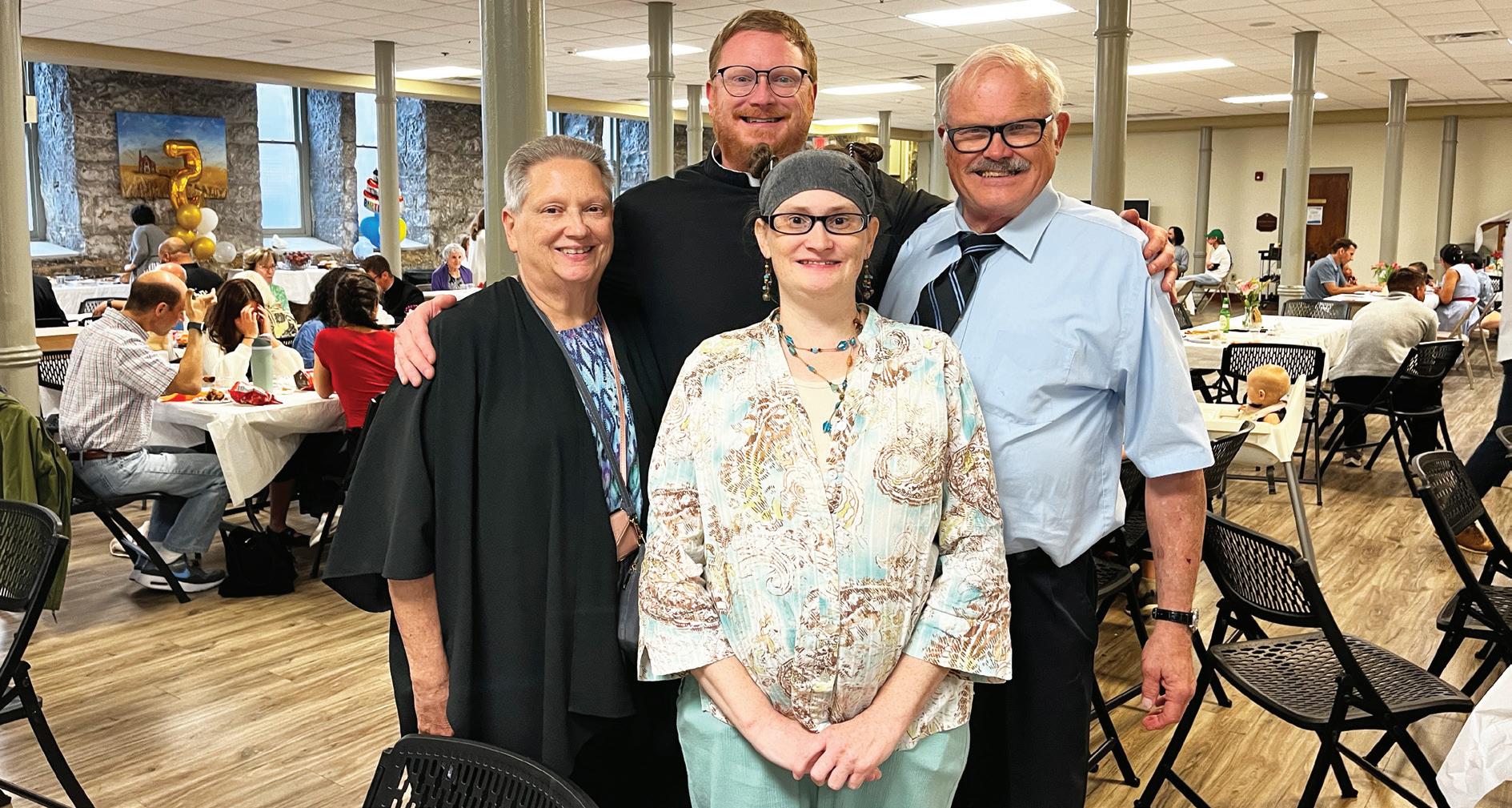
heading up the decorating.
“We consider it an honor to recognize our priests for their faithful service to the Church and a joy to celebrate with them,” she said.
“The fact that all three priests had milestone anniversaries in the same year and our visit -
of Newman Friends at Littlemore, where the saint was received as a Catholic in 1845 by Blessed Dominic Barberi, predicted the advent of a “major saint” in England would have a “big impact” on wider Church life.
“While sainthood is highly unusual, the proclamation of a doctor of the Church is very rare
ing seminarian had a birthday at the same time made it incredibly special! Luz Helena Loizeaux did a wonderful job with the decorations and the Knights of Columbus served delicious food. I believe it was a fun evening for the whole parish,” she added. ■
indeed,” Sister Mary-Birgit Dechant, vocations promoter for the Sisters Community of the Work Spiritual Family, said. “Newman was guided by a longing for the truth, which he found and encouraged others to find. After so many historical sufferings, I think this should offer England’s Catholics some consolation.” ■

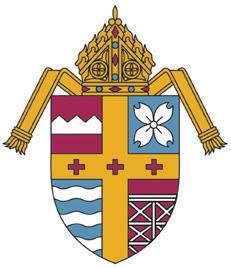

‘ Do not settle for less ’ God is waiting to transform your life, Pope Leo tells youth at Rome jubilee
By Carol Glatz Catholic News Service
The fullness of life depends on how much one joyfully welcomes and shares in life while also living with a constant yearning for those things that come only from God, Pope Leo XIV said in a message to young people.
“Aspire to great things, to holiness, wherever you are. Do not settle for less. You will then see the light of the Gospel growing every day in you and around you,” the pontiff said in his homily during Mass concluding the Jubilee of Youth on Aug. 3.
The outdoor Mass, held in Rome’s Tor Vergata neighborhood on the outskirts of the city, marked the culmination of a weeklong series of events for the Jubilee of Youth
More than 1 million people were estimated to be gathered across the 130 acres that had been prepared for the morning Mass, the prayer vigil the evening before, and for the hundreds of thousands of people sleeping overnight.
After touching down by helicopter less than 12 hours after leaving the evening vigil, the pope rode in the popemobile throughout the open areas dotted with tents and tarps, and filled with young people, cheering, waving their nation’s flag, and sometimes launching at him shirts and gifts.
“Good morning!” he said in six languages from the massive stage set up for the Mass.
“I hope you all rested a little bit,” he said in English. “We will shortly begin the greatest celebration that Christ left us: His very presence in the Eucharist.”
He said he hoped the concluding Mass would be “a truly memorable occasion for each and every one of us” because “when together, as Christ’s Church, we follow, we walk together, we live with Jesus Christ.”
In his homily during the Mass, the pope again highlighted the importance of the Eucharist, as “the
IC continued from page A4
being a reliable presence boosts spirits and brings hope. The volunteers who cook the food at church show up every month. The volunteers who lead bingo show up every month.
The volunteers who serve the meal, who sit and talk with residents, who clean up afterward, who donate items they show up.
And the residents show up every month. They make it all worth it. When asked, volunteers will say that they themselves are far more blessed to serve than those they are serving. Pope Francis said about the poor: “We are called to find Christ in them, to lend our voice to their causes, but also to be their friends, to listen to them, to speak for them, and to embrace the mysterious wisdom which God wishes to share with us through them” (Evangelii Gaudium, 198)
Stepping out of our comfortable indifference, becoming personally involved these things are hard to do! But once that first step, initiated by pokes and prods from the Holy
sacrament of the Lord’s total gift of himself to us.”
It is Christ, the Risen One, he said, “who transforms our lives and enlightens our affections, desires, and thoughts.”
“We are not made for a life where everything is taken for granted and static, but for an existence that is constantly renewed through the gift of self in love,” he said.
Much like a field of flowers, where each small, delicate stem may dry out, become bent and crushed, he said, each flower is “immediately replaced by others that sprout up after them, generously nourished and fertilized by the first ones as they decay on the ground. This is how the field survives: through constant regeneration.”
“This is why we continually aspire to something ‘more’ that no created reality can give us; we feel a deep and burning thirst that no drink in this world can satisfy,” he said. “Knowing this, let us not deceive our hearts by trying to satisfy them with cheap imitations!”
Pope Leo urged the young people to listen to that yearning and “turn this thirst into a step stool, like children who stand on tiptoe, in order to peer through the window of encounter with God,” who has been “waiting for us, knocking gently on the window of our soul.”
“It is truly beautiful, especially at a young age, to open wide your hearts, to allow Him to enter, and to set out on this adventure with Him towards eternity,” he said.
Speaking briefly in English, the pope said, “There is a burning question in our hearts, a need for truth that we cannot ignore, which leads us to ask ourselves: what is true happiness? What is the true meaning of life? What can free us from being trapped in meaninglessness, boredom, and mediocrity?”
“Buying, hoarding, and consuming are not enough,” he answered. The fullness of existence “has to do with what we joyfully welcome and share.” ■

Diocese of Knoxville seeking candidates for position of chief financial officer
The Diocese of Knoxville is seeking a mission-driven and highly experienced Chief Financial Officer (CFO) to lead the financial operations of the diocese. In accordance with canon law (Canon 494) this is a canonically appointed position with a five-year renewable term. This appointment is made following a one-year probationary period.
The CFO will serve as a strategic adviser to the bishop and oversee all financial functions of the diocese, including budgeting, financial planning, property management, and compliance. This role requires a leader of exceptional integrity, financial expertise, and a deep understanding of the Catholic Church’s structure and mission.
Among the qualifications required for this position are a bachelor ’s degree in accounting, finance, or business administration (master ’s degree preferred); a CPA or CMA certification; a minimum of 10 years of progressive financial leadership experience in a major organization or nonprofit experience; and a strong knowledge of Catholic Church operations, canon law, and diocesan finance.
This is a unique opportunity to serve the Catholic Church through stewardship and leadership. If you are a faithful, experienced financial professional with a heart for mission, we invite you to apply. Send cover letter and resume to Maura Lentz at mlentz@dioknox.org
Notice of nondiscriminatory policy as to students
The Diocese of Knoxville Catholic Schools admits students of any race, color, national and ethnic origin to all the rights, privileges, programs, and activities generally accorded or made available to students at the school.
Diocesan schools do not discriminate on the basis of race, color, or national and ethnic origin in administration of its educational policies, admissions policies, scholarship and loan programs, and athletic and other school-administered programs.
CCETN has new office in Johnson City
Catholic Charities of East Tennessee is celebrating the grand opening of its new location in Johnson City.
The relocated office is at 302 Wesley St., Suite 2. It replaces the previous Johnson City location at 1409 W. Market St., Suite 109.
Catholic Charities and its many ministries provide services to 36 counties in East Tennessee and have offices in Chattanooga, Knoxville, and Johnson City.
The ministries include adoption services, pregnancy help centers, a mobile ultrasound van for expectant mothers, shelters for children and vulnerable adults, disaster relief, Crazy Quilt Friendship Center, Hope Kitchen, and the Bridge Ministry.
Catholic Charities will host a grand-opening ceremony at the new location on Monday, Aug. 19, at 11 a.m. Hot dogs, hamburgers, and tours of the Wesley Street office will be provided.
Bishop issues letter supporting Scouting in diocese
Bishop Mark Beckman has issued a letter supporting Scouting in the Diocese of Knoxville.
In the letter, he affirms Scouting ’ s “enduring value in the formation of our young people, especially in Catholic parishes, schools, and communities. ”
The Diocese of Knoxville Catholic Committee on Scouting provides guidance and leadership in the spiritual phase of Scouting to all Catholic Scouts in the diocese.
In his letter, Bishop Beckman said, “For over a century, Scouting has provided a framework for youth to grow in character, leadership, responsibility, and service. Its emphasis on duty to God and country, reverence, and moral integrity resonates deeply with our Catholic values. Through Scouting, countless young men and women have encountered opportunities to develop virtue, strengthen their faith, and become leaders in their families, communities, and the Church.”
The next Picture of Love Retreat for Engaged Couples will be held Sept. 12-13 at Holy Spirit Church in Soddy-Daisy.
The new location is a change from where the retreat was originally scheduled to be held, which was at St. Stephen Church in Chattanooga.
The retreat will begin on Friday, Sept. 12 at 6:45 p.m. through 10 p.m. On Saturday, Sept. 13, the retreat will begin at 9 a.m. and continue through 6:30 p.m. Engaged couples are encouraged to attend the marriage-preparation program as part of marriage formation. ■
Spirit, is finally taken, the Lord will guide the next steps and the fruits will come. Let us not miss a chance to show up and embrace the wisdom God wishes to share with us through the poor. ■

Dana Ray Martin, DMD, MS, of Knoxville, passed away peacefully on the morning of July 17 at the age of 73. Born on April 5, 1952, in Fort Knox, Ky., Dr. Martin lived a life defined by devotion—to his faith, family, community, and patients.
Dr. Martin, who was a lifelong learner and leader in his field, earned his bachelor’s degree from the University of Kentucky and his doctor of dental medicine degree from the University School of Dental Medicine. He went on to receive both a master’s degree and a certificate in the specialty of orthodontics from the University of Pennsylvania and later pursued a law degree at the University of Louisville School of Law.
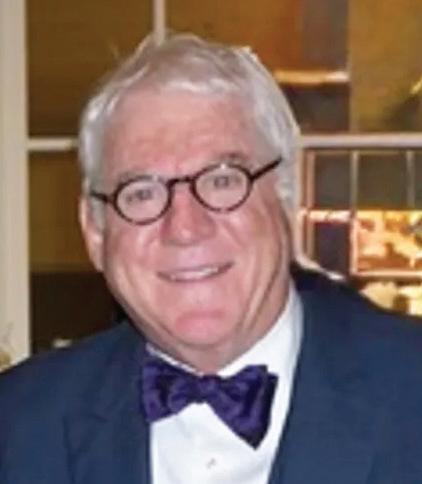
For over four decades, Dr. Martin practiced orthodontics with excellence and compassion, most notably as a sole practitioner in Knoxville for more than 30 years. He was a Diplomate of the American Board of Orthodontics and held membership and fellowship in numerous professional organizations, including the American Association of Orthodontists and the World Federation of Dental Sciences.
Dr. Martin was a man of deep Catholic faith, serving as an ecumenical minister and a devoted reader at the Cathedral of the Most Sacred Heart of Jesus. Faithfully seated in the front-right pew on Sundays, he worshiped with quiet reverence and unwavering love for his Lord.
As a Fourth Degree Knight of the Knights of Columbus, Dr. Martin embodied the principles of charity, unity, fraternity, and patriotism, finding joy and purpose in serving others.
Dr. Martin was married to the love of his life, Gina. His devoted love for his bride was immeasurable and eternal. She was his everything. He also was a devoted father to Russell (Amber), Katie (Wesley), and Luke (Elizabeth), and a beloved “Pops” to his grandchildren—Nathan, Sadie, Clark, Oliver, Mac, Charlie, and Cooper. “What was your favorite thing about Pops?” “When he would take me to church,” Mac would say.
Dr. Martin cherished moments spent with his family, whether fly fishing or traveling to sunny destinations, or his Knights of Columbus Bible study group of men he treasured dearly.
His life was a testament to faith, humility, and love. His light will continue to guide all who knew him, and his family will hold him in their hearts until they meet again in eternity.
Dr. Martin was preceded in death by his parents, Ruth Lilian Duncan Martin and John Carlile Martin; his brother, Dr. John Carlile Martin Jr.; and his niece, Laura Ashley Webb. He is survived by his sister, Sherian Louise Martin; his niece, Lisa Anne Webb; and a host of extended family and dear friends who will miss him profoundly.
A funeral Mass celebrating Dr. Martin’s life was held at the Cathedral of the Most Sacred Heart of Jesus in Knoxville on July 29. Donations in Dr. Martin’s memory may be made to the Cathedral of the Most Sacred Heart of Jesus at ww.shcathedral.org
Joan Lee Gorski
It is with deep sorrow and much love that we mourn the passing of Joan Lee Gorski (Schelly), who passed away on June 3 at the age of 79.
Mrs. Gorski was a devoted wife, mother, grandmother, sister, and friend. She lived a life full of grace, strength, and compassion. Her unwavering love and support shaped
the lives of everyone around her, and her wit and kindness left a lasting impression on all who knew her.
Faithful Departed
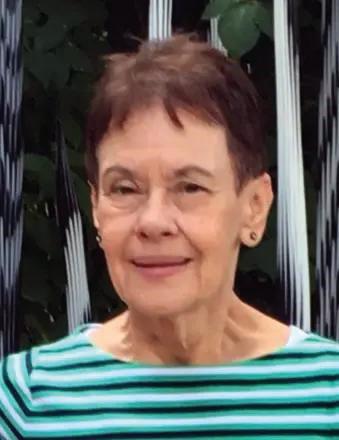
Mrs. Gorski was born in Colorado on July 15, 1945, and dedicated her life to her family and community. She was known for her hard work, devotion to her family, her boundless generosity, and her unshakable faith.
She is survived by her husband Joel Gorski, daughter Lisa Ward (Clint), and granddaughter Hannah Ward, who will carry on her legacy of love and resilience. She was preceded in death by her parents, Palmer and Virginia Schelly, and brother Jim Schelly.
A funeral Mass for Mrs. Gorski was held on June 13 at St. Thomas the Apostle Church in Lenoir City. Donations in Mrs. Gorski’s memory may be made to the Alzheimer ’ s Association, a cause dear to her heart.
Peggy Ann Sugden
Peggy Ann Sugden of Crossville passed away on May 31 at the age of 78. She was born on Dec. 3, 1946, in North Tonawanda, N.Y.
Ms. Sugden lived a life filled with love, compassion, and dedication to her family, friends, and the church community of St. Alphonsus, which she cherished.

Ms. Sugden was preceded in death by her loving parents, Ralph Walter Sugden and Rose Marie Sugden, as well as her dear sister and brother-in-law, Judy and Frank Pluff. She is survived by her devoted niece, Mary Pluff of Crossville, and her nephew, Thomas Pluff, and his wife, Becky, of Lancaster, N.Y. Ms. Sugden was also a cherished great-aunt to Zachary Pluff and Tyler Pluff.
She spent many years working in a factory and later contributing her compassionate heart and caring nature at Life Care of Crossville. Her work was a testament to her kind and selfless spirit, always eager to lend a helping hand.
Ms. Sugden had a profound love for animals, especially her beloved cats, Annie, and Andy, and her poodle, Emmylou. Her love for animals was matched only by her passion for caring for others and love of life
In her free time, she enjoyed the solace of a good book, the joyful rivalry of a card game, the adventure of cruising, and attending rodeo bull riding, NASCAR, and all major league sports. Also, she had the best neighbors in the world.
A memorial Mass for Ms. Sugden was held at St. Alphonsus Church on July 11. Following the Mass, she was inurned at the St. Francis of Assisi Church columbarium.
Ruth Lynn Prados
Ruth Lynn (Baird) Prados passed into eternal life peacefully at her Knoxville home surrounded by family.
She had celebrated her 95th birthday on March 7 and was able to participate in family vacations and activities until a severe decline in her health due to Parkinson’s in her final years.
She is survived by her husband, John Prados, who shared 73 wonderful years of marriage with her. She is also survived by her daughters: Elizabeth (Fred) Bowman, Laura, and Anne (Ashby) Lynch; granddaughter and husband Mary Beth Aguilar and Alfredo Aguilar; granddaughter and husband, Laura Lynch Mace and
Tim Mace, and granddaughter, Caroline Prados Burks; and great grandchildren, Virginia Mace, Selina Aguilar, Diego Aguilar, and Frankie Mace.
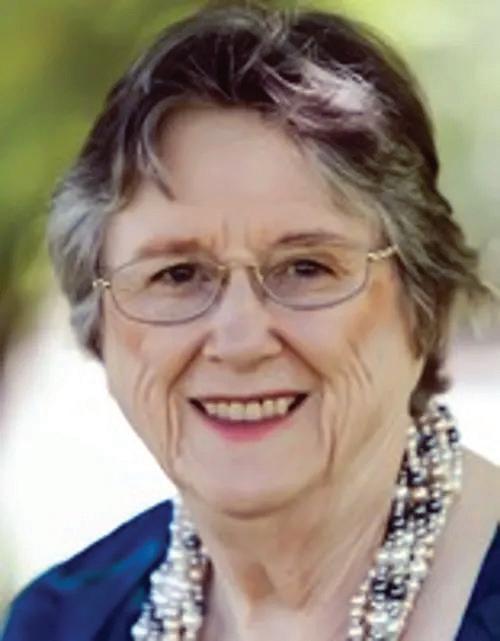
Mrs. Prados was always her children’s greatest advocate, including those she “adopted” along the way, and she is greatly missed.
Mrs. Prados was born in 1930 in a small, reputedly haunted, antebellum home on Woodson Ridge near Oxford, Miss. She relished sharing spooky tales with her children and grandchildren.
When she was 8, her family moved to a cotton farm near Marks, Miss. (yes, she could and did chop cotton). She became quite mechanically savvy, helping her father rebuild tractors and farm equipment as a young girl.
She had a delightfully mischievous sense of humor that endeared her to those around her to the very end of her life.
In 1948, she graduated from Marks High School after miraculously surviving being hit by a truck while exiting a school bus at age 17. After several months of convalescing, she completed her senior year as valedictorian and class president. She also was voted senior superlative for most expressive face, which was one of her most defining characteristics throughout her life.
After high school, she attended Jones County Junior College in Laurel, Miss., for a year, and then she attended the University of Mississippi and graduated with a degree in chemistry and an additional degree in biology.
She met John, a fellow student, at the school library and he was smitten at once and began courting her shortly afterward. They graduated in 1951 and married in Oxford at St. John Catholic Church.
She followed John to Biloxi, Miss., to Albuquerque, N.M., and Presque Isle, Maine, as he fulfilled his ROTC duty to the U.S. Air Force.
After his time in the Air Force, Dr. Prados did graduate studies at the University of Tennessee. Mrs. Prados trained and worked as a lab technician at St. Mary’s Hospital until the birth of their first daughter, Elizabeth, another miracle. Mrs. Prados had been told that after her accident, she would not be able to have children. Two more daughters followed as Dr. Prados finished his graduate studies and began working in the UT chemical engineering department.
Mrs. Prados was a stay-at-home mom for a time, immersed in the care of her daughters and sharing her many interests with them.
She completed the Famous Artists correspondence course, submitted artwork to the Dogwood Arts Festival, and took classes locally in pastel portraiture. She did portraits of her children and her mother, and even did a commission for a parish priest of his parents.
Mrs. Prados was an accomplished seamstress who made her own wedding dress and enjoyed making clothing for herself and her daughters. She taught them to sew as well. She was a Girl Scout leader and president of the school PTA, always involved in her children’s lives and activities and encouraging them in every way.
She came from a very musical family. Her mother had taught her to play the piano when she was a child, and she played mandolin in the family band. As an adult, she took up the guitar. She enjoyed singing and playing the guitar with the St. John XXIII University Parish music groups. She took classical guitar lessons for several years and loved to attend Steve Kaufman’s Acoustic Kamp in Maryville annually with her dear
friend, Ruth Smith. She and Dr. Prados even went on a bluegrass cruise that she enjoyed greatly. When her youngest daughter, Anne, was in elementary school, Mrs. Prados obtained her certification as a medical technologist. She worked outside the home until family once again called for her full attention. She cared for her first grandchild, Mary Beth, while her parents worked. Eventually, her father, after her mother’s death, and her in-laws came to live in her and John’s home. She managed medications, doctor’s appointments, dietary restrictions, and the home, all while taking care of a young child. Wonder woman!
We are astounded at how she somehow did it all, filling each day with love and compassion.
After, taking care of their elderly parents until their passing, she was faced with the difficult challenge of breast cancer. With her usual bravery and perseverance, she overcame the disease and the treatments, surviving to enjoy many more years of life with her family.
After recovery, she had time to travel with Dr. Prados, who was still working at UT as an administrator..
A funeral Mass was held at St. John XXIII on June 29, with a reception following. A burial service was held at Berry Highland Memorial Cemetery on June 30. Donations in Mrs. Prados’ memory may be made to the Parkinson’s Foundation or the Young-Williams Animal Center in Knoxville.
Dr. Charles H. Edwards Jr.
Dr. Charles Henry Edwards Jr., age 87, of Alcoa, passed away at his home on July 19.
Dr. Edwards was born on Sept. 27, 1937, and was married for 67 years to Alice Edwards. He was the father to Paul, Joan, John, and Tom; and he was grandfather to Kate, Clare, and David.
Dr. Edwards was a University of Georgia math professor emeritus who taught at Georgia from 1963-99.
He earned his Ph.D. in 1960 from the University of TennesseeKnoxville and received the Honoratus Medal for sustained excellence in teaching in 1983.
He received the Josiah Meigs Award in 1991 for high achievement in teaching. And he earned the Georgia Regents Award for faculty teaching at a research university.
He was a Sloan Fellow at the Institute for Advanced Study and also was a Fellow of the American Mathematical Society for outstanding contributions to the creation, exposition, advancement, communication, and utilization of mathematics.
He also authored 16 volumes covering 154 editions.
Following his teaching tenure, Dr. Edwards maintained a website offering updates, photos, and other resources for the Latin Mass community in the Diocese of Knoxville. In doing so, Dr. Edwards served as a resource to assist Diocese of Knoxville priests who celebrated Mass in the extraordinary form of the Roman rite.
A funeral Mass for Dr. Edwards was celebrated on July 24 at Holy Ghost Church in Knoxville. Father John Orr, pastor of Holy Ghost, served as the celebrant.
A burial service followed at Calvary Cemetery located in Knoxville.
Masses and prayers for Dr. Henry’s eternal repose were also celebrated and prayed in Germany, Chattanooga, and Johnson City, where Dr. Edward’s tireless work on behalf of the Latin Mass was recognized.
Donations in Dr. Edwards’ memory may be made to the COPD Foundation ( www.copd foundation.org ) or to the Arthritis Foundation ( www.arthritis.org ).
Michael Manning Langley
Michael “Mike” Manning Langley, 87, of Mascot, went home to be with his Heavenly Father on June 10 while surrounded by his loving family.
Born to M.J. and Catherine Leahy Langley, Mr. Langley lived most of his life in the small mining community of Mascot.

He was a godly man and a lifelong member of Immaculate Conception Parish in Knoxville.
Mr. Langley was a 1956 graduate of Carter High School and a U.S. Marine Corps veteran. In 1960, he graduated from St. Bernard College in Cullman, Ala., and in 1981 he earned his master’s degree from the University of Tennessee.
In 1963, Mr. Langley married Nancy Turner and they were blessed with three precious children. In 1974, Mr. and Mrs. Langley moved their family back to his childhood community of Mascot, where they and their children farmed and continued to live the remainder of their years together.
Mr. Langley began his career in the personnel department of the old American Zinc Co. In the 1960s, he was hired by St. Mary’s Hospital in Knoxville as manager of the personnel department.
In the early 1980s, Mr. Langley returned to the zinc-mining industry to serve as human resources manager for the Tennessee Mines Division of ASARCO, and he remained there until his retirement in 2001.
His wisdom to bring a resolve to issues was esteemed by his superiors, and he was trustworthy to all. He always endeavored to do what was fair and good for all who were involved. The legacy of his kind spirit will be remembered by all who knew him.
Mr. Langley served on the board of directors for the First Choice Credit Union (former American Zinc Employees Credit Union). He was an avid Tennessee football and basketball fan, and attended both the men’s and women’s games as long as he was able to do so. He also served on the board of directors for the Barbara Abernathy House for Seniors, helping to maintain and preserve a meeting place for the seniors and residents of Mascot to gather. He was preceded in death by his parents, M.J. and Catherine C. Leahy Langley; a daughter-in-law, Lisa Langley; his aunts, Agnes “Tag” (B.T.) Hughes and Frances (Lawrence) Simcox; uncle, Michael (Biddy) Leahy; sister-in-law, Carole Grogan; and brother-in-law, Alan Turner.
Mr. Langley will be missed greatly by his loving wife of almost 62 years, Nancy Turner Langley; children, Michelle Wilson, Michael J. (Gina) Langley, and Shawn Langley; grandchildren, Dustin Wilson, Trace (Meghan) Langley, Haley Langley, and Emily Langley; great-grandchildren, Hank and Jax Langley; brother, John (Charlotte) Langley; and brother-in-law, Robert (Marilyn) Turner.
A rosary for Mr. Langley was prayed at Bridges Funeral Home on June 27. Family and friends gathered on June 28 at Eastview Memorial Gardens for a burial service, with Father Tim Sullivan, CSP, presiding. Military honors were provided. Donations in Mr. Langley’s memory may be made to the Ladies of Charity, 120 W. Baxter Ave., Knoxville, TN 37917.
Mary Susan Haverly
Mary Susan Haverly (Elder), age 84, passed away peacefully on June 24 in Woodstock, Ga.
Mrs. Haverly was born on Dec. 8, 1940, and was affectionately known as Sue. She was a devoted wife, mother, grandmother, great-grandmother, and friend. She graduated from Knoxville Catholic High School
and went on to earn a bachelor ’ s degree in psychology and a master ’ s in social work from the University of Tennessee.
Faithful Departed

She began her professional journey at Peninsula Hospital, where she served as director of family therapy and counseling. Her passion for helping others led her to establish a successful private practice in therapy and counseling, where she touched many lives with her compassion and expertise.
Mrs. Haverly was a dedicated member of All Saints Parish and found joy in nurturing both her faith and her garden. As a master gardener, she spent countless hours cultivating beauty around her. She also loved baking cookies for her grandchildren, creating sweet memories that will be cherished for generations.
Mrs. Haverly was preceded in death by her beloved husband, Elmer Hines Haverly; her parents, Paul Elder and Sara Francis Lavin Elder; her sister, Judy McCain and brotherin-law Hunter McCain; brother-inlaw, William McDonald; and son-inlaw, Brad Bosworth.
She is lovingly remembered by her daughters: Mary Cooke (Christopher), Patricia Bosworth, Joni Dunn (Jeff), and Susan Seagle (Jeff); grandchildren: Noah and Mitchell Cooke, Riley and Hunter Bosworth, David Dunn (Bailey), Christopher Dunn, Sarah Grace Hennessey (Jordan), Abby Dunn, Mac Seagle (Kayla), and Keller Seagle; great-grandchildren: Elijah and Isaac Dunn, and Noah Hennessey; and sisters: Sarah Clem (Gordon) and Barbara McDonald.
A funeral Mass for Mrs. Haverly was celebrated at All Saints Church. Donations in her memory may be made to the Pat Summitt Foundation at patsummitt.org/
Dr. Helen Vodopick-Goswitz
On July 8, the Almighty Father sent His Son, the Lord Jesus Christ, to personally escort heaven’s newest angel and saint, Dr. Helen VodopickGoswitz, through the pearly gates. It is with profound sadness that we mourn the loss of one of the greatest trailblazing women of our time, who passed away at the age of 94.
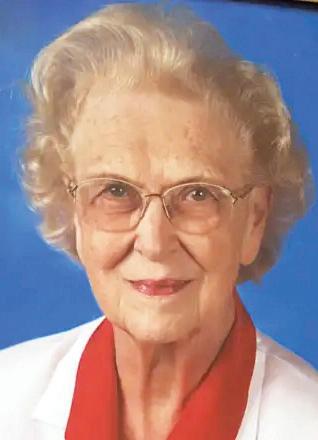
Born on April 29, 1931, in Milwaukee, Dr. VodopickGoswitz was raised by her Croatian immigrant parents. She attended Marquette University and later applied to Marquette Medical School (now the Medical College of Wisconsin), where she was initially waitlisted. By a stroke of fortune, the day before the first year was to begin, one of the incoming freshmen decided to attend another medical school, leaving an opening to be filled. The medicalschool dean asked his assistant who should get the spot, and the assistant called Dr. Vodopick-Goswitz immediately. Thus, she was one of only three women in the entire medicalschool class of 1956.
During her medical school years, Dr. Vodopick-Goswitz met the love of her life, Francis Goswitz, through a mutual acquaintance, Dr. Owen Chang, at a picnic. From that point forward, the two formed a personal and professional partnership to last their lifetimes.
They married in the Catholic Church on June 2, 1956, the day before they graduated from medical school. From there, they moved to Iowa City, Iowa, where they completed their internships and residencies at the University of Iowa hospitals. There were few opportunities for female physicians in the early 1960s, but her creed to never give up
hope and always stay positive carried her on throughout life, and in helping her future patients.
In 1965, Oak Ridge Associated Universities (ORAU) medical division offered a job to her husband, but he insisted the only way he would accept would be if they also offered a job to his wife. ORAU acquiesced and offered a job at a lower salary than the other male staff physicians.
Through her eloquence with words combined with medical expertise, she successfully applied for a grant her first year and was rewarded with a significant boost in salary and additional responsibilities at ORAU. In 1974, when the government closed ORAU’s medical division, Dr. Vodopick-Goswitz and Dr. Goswitz faced a choice: pursue government jobs elsewhere or establish a private practice. Fortunately for Oak Ridge, they founded the Oak Ridge Medical Clinic (ORMC), which served thousands of patients until its closure in 2017.
During the 1970s and early 1980s, Dr. Vodopick-Goswitz, alongside Dr. Liselotte Sigmar and Dr. Elaine Bunick, was one of only three female physicians at Oak Ridge Hospital, paving the way for future generations of women in medicine.
A highlight of Dr. Vodopick-Goswitz’s career was her interview with Lesley Stahl on “60 Minutes,” where she defended her pioneering work with radiation treatments for NASA. She also testified successfully before a Senate committee led by then-Sen. Al Gore.
Her dedication earned her the honor of having a fourth-floor wing named after her at Oak Ridge Methodist Medical Center, a testament to the mutual respect she shared with countless hospital staff.
Beyond her professional achievements, Dr. Vodopick-Goswitz will be remembered as a devoted wife to Dr. Goswitz and a loving mother to her three children: Dr. Mary Dervay (Joseph), Frank (Jennifer), and Greg.
Despite a demanding schedule, working five and a half days a week, she prepared homemade meals and chauffeured her children to piano lessons and sports practices. She found joy in cooking, gardening, birdwatching, and outsmarting squirrels.
Dr. Vodopick-Goswitz is survived by her brother, Tom Vodopick (Sharon) of Phoenix; her eight grandchildren, Gretchen (Davis), Jessica (Brett), Patrick, Casey, Alexander, Ryan (Isabel), Maximillian, and Courtney; and her five greatgrandchildren, Fitzgerald, Callahan, Cordelia, Scottie, and Merritt.
She was cherished by numerous relatives, friends, and patients. She relished seeing former patients, knowing that for many she helped extend their lives through her compassionate care.
Donations in Dr. Vodopick-Goswitz’s memory may be made to St. Mary Parish in Oak Ridge in support of the school to which she was deeply devoted.
A rosary for Dr. Vodopick-Goswitz was prayed on Aug. 1 at Weatherford Mortuary in Oak Ridge. A funeral Mass for her was celebrated on Aug. 2 at St. Mary Church.
Marilyn Joyce Sherrill
Marilyn Sherrill, age 86, of Crab Orchard, died peacefully at home on July 23.
Born in Minneapolis to Arthur Stanley Kurtz and Leocadia Seraphia Mallack Kurtz, a young Mrs. Sherrill loved catching lake critters with her father, being athletic, being part of the Catholic faith, reading geographical and cultural narratives, and painting.
She attended Incarnate Catholic School in Minneapolis and graduated from Park Rapids High School in 1957 before joining the U.S. Air Force, where she ultimately served as a combat radar reader and, importantly, met and married her life mate, Edgar Leland Sherrill Jr., whom she knew as Joe (then Jody).
Mrs. Sherrill was preceded in death by her husband, father, mother, and brothers Roger and Danny

Kurtz, sisters Bea Hartman (George) and Linda Fodstad (John), and is survived by her children, Dr. John (Beth) Sherrill, Joseph (LeeAnn) Sherrill, Ann Sherrill Morphew, and Teresa (Jerry) Duncan, and her sister, Elaine Kurtz Palbicki, sister-in-law, Dee Dee Kurtz, and brother-in-law, Charles Pepper Hild, along with 13 grandchildren, 22 great-grandchildren, and numerous beloved nieces and nephews.
A funeral Mass for Mrs. Sherrill was held on Aug. 9 (the date of Marilyn and Jody’s wedding anniversary) at St. Alphonsus Church in Crossville. Following the funeral Mass, a burial service was held at Haley’s Grove Cemetery in Crab Orchard.
Mrs. Sherrill supported many beloved causes. Donations in her memory may be made to her and her husband’s Roane State Community College student scholarship, the Edgar L. (Jody) Sherrill and Marilyn Sherrill Scholarship Endowment, or to a favorite nonprofit organization.
Dorothy Berry
Dorothy Elizabeth Byrd Berry, known to many as Dottie or “Dot Dot,” passed away on July 10 after a battle with pancreatic cancer. Mrs. Berry was preceded in death by her husband of over 60 years, Kenneth L. Berry, parents Bill and LaVada Byrd, brother Bobby Byrd, in-laws C.K. and Madge Berry, and brother-inlaw Charles Berry. She is survived by two sons, Michael Berry (Audrey) and Tony Berry (Karla); grandchildren, Chelsea and Brennan Berry, Anthony Berry (Shelby), and Alex Cash (Ben); great-grandchildren, Sawyer and Mateson Berry and Maddux Cash; brother William Byrd (Susan); and beloved dog, Millie.

Mrs. Berry was born on Aug. 15, 1942, and raised in Chattanooga. She moved to Maryville to attend Maryville College, where she met her husband and many lifelong friends.
Mrs. Berry and her husband owned a local restaurant and she later worked as a manager and area supervisor for Krystal hamburgers for more than 30 years. She had a magnetic personality that was gracious and welcoming to all. She was a “social hummingbird” who loved engaging with all people. It fueled her soul. Her positive energy and bright smile were known by anyone she encountered through work, church, or her daily adventures. Her love of travel was evident throughout her life as she traveled with family and friends, always meeting new people along her path. She was considered a great friend to everyone she knew and encountered. She was quickly known and loved by the nurses, doctors, and fellow patients she encountered these last few months as “Dot Dot.”
Most importantly was her lifelong, wholehearted love for her family. Her legacy of love for all, her infectious smile, and her encouraging spirit will never fade.
A funeral Mass for Mrs. Berry was held on July 19 at Our Lady of Fatima Church in Alcoa, with Father Peter Iorio, pastor of Our Lady of Fatima, serving as the celebrant and Father Renzo Alvarado Suarez, Our Lady of Fatima associate pastor, concelebrating the Mass. Donations in Mrs. Berry’s memory may be made to St. Jude Children’s Research Hospital. ■
tunity to reconnect with many people he ministered to in the Diocese of Knoxville. While a priest of the Knoxville Diocese, Father O’Neill served as an associate pastor at Holy Ghost Parish and St. Jude Parish in Chattanooga, and as interim administrator of St. Francis of Assisi Parish in Townsend, Our Lady of Fatima Parish in Alcoa, and St. Francis of Assisi Parish in Fairfield Glade
“Gratitude to Holy Ghost Parish and to the Diocese of Knoxville for four extraordinary months of healing and preparation,” Father O’Neill said, noting that among those he reconnected with was Lucina Diego, who is now 30 and has known Father O’Neill since she was a child receiving her first Holy Communion. Mrs. Diego introduced Father O’Neill to her young children
Father O’Neill continues to feel a strong connection to his former Diocese of Nashville parishioners and reflected that he served the three parishes for just under seven years, and he was ready to serve there for at least another five years.
“I’m very grateful to the parishioners of Hohenwald, Centerville, and Waynesboro because my departure from there was more sudden than expected. First, we thought it was sick leave. Then it was sick-leave-cum-retirement. I’m incredibly grateful to them for all their care,” he said.
Father O’Neill shared that his letter of appointment from the Diocese of Nashville to Conception Seminary is for three years. And at Conception, he is serving in the Diocese of Kansas City-St. Joseph in Missouri, which is led by Bishop James V. Johnston Jr., a former Diocese of Knoxville priest and chancellor.
Father O’Neill recalled that he and then-Father Johnston were serving at Our Lady of Fatima Parish in Alcoa when Father Johnston was named bishop of Springfield-Cape Girardeau in Missouri in 2008. At Conception, Father O’Neill will be reunited with Father Xavier Nacke, OSB, who serves as spiritual director at Conception. Father Nacke was Father O’Neill’s spiritual director when Father O’Neill was there in seminary.
“I have kept in touch with the monks almost continuously since I left there in 1995. It’s good to go back after 30 years,” he said. “We are still in touch, and he’s to be my guide as spiritual director now.”
Father O’Neill still carries fond memories of the


Mass and reception marking the 25th anniversary of his priesthood.
“It was an amazing day. Once again, what would I have done without the parents of Overbrook and St. Cecilia schools. The Diocese of Nashville put on a huge day for me,” Father O’Neill said.
The main celebrant at the ordination anniversary Mass was Bishop Johnston. Concelebrants included Father Nacke and priests of the dioceses of Nashville and Knoxville. The Mass was celebrated at the Cathedral of the Incarnation in Nashville. Altar servers at the Mass included youth from the three parishes where Father O’Neill was pastor. Domini-

can Sisters from St. Cecilia made up the choir.
Father O’Neill’s gratitude to his former parishioners and the people of the Diocese of Nashville is apparent because they have played such a pivotal role in his formation as a diocesan priest. He cited the Legion of Mary at Overbrook School, where he met and grew to know many parents because they visited nursing homes each week.
“Some incredible friendships were formed through that,” he said, noting that he served nine and a half years as chaplain on the campus of Overbrook School, St. Cecilia Academy, and Aquinas College, including the years before he was incardinated into the Diocese of Nashville.
Father O’Neill pointed out similarities in his priestly role at Conception to that of his role at Overbrook, St. Cecilia, and Aquinas.
“It links into staying in the monastery and working in the seminary because the best part of my life there was praying for the Sisters in the early part of the morning and going back for rosary and for evening prayer every night. That was a huge part of my life: the liturgy with the Sisters every day,” Father O’Neill said.
Father O’Neill also is blessed by his family in Ireland and the United Kingdom, including brothers James, Malachi, Dominic, Desmond, Joseph, Damian, and sister Martha. A second sister, Maoliosa, has passed away, as have his parents, Jimmy and Martha O’Neill.
“I am grateful to them. And I’ve been praying to them a lot,” Father O’Neill said about his parents.
Father O’Neill is most grateful to God, His Son, and the Blessed Mother for their blessings, guidance, and comfort during this time of transition in his priesthood. And now, the Tennessee priest who will be lending his Irish brogue, his devotion to the rosary, and his love for the Legion of Mary to the Northern Plains is back to where it all began: Conception Seminary.
“The parishioners of St. Cecilia in Waynesboro, Holy Trinity Parish in Hohenwald, Christ the Redeemer in Centerville, and Holy Ghost in Knoxville—their kindness I will never forget because I was so ill I could not visualize ever working a regular life. They saw a future I did not see because I was so sick, but they said, ‘No, this is God’s plan. It will all pass,’” he said ■
